KASELEHLIE PRESS
PO Box 2222 Kolonia, Pohnpei, FM 96941


PO Box 2222 Kolonia, Pohnpei, FM 96941

By Bill Jaynes The Kaselehlie Press
October 3, 2024
Pohnpei—Due to the initiatives of Catholic Relief Services (CRS) and an approximate $250,000 grant from USAID, Pohnpei has taken its first real step toward resolving its serious plastic disposal problem under the project name “CREATE.”
Currently, plastics of all types are dumped at Pohnpei’s landfill indiscriminately with other household garbage—that is, if they make it to the landfill at all. All too often, they don’t and instead end up in the mangroves, where they can linger for hundreds of years, float out to the ocean, or accumulate wherever they fall on land.
The celebration of a new plastics recycling program took place on the afternoon of September 27 at the containerized shop behind Pohnpei’s can collection and recycling center. The machinery is now in place, and training has been conducted to grind usable plastics and melt them into reusable forms.
CRS is still in the process of developing its collection center, which will be housed in a container on the CRS property adjacent to Our Lady of Mercy Catholic High School, but the facility is nearly complete. Meanwhile, CRS, the Pohnpei Environmental Protection Agency, and Kolonia Town government are working with elementary schools to not only encourage students to recycle plastics but also to actively participate in doing so. They have already set up bins at several schools for students to
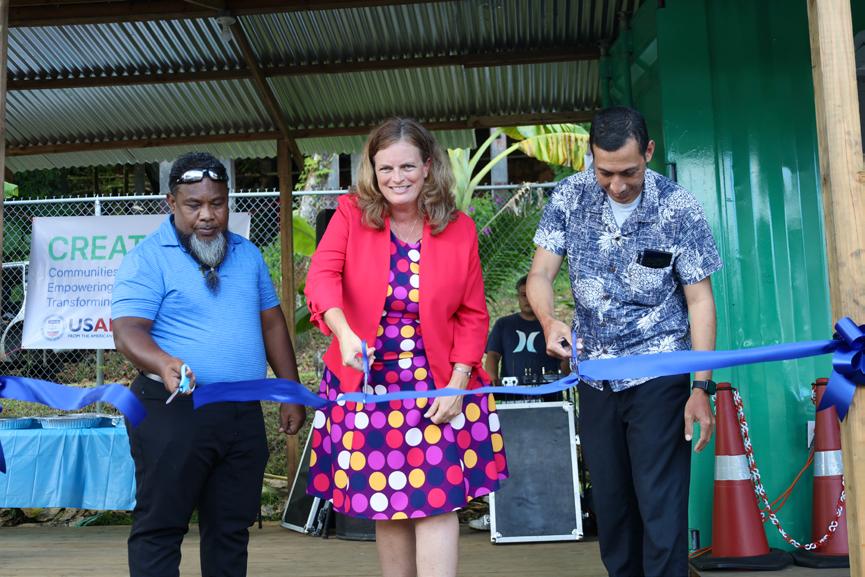
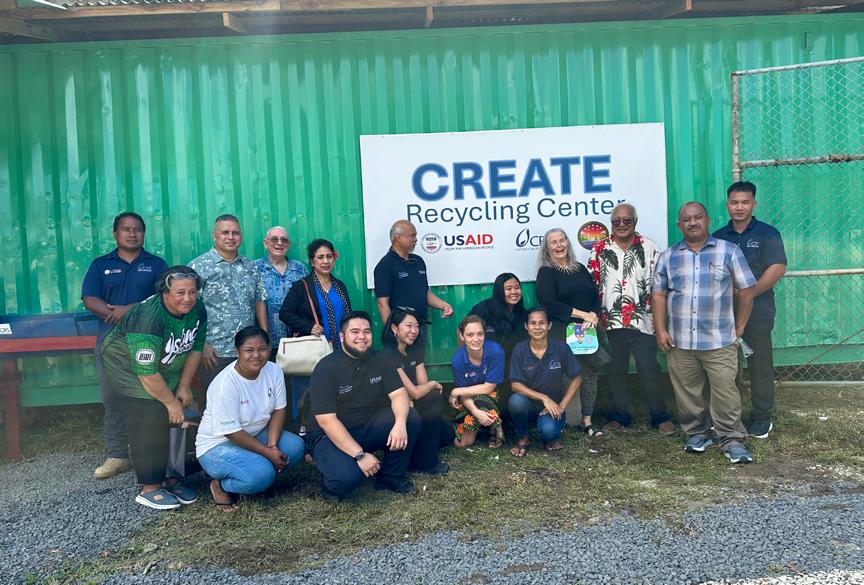
bring in plastics that would otherwise be discarded in environmentally harmful ways.
Collection will be entirely voluntary, meaning that the cooperating entities will need to dedicate significant
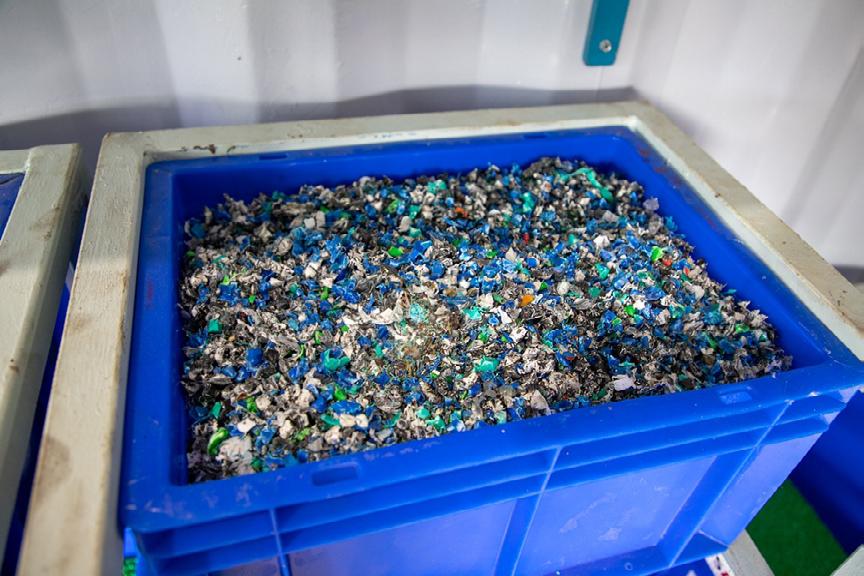
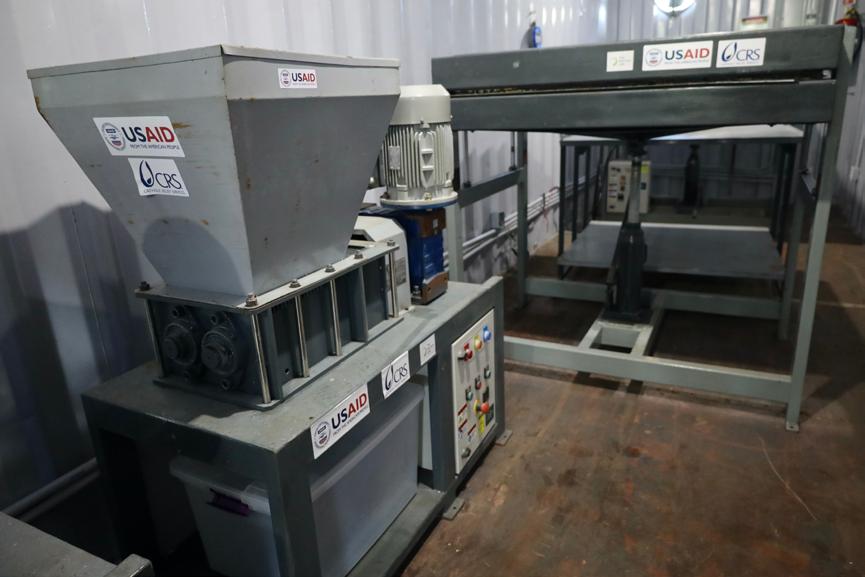
effort to promoting plastic recycling and educating the public on its importance. The local community will need to take part by bringing plastics of all types
By Bill Jaynes The Kaselehlie Press
October 8, 2024
Pohnpei—Well over a year ago, Craig Reffner received written notice from a Western Union outlet in Hawaii that the $1,700 sent to him would be available for collection on April 4, 2023. On that day, he went to three Western Union outlets in Pohnpei to collect the money. However, for various reasons, Western Union "failed" to pay out the money owed to him, as he claims often happens to others in Pohnpei. He was able to collect the money late in the afternoon of April 5, 2023.
These circumstances led to the filing of civil action 2023-003 against the Western Union corporate entity, Consolidated Transportation Services, Incorporated (CTSI), and Apdin Peter doing business as Ray and Dors, with Reffner as the plaintiff represented by Marstella Jack. Reffner’s causes of action are breach of contract, conversion, and violation of the FSM Consumer Protection Act.
An attorney in Fiji is representing the Western Union parent corporation. One attorney, Debra Ann Mori Retuyan, is representing CTSI and Apdin Peter, although
Jack’s attorney filed a motion to disqualify her from representing either of those clients due to an alleged conflict of interest between the two defendants. A hearing on that motion took place on the 17th of this month, heard by Associate Supreme Court Justice Larry Wentworth. At press time, the Court had not yet rendered a decision on that motion.
Reffner’s filing claims that neither CTSI nor the Western Union outlet had cash to pay out the money they owed him. The defendants say the reason is that the Bank of Guam did not have sufficient cash on hand to give them the money required for payment. Both local defendants provided the same defense
in their responses. However, Reffner claims that Ray and Dors did have the cash, not from the bank but from their business operations. He claimed Ray and Dors told him they could pay him, but he would have to spend 15 percent of his $1,700 payment at their business before they would give it to him.
Reffner claims that Peter's requirement violates his contract with CTSI as a subcontracted Western Union outlet. That contract specifically prohibits outlets from charging fees to customers receiving cash

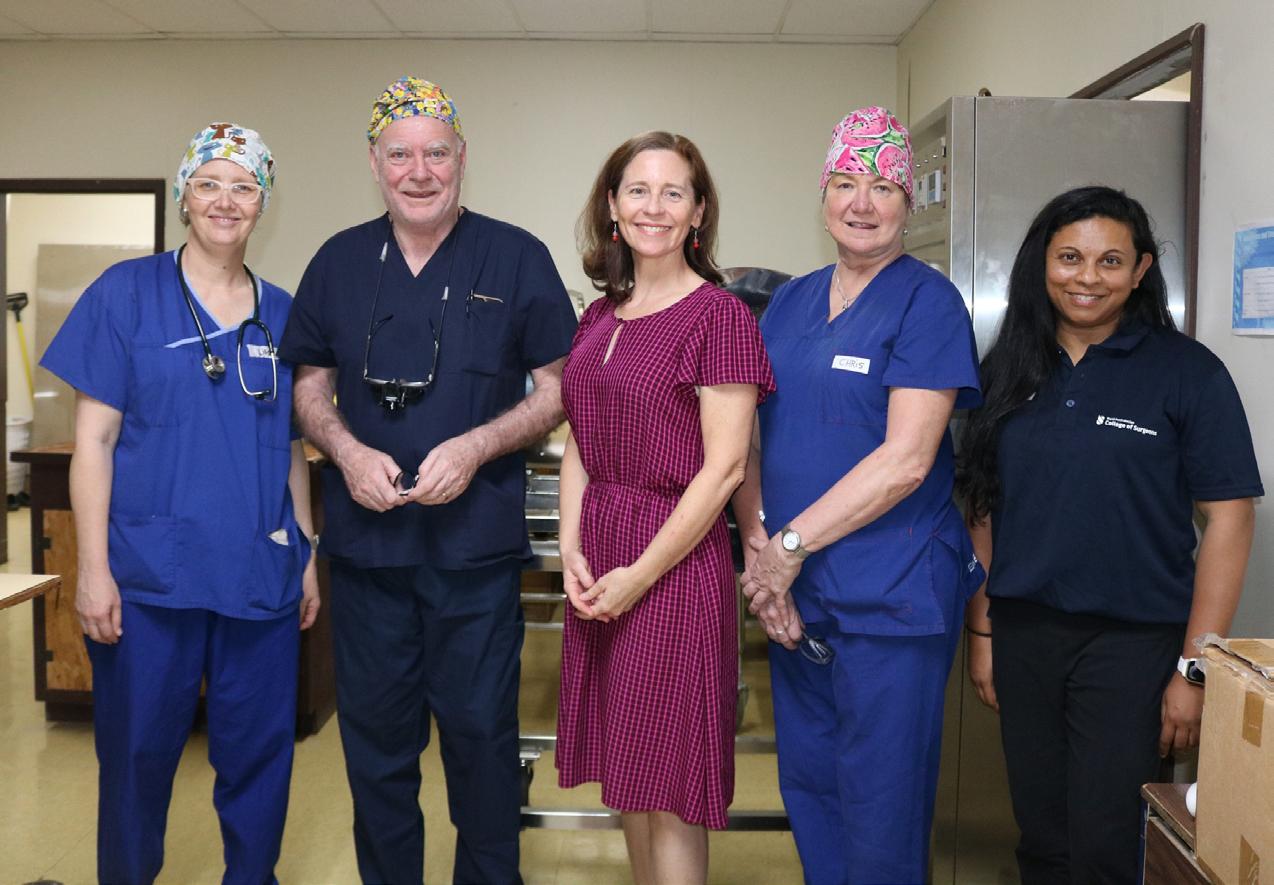

October 2, 2024
Pohnpei— Ambassador Grant-Curnow had a great visit to Pohnpei State Hospital, where she met the Royal Australian College of Surgeons’ Ear, Nose and Throat (ENT) surgical team. The team is working with Pohnpei State doctors to provide pre-surgical consultations, ENT surgery, and training of local healthcare professionals.
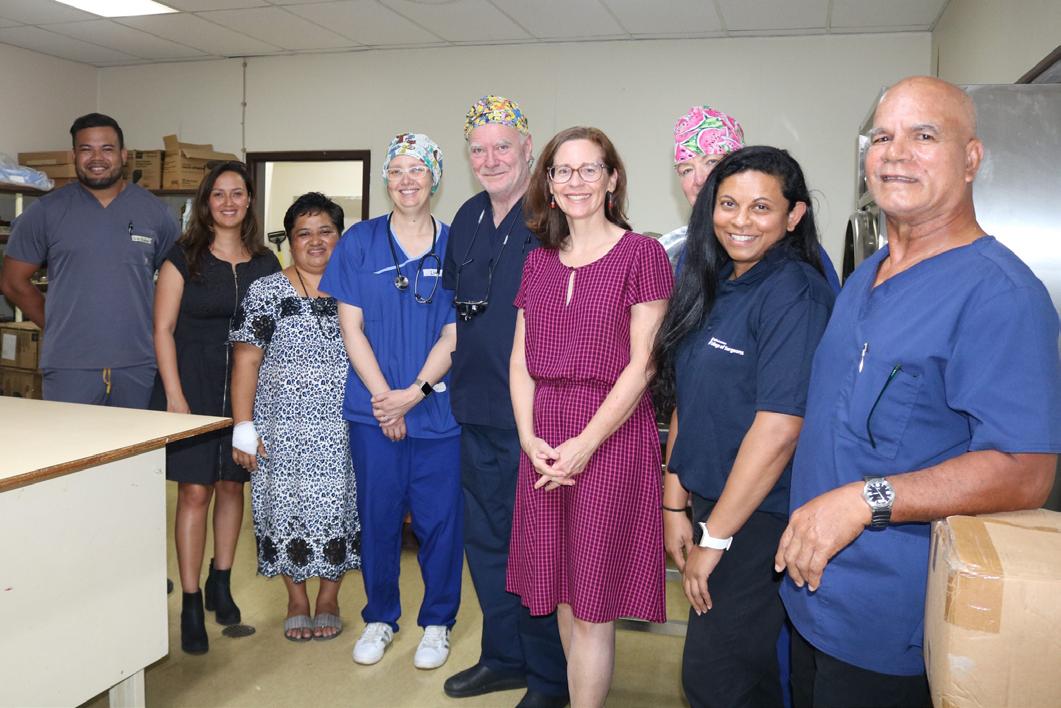
Greeted by Chief Surgeon Dr. Johnson Hedson and Chief of Medical Services Dr. Rakei Kaarira and the Acting Director Dr. Marcelle Gallen, the Ambassador listened to the incredible impact of the Australia-funded Pacific Clinical Services and Health Workforce Improvement Program (PCSHWIP).
A very big thank you to the skillful ENT team of Associate Professor Bernard Whitfield (ENT Surgeon/Team Leader), Dr Lisa Dayman (Anaesthetist), Chris Hunter (Theatre Nurse) and Shivanthe Leanage (Audiologist) for volunteering to run this ENT mission to FSM.
This initiative, in collaboration with Pacific Ministries of Health, is building clinical capacity and enhancing healthcare services across 10 Pacific Island countries. The team will also be visiting Chuuk State Hospital for clinical work later in November.



By Bill Jaynes The Kaselehlie Press
September 25, 2024
Pohnpei—The Technical and Compliance Committee (TCC) of the Western and Central Pacific Fisheries Commission began its annual work session in Pohnpei with an opening ceremony at the College of Micronesia-FSM gymnasium. Last year was the first time committee members, consisting of scientists and supporting agencies, had met in several years due to the global outbreak of COVID-19.
The group is notoriously hardworking, sometimes continuing until the early hours of the morning. This working meeting, with its extremely full agenda, promised to be no different.
“The TCC plays a vital role in ensuring the sustainable management of tuna stocks in the Western and Central Pacific Ocean,” said Jorg Anson of Pohnpei’s Office of Fisheries and Aquaculture in his welcome remarks. “By reviewing, evaluating, and developing the appropriate rules for fishing, you are helping to safeguard our shared marine resources for future generations and supporting the Commission's efforts to promote compliance and sustainable fisheries management. We believe this meeting provides an excellent opportunity to strengthen cooperation, share knowledge, and develop effective solutions to the challenges facing our region.”
“TCC plays an important role in ensuring that the conservation management measures adopted by the Commission are adhered to,” said WCPFC Chair Josie Tamate. “Your work is important, and it continues to ensure that the key species under our Commission mandate remain in the green.”
“There are a lot of voices on the outside calling for transparency and saying that we're working in secret,” she said, referencing complaints publicized last year. “I pay attention to them, but only if they're credible and in good faith. On that note, I’d like to recognize and acknowledge with appreciation the ongoing contributions provided by the approved observers of the Commission.”
She also noted that the work of subsidiary bodies to the Commission is vital, and sometimes their advice isn’t addressed during meetings due to time constraints. With that in mind, she said she had worked with WCPFC Executive Director Rhea
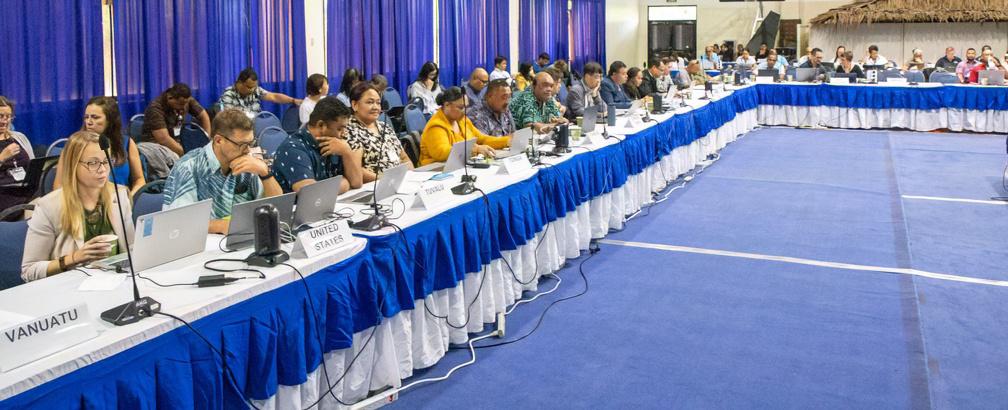
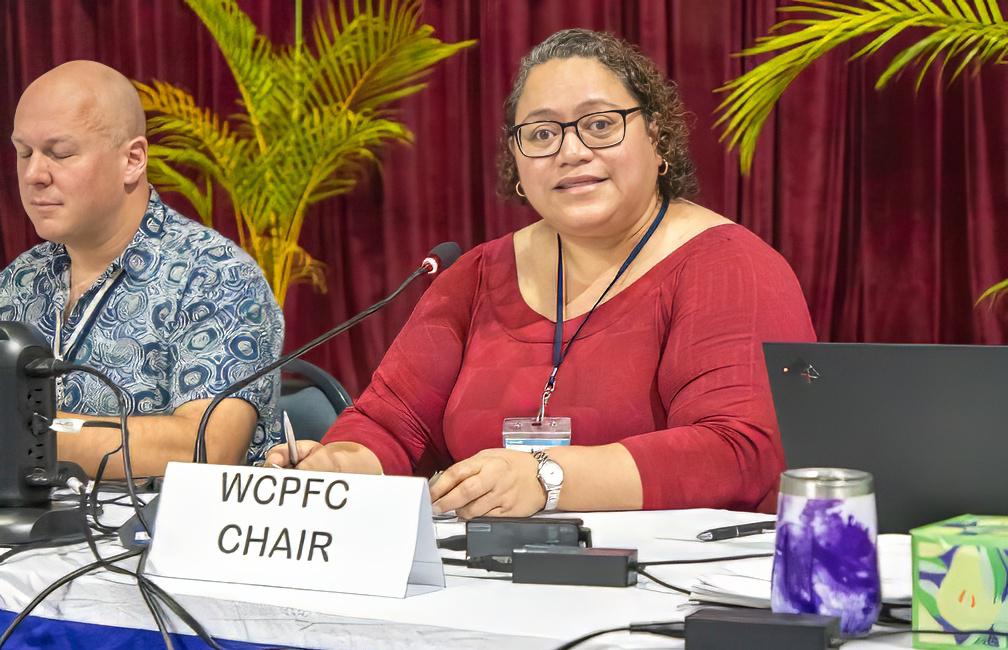
Moss-Christian to ensure that doesn’t happen during TCC 20.
Moss-Christian was the next to speak. “Our region faces a range of challenges, from the impacts of climate change on migratory patterns to the growing need for enhanced monitoring, control, and surveillance,” she said. “At the heart of these efforts lies the commitment to ensuring compliance with the conservation and management measures we have collectively agreed upon. Beyond the challenges within our region, we are increasingly aware of the growing pressures on fisheries management from broader global ocean activities. Illegal, unreported, and unregulated fishing, the expansion of maritime industries, and the exploitation of marine resources are all placing unprecedented strain on ecosystems. These pressures complicate our efforts to maintain healthy fish stocks and demand that we adopt innovative approaches to governance, compliance, and sustainability.
“Colleagues, this 20th session provides us with the opportunity to reaffirm our shared goals. The themes of transparency and accountability in fisheries management are at the core of what we do. We have made significant strides, but there is still much to be done. Our ability to adapt and innovate is key to ensuring that future generations inherit a fishery that remains productive and resilient,” she said.
TCC Chair Mat Kertesz praised the efforts of partner organizations like the Secretariat of the Pacific Community for its scientific advice and the Forum Fisheries Agency for its support in driving effective management. “And similar to our Commission Chair at the start, I would like to acknowledge the role that our observers play in this organization. We have a very long and effective history of collaboration with non-governmental organizations and observers in
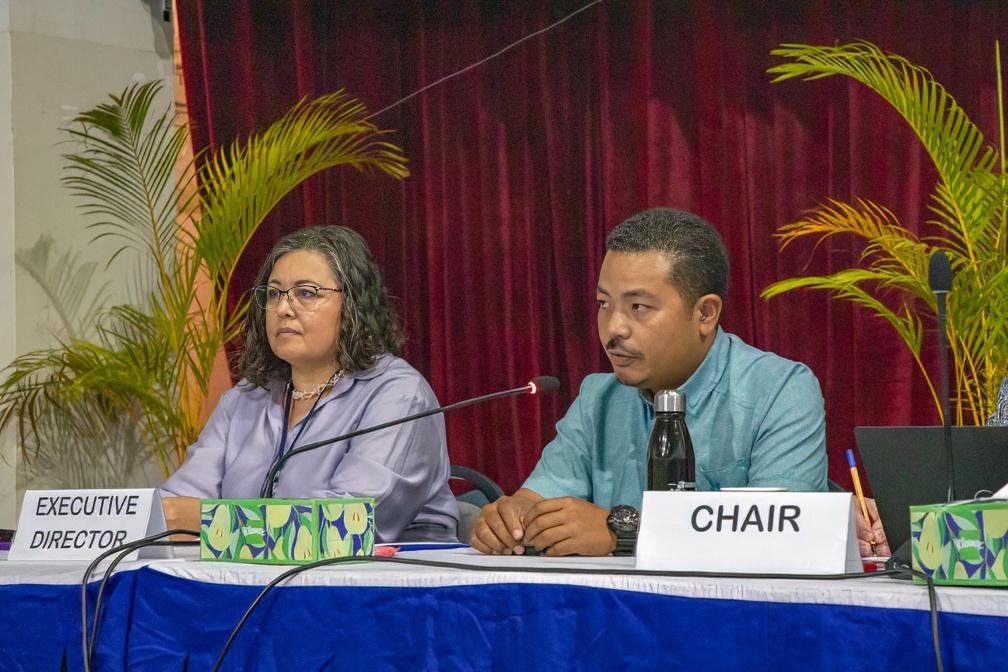
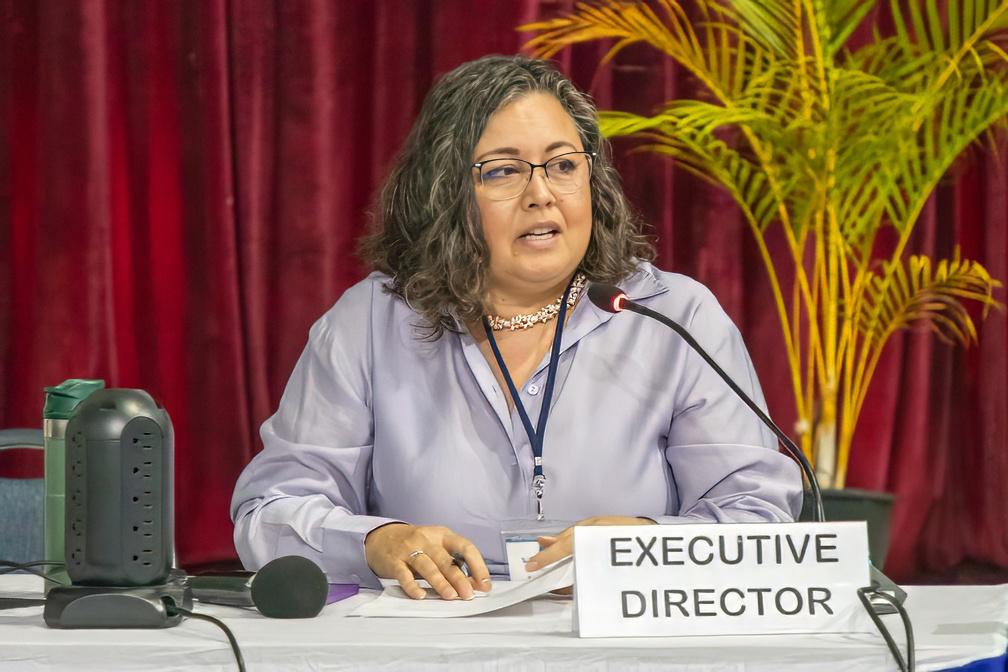
the management of this fishery, and the constructive engagement between the parties to this organization—between the CCMs in WCPFC and the broader civil society through that work—is fundamental to our success.”
“We have introduced a new theme of science-based management into the agenda, and this is aimed at really drawing together all the elements of TCC's work that support robust, science-based management. Fisheries science, fisheries management, and fisheries operations are not siloed, and TCC plays a critical role in providing technical advice that is integral to science-based management,” he said.
The TCC is scheduled to meet for just over a week, with only the intervening Sunday as a scheduled day off for participants to experience Pohnpei.

September 26, 2024
New York City—In a historic moment for the Federated States of Micronesia (FSM), His Excellency President Wesley W. Simina addressed the 79th Session of the United Nations General Assembly (UNGA) on September 26th, 2024. The President's remarks, focusing on urgent global issues such as climate change, ocean conservation, and international security, underscored the FSM’s role in promoting peace, sustainability, and collective action within the global community.
FSM’s own Ambassador Lippwe presides over General Assembly during President Simina’s Address: In a notable turn of events, President Simina's address was presided over by FSM’s Permanent Representative to the United Nations, His Excellency Ambassador Jeemer Lippwe. Ambassador Lippwe’s role in chairing the session was a result of the FSM’s election as one of the Vice Presidents of the General Assembly earlier this year, further highlighting the country’s growing presence and leadership on the global stage.
Kamorale to the World: Opening his address, President Simina shared a message of unity, rooted in the FSM’s national ethos of “Kamorale,” a national greeting that blends the diverse languages of the FSM's states.
“Kamorale represents the spirit of unity and solidarity that lies at the heart of my country and people. And that same spirit is equally important in the context of multilateralism here at the United Nations. In a world where global challenges require collective action, Kamorale reminds us that our strength and solutions come from our ability to come together.” he said.
Addressing the Climate Crisis: “Time is Running Out”: President Simina began by addressing the existential threat posed by climate change to small island nations like the FSM. “Every degree, every inch of sealevel rise, and every delay matters,” he said, highlighting the severe impacts already being felt, including an ongoing drought. The FSM has long been at the forefront of climate advocacy, and the President’s remarks echoed the urgency of immediate action.
He pointed to the 1.5°C temperature
limit outlined in the Paris Agreement, stressing, “The 1.5 degrees goal is the safety limit for our small islands. Beyond that lies a danger zone with deadly heat, food and water system disruption, and the drowning of lowlying islands.” President Simina called for prioritizing the reduction of nonCO2 pollutants such as methane, which can have immediate cooling effects, and announced the FSM’s endorsement of the Fossil Fuel Nonproliferation Treaty Initiative.
and Sea-Level Rise: Protecting Maritime Zones and Sovereignty:
President Simina brought attention to the deteriorating health of the oceans and the threat of sea-level rise, a pressing concern for the FSM. He commended the UN for hosting a high-level meeting on sea-level rise and reaffirmed the FSM’s stance on statehood and sovereignty amid rising waters. “Sealevel rise poses a significant threat to our livelihoods and security, but it does not jeopardize our sovereignty or maritime zones,” he asserted, referencing the UN Convention on the Law of the Sea.
Plastic Pollution and the Bridge to Busan Declaration:
The President also focused on the upcoming treaty on plastic pollution in Busan, Korea. He advocated for the regulation of plastic production, noting that plastics are derived from fossil fuels, contributing to both pollution and climate change. “If we do not address the unsustainable production of primary plastic polymers, then the global goal of ending plastic pollution by 2040 and limiting the average temperature rise cannot be achieved,” President Simina stated, urging global support for the "Bridge to Busan" Declaration.
Global Peace, Security, and Reforming the Security Council: “The protection of innocent civilians everywhere, is of paramount importance”: Turning to matters of global security, President Simina reaffirmed the nation’s commitment to global peace and security. Reflecting on the ongoing conflicts in Ukraine and the Middle East, President Simina emphasized the urgent need for diplomacy, dialogue and the protection of innocent lives. He called for the immediate release of hostages, a cessation of hostilities and renewed efforts toward a lasting peaceful resolution. President Simina concluded by emphasizing the need for the protection of innocent civilians in all conflicts, asserting that lasting peace
can only be achieved when human dignity and lives are respected.
President Simina also advocated for reforms to the UN Security Council to better address modern challenges, including climate-induced security risks and called for the establishment of a Special Representative for Climate, Peace, and Security.

“This reform should make the Council more effective, inclusive, transparent, and accountable. It must reflect the realities of today rather than those of 1945.” he declared, highlighting the need for expanding the Security Council’s membership to include representation from Japan, India, Germany, Brazil and from the African continent. President Simina further noted the need to amplify the voices of under-represented regions, such as Small Island Developing States, in a reformed Council.
Health and NCDs: Addressing a Growing National Health Crisis: President Simina spoke candidly about the health crisis facing Micronesia, where noncommunicable diseases (NCDs) remain a widespread issue. “NCDs undermine workforce productivity and contribute to poverty,” he said, outlining the country’s initiatives under the WHO’s "Healthy Islands" program. President Simina called for renewed global support to tackle the crisis and improve public health outcomes across the Pacific.
Youth and Gender Equality: “Moving towards a stronger and more inclusive future”:
President Simina emphasized the role of youth in shaping the future and called for greater investments in young people’s education, leadership, and well-being. “Our young people are the innovators and problem-solvers who will carry the torch of climate action and global justice,” he said. He also highlighted progress in gender equality in FSM, noting historic gains in women’s representation in government and reaffirming Micronesia’s commitment to CEDAW and the Pacific Leaders Gender Equality Declaration.
Conclusion - A Call for Unified Action: “I call on every nation represented here to act decisively, with courage and compassion.”:
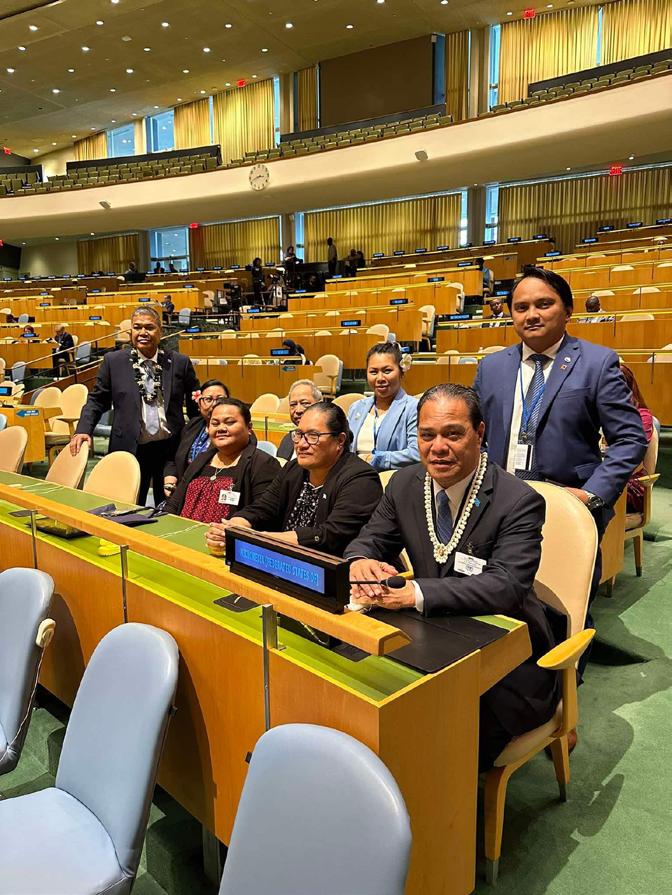
President Simina concluded his speech by urging world leaders to seize the moment for bold, unified action. “Let this Assembly be remembered not for words spoken but for deeds done,” he implored. “The spirit of Kamorale teaches us that strength lies in unity. The time for action is now.”
As the global community faces challenges from climate change to conflict, President Simina's address stood as a call to action, rooted in the values of unity, peace, and sustainability. The Federated States of Micronesia, though small, is ready to play its part in building a better future for all.
FSM Engagement at Side Events and Meetings:
In addition to the President’s address to the General Assembly, the FSM was proactively engaged in several key highlevel events and meetings, including the Summit of the Future, the first ever High-Level Meeting on Sea Level Rise and the Meeting on Antimicrobial Resistance (AMR) among others.
Secretary Elina Akinaga Addresses Multi-Stakeholder Panel on Sea-

September 27, 2024
Palikir, Pohnpei––On September 20, 2024, T.H. Vice President Aren B. Palik of the Federated States of Micronesia administers oath of office to two new members of the FSM Trust Fund Board. The two new members are Joseph Giliko from the State of Yap and Pilika Palik from the State of Kosrae.
Mr. Giliko and Mr. Palik were both nominated by President Simina to be members of the FSM Trust Fund Board and then confirmed by the FSM Congress. Mr. Giliko has had many years of experience working for the State of Yap in various government positions, which also included many years of service as a senator in the Yap State Legislature. His service also included directorship of two departments in the State of Yap and also several years as manager of the Yap branch for the Bank of Hawaii.
Mr. Palik has served for some years as a member of the FSM Banking Board in different roles such as Bank Examiner, where he had several duties and responsibilities dealing with various people and entities. He also served as a Financial Analyst for the FSM Banking Board, where his duties involved making sure that financial reports were accurate. Over the years, he attended and completed numerous trainings and workshops which relate to his field of business accounting.
Continued from previous page
Level Rise and Its Legal Dimensions:
The Honorable Elina Akinaga, Secretary of the Department of Resources & Development, delivered a statement during the Multi-Stakeholder Panel Discussion on Sea-Level Rise and its Legal Dimensions, held on the margins of the 79th United Nations General Assembly (UNGA).
In her address, Secretary Akinaga reaffirmed FSM's strong support for the ongoing work of the International Law Commission (ILC) on the legal implications of sea-level rise. She highlighted the significant contributions of the Pacific Islands Forum (PIF) and the Alliance of Small Island States (AOSIS) in advancing normative declarations on the issues of maritime zones, statehood, and sovereignty.
Secretary Akinaga also emphasized the urgent challenges posed by the climate emergency in the Blue Pacific Continent, asserting that sea-level rise does not diminish FSM's maritime zones or compromise its sovereignty under international law. "It is profoundly
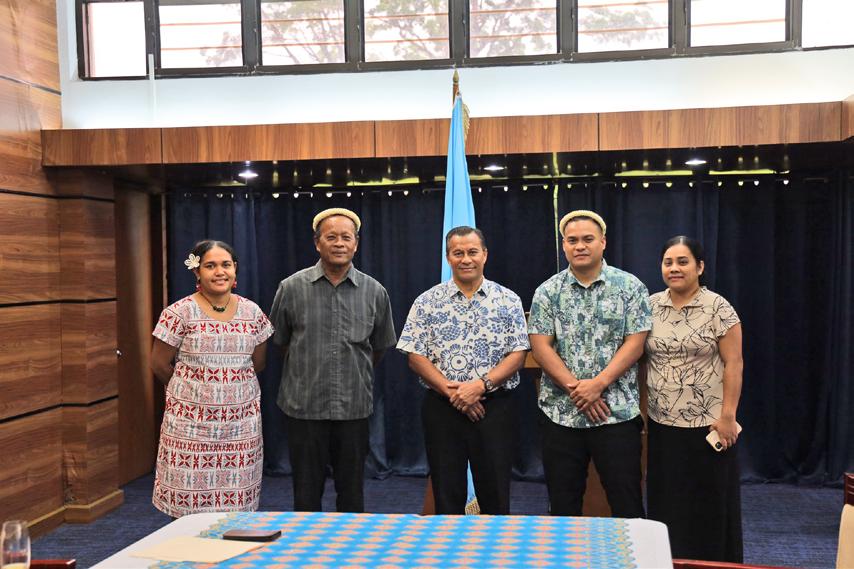
Both new members gave brief remarks after taking their individual oath of office, stating that they were honored to be called to serve the nation. They also indicated that they would work hard and that they both looked forward to working with their colleagues on the Trust Fund Board.
Vice President Palik gave a brief remark where he welcomed them to the Trust Fund Board and the Simina/Palik Administration. The Vice President stated that choosing new members for the Board was not simple, and that they were chosen carefully due to the importance of the positions to the Simina/Palik administration. He also mentioned that the abilities of the new members are well suited for the roles that they are about
unjust to assert otherwise," she stated, pointing to the minimal contribution of small island developing states like FSM to the climate crisis.
Lastly, she underscored the need for the international community to take responsibility for addressing the threats posed by sea-level rise, particularly to individuals, coastal ecosystems, and socio-cultural practices. Despite these risks, Secretary Akinaga affirmed FSM's confidence in the robust protections offered by international law concerning its maritime rights, statehood, and sovereignty.
Secretary Marcus Samo Addresses Meeting on Antimicrobial Resistance (AMR):
The Honorable Marcus Samo, Secretary of the Federated States of Micronesia (FSM) Department of Health & Social Affairs, delivered a statement on the critical issue of Antimicrobial Resistance (AMR) during a high-level meeting on the margins of the 79th United Nations General Assembly (UNGA).
In his remarks, Secretary Samo highlighted the global threat posed by AMR, warning that the misuse and overuse of antimicrobials jeopardizes decades of progress in medicine and
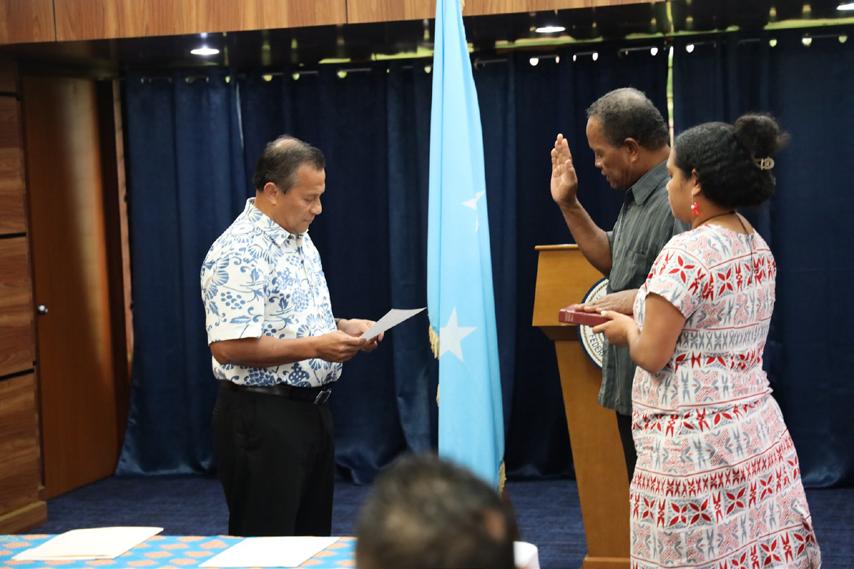
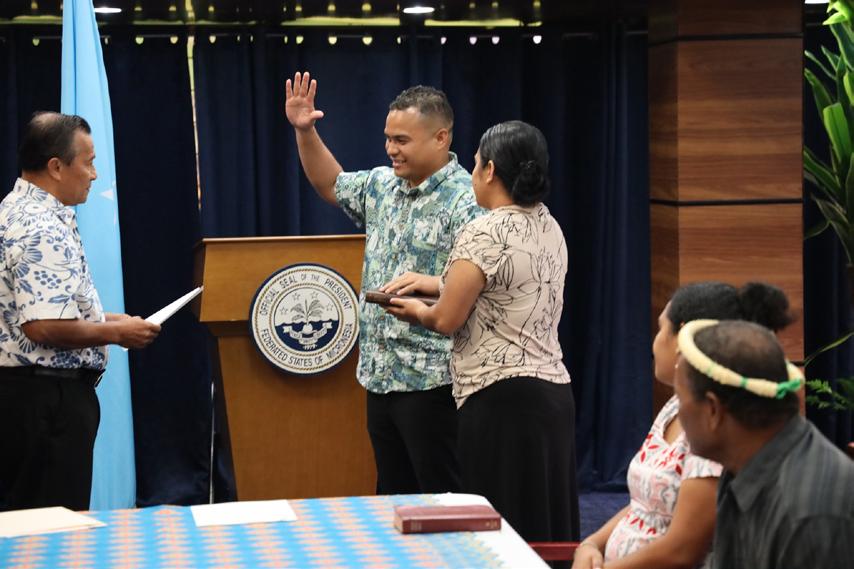
to undertake, and added that both the President and Vice President look forward to working with them in the coming days, months and years.
public health. He stressed the need for urgent, collective action, drawing attention to the ongoing efforts in FSM, including the country’s integrated national workplan on AMR and its fight against tuberculosis (TB).
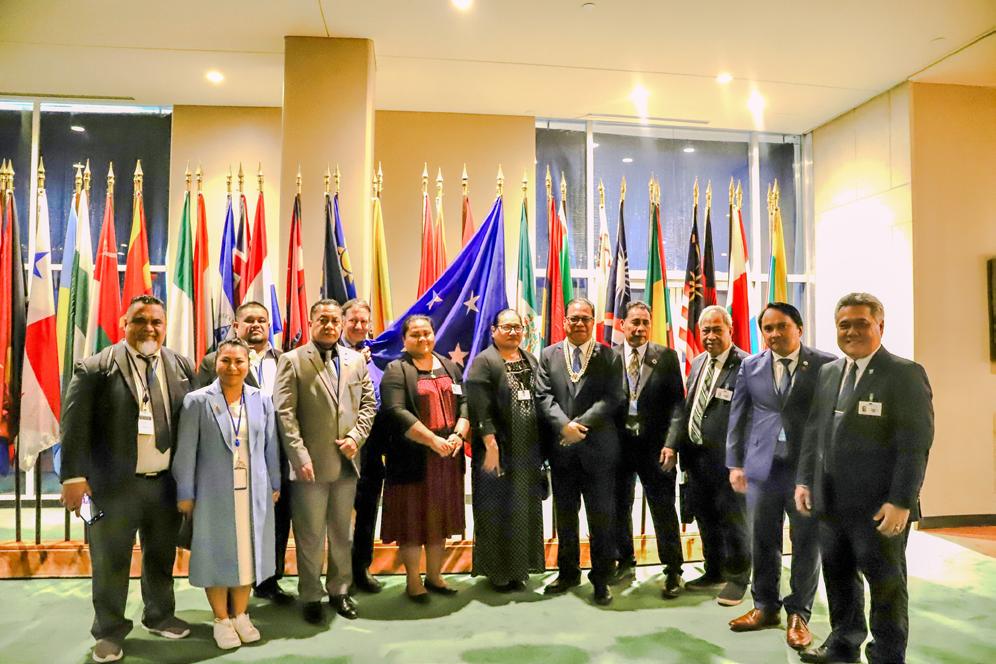
Secretary Samo also called for strengthened global regulations to prevent the inappropriate use of antimicrobials in agriculture and animal feed, particularly in Small Island Developing States (SIDS), where such practices pose a significant risk to public health. He urged the international community to ensure that antimicrobials are kept out of the food supply chain for both humans and animals.
Concluding his statement, Secretary Samo outlined four critical global actions: increased investment in AMR research, enhanced surveillance systems, capacity-building for healthcare infrastructure, and responsible global trade practices. He voiced FSM’s strong support for the Political Declaration on
AMR adopted during the meeting.
The 79th UNGA marked a significant milestone in FSM's diplomatic history, showcasing both the leadership of President Simina and the nation's increasing influence in multilateral forums. Ambassador Jeem Lippwe's historic role in presiding over the General Assembly further symbolizes FSM’s growing stature on the world stage, as the country continues to champion issues critical to its survival and future.
View President Simina’s full address to the 79th UNGA here: https://www. youtube.com/watch?v=U8wQjBEVp80


Continued from front page
to collection centers to ensure they are recycled rather than discarded into Pohnpei’s natural environment.
This afternoon, Johsper Nedlick and a colleague from CRS provided a private tour of the facility that will be used to turn what would otherwise be waste plastic into “valuable products that drive economic growth,” as U.S. Ambassador Jennifer Johnson put it during her speech at the opening.
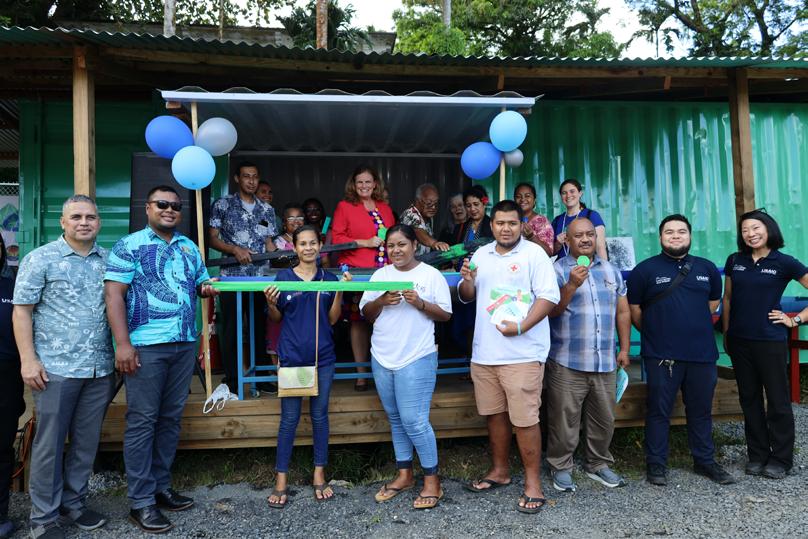
Why Intern with Us?
- Hands-on experience in media production
- Grow your video editing expertise
- Contribute to meaningful projects that highlight the stories and voices of the Pacific - Work alongside a creative and passionate team - Get paid to learn!
What We’re Looking For: - A motivated individual with a passion for storytelling - Strong video editing and media production skills
- Eagerness to learn and make a difference - Individual must reside in Pohnpei
Don’t miss out on this amazing opportunity! Send your resume and portfolio to micronesianproductions@gmail.com or call 320-6505
The usable plastics are first ground down in one of two grinders. Once a sufficient amount has been collected, several machines can heat and form the plastics into usable items. One machine melts and presses the plastic scrap into panels approximately four feet by four feet in size. During the opening celebration, the podium from which the speakers addressed the audience was built entirely from recycled panels produced by that machine.
Another machine can create four-footlong, two-inch by two-inch plastic boards similar to 2x2 lumber. That same machine can also be used to extrude items resembling smaller versions of concrete building blocks. Nedlick mentioned that while they hope to eventually produce full-sized blocks, the current smaller blocks are still highly usable. Yet another machine is designed to work with molds to create plastic bowls, dishes, and figures.
“At its core, the CREATE Project is about building a circular economy,” Ambassador Johnson said. “In a circular economy, nothing is wasted… This initiative marks a significant milestone in our shared commitment to addressing one of the most pressing environmental challenges of our time: ocean plastic pollution.”
“Right now,” Nedlick said, “we are pretty much collecting everything (plastic).” However, while they are collecting, grinding, and storing the plastic for safe disposal, not all types can be recycled using the equipment at the CREATE center. They later provided a chart of recycling codes for plastics (refer to the chart in this article). The center can recycle high-density polyethylene (HDPE), low-density polyethylene (LDPE), polypropylene (PP), and polystyrene (PS or Styrofoam).
They cannot recycle the type of plastic used in soda or water bottles, called polyethylene terephthalate (PET), for the same reason that burning or melting those types of plastics releases poisonous gases that they do not have the capability to filter during the recycling process. Code 3 and code 7 plastics also cannot be recycled. However, they can recycle the type of plastic used in the lids of plastic drinking bottles. Despite this, they are accepting all plastics, grinding them, and storing them to keep those materials out of the ocean and Pohnpei’s environment.
Ambassador Johnson announced that the U.S. Department of the Interior will be funding the second phase of the CREATE program, which will focus on scaling up plastic recycling initiatives and enhancing conservation efforts in businesses, schools, and households. “I’m so pleased that the U.S. Government can be part of this important—and very cool—initiative,” she said.
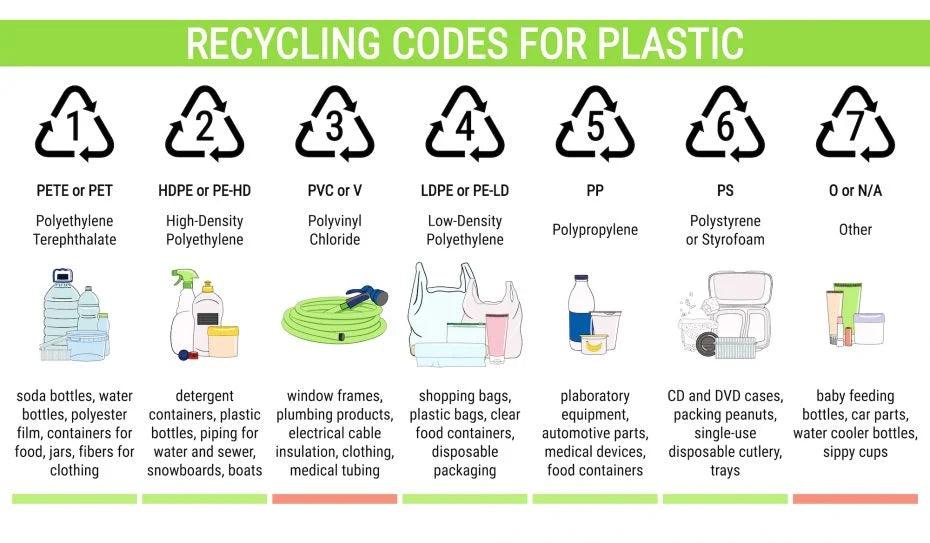
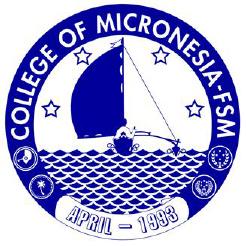



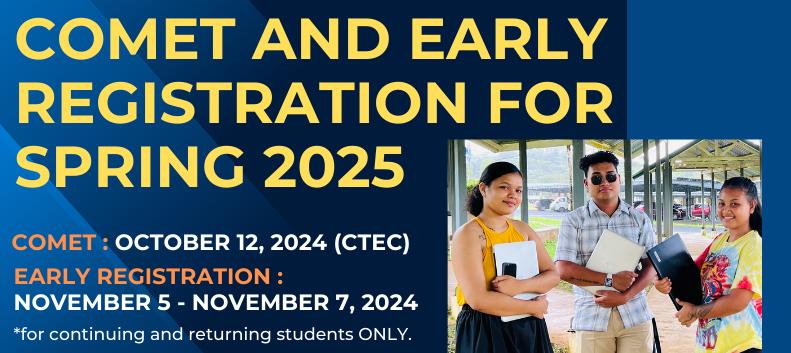



September 29, 2024
Anchorage, Alaska—Governor Stevenson A. Joseph today welcomed attendees to the Pacific Health Gathering, emphasizing the urgent need for collaborative action to combat noncommunicable diseases (NCDs) in the Pacific region.
The Joseph/Ioanis Administration has prioritized NCD prevention, along with food security, water security, and energy security. In his opening remarks, Governor Joseph stressed the importance of a holistic approach that integrates health initiatives with the wisdom of faith-based and traditional leaders. “We must work together as governments, communities, and leaders of all backgrounds to combat the rising tide of NCDs,” he stated. “Our diverse cultures and traditions offer invaluable insights to guide our efforts.”
The Governor emphasized the need to build partnerships that bridge traditional knowledge with modern healthcare to address NCDs such as diabetes, heart disease, and obesity. “Health is not just the absence of disease; it encompasses physical, mental, and spiritual wellbeing,” he added. “By engaging with faith-based organizations and traditional leaders, we can create culturally relevant solutions that resonate within our communities.”
The Pacific Health Gathering, from September 29 to October 1, brings together health professionals, policymakers, community leaders, and advocates from across the Pacific region to share knowledge, experiences, and best practices in addressing health challenges. The event focuses on fostering collaboration and innovative strategies to improve health outcomes and reduce the burden of NCDs.
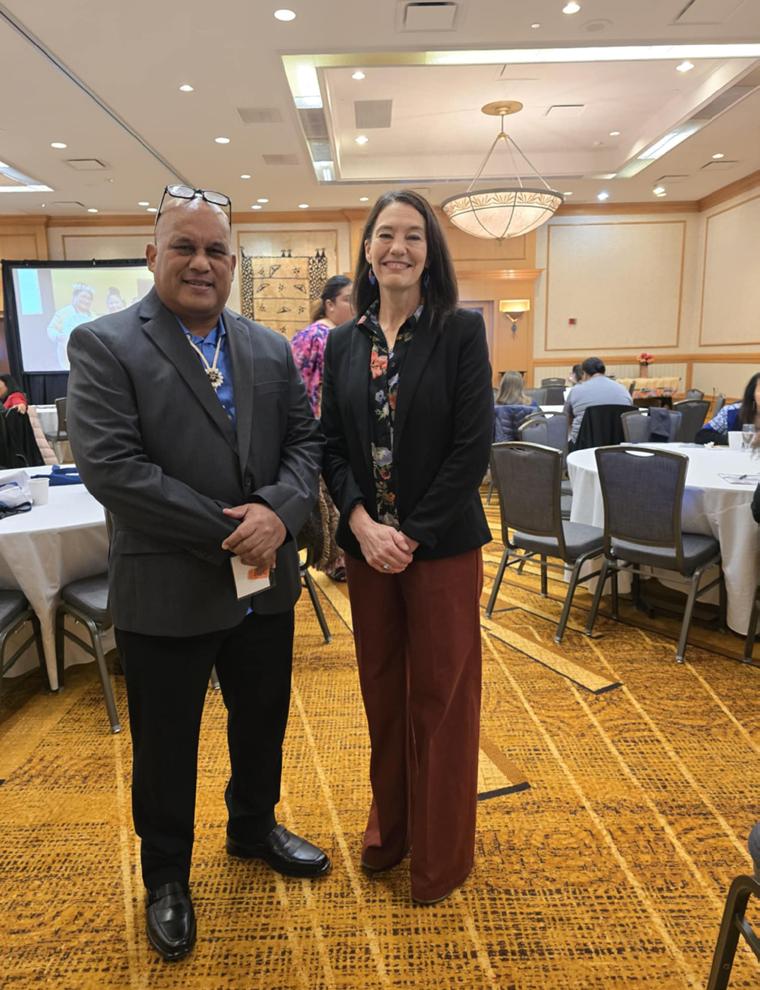
Governor Joseph encouraged participants to use the gathering as an opportunity for meaningful dialogue and collaboration. “Together, we can cultivate a healthier future for our communities,” he said. “Let us harness the strength of our collective efforts and the wisdom of our traditions to pave the way for transformative health initiatives.”
During the gathering, Governor Joseph met briefly with the Mayor of the Municipality of Anchorage, Alaska, T.H. Suzanna LaFrance. He was accompanied by the First Lady of Pohnpei, Dr. Aina Garstang, Chairman of the Standing Committee on Health, 11th Pohnpei Legislature, Senator Shelten Neth, and Director of the Department of Health and Social Services, Mr. Stuard Penias. Also present and part of the Pohnpei delegation representing the Pohnpei State Primary Health Care Division were Mary Allen Silbanuz, Sylvia Benjamin and Hagatta Kerman.

EXPRESSION OF INTEREST (EOI): 24-515-GRA
Enhancing Direct Access (EDA) Programme
Resilient Communities Grant Facility (RCGF)
“Climate Change Adaptation Solutions for Local Authorities in FSM”
The Federated States of Micronesia (FSM) Enhancing Direct Access (EDA) Programme is pleased to announce a new climate change adaptation grant opportunity through the Resilient Communities Grant Facility (RCGF). This grant initiative seeks to empower Municipalities and State Governments across FSM to address critical climate vulnerabilities and enhance their capacity to adapt to the changing environment.
The RCGF has a total funding pool of USD 12 million available to Local Authorities (Municipal and State Government) in FSM. Grant applications must clearly outline vulnerabilities related to climate change and propose adaptation interventions specifically designed to meet local needs.
The Pacific Community (SPC) serves as the Executing Entity for the EDA Programme, which runs from 2021 to 2028. The Programme is coordinated through the SPC Micronesia Regional Office (MRO) based in Pohnpei
How to Apply for a Grant
Municipal and State Governments are the eligible applicants, may submit a completed Expression of Interest (EOI) form to the EDA Programme.
The EOI submission window for this first call is open from September 30th to October 31st, 2024.
Grant Funding Available
Grant awards range from USD 75,000 to USD 1 million, and eligible applicants (Municipal or State Government) must focus on one or more of the following thematic areas:
• Food security
• Water security
• Disaster Risk Reduction (DRR) and Coastal Protection
Projects proposed must demonstrate concrete and innovative adaptation strategies aimed at addressing specific climate risks. SPC will also offer capacity-building and awareness-raising support to assist local authorities in preparing strong submissions.
Eligibility and Selection
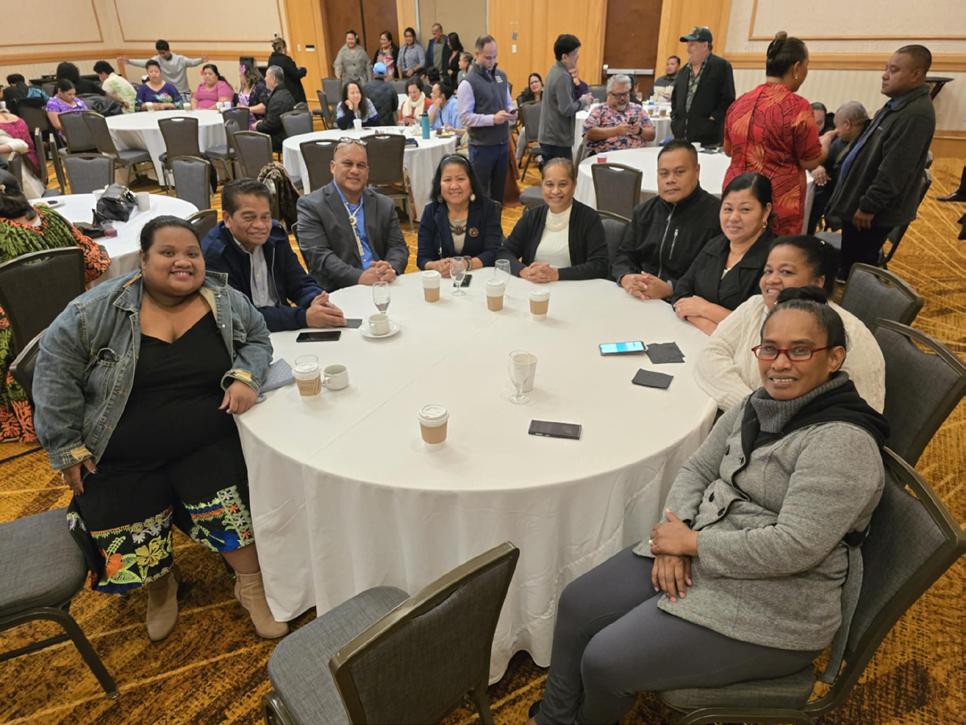
Applicants are urged to thoroughly review the RCGF Manual and Guidelines to ensure all eligibility requirements are met. Only endorsed EOIs submitted by the deadline will be considered for funding.
Key Dates
• EOI Submission Deadline: October 31, 2024, by 11:59 p.m. (Pohnpei Time).
For further information, please contact the EDA Programme Coordination Unit (PCU) at fsmeda@spc.int


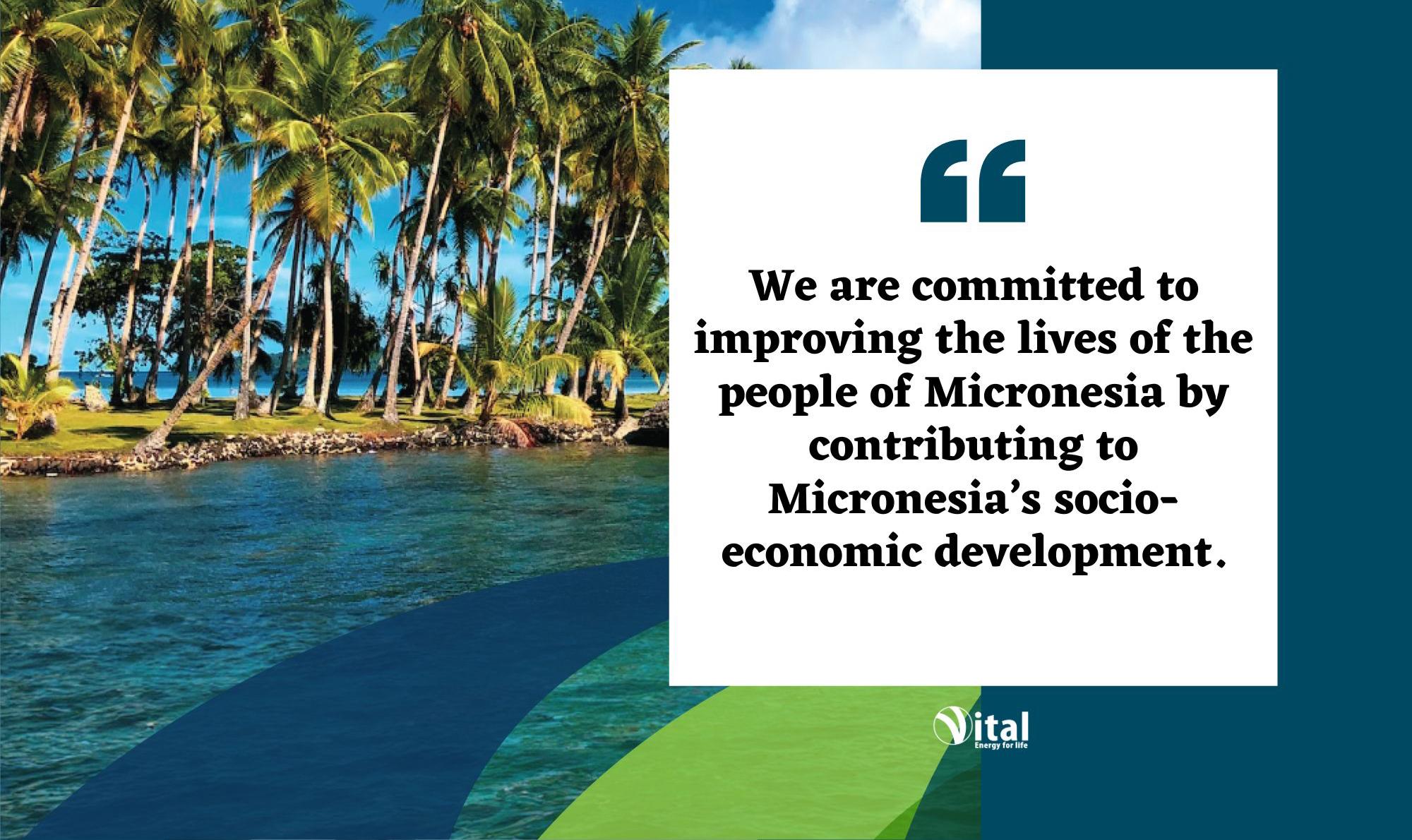
September 26, 2024
KOLONIA, Pohnpei—The Pohnpei State Government is proud to announce the swearing-in of new board members for two vital state entities. The Chief Justice of the Pohnpei State Supreme Court, T.H. Nelson A. Joseph, administered the oaths of office for IsoNahnken of Madolenihmw, John Adolph, who joins the Board of Directors for the Pohnpei Transportation Authority, and IsoNahnken of U, Ihlen Joseph, along with Ms. Ana Mendiola and Mrs. Melanie Lawrence Aiseam, who will serve on the Board of Directors for the Pohnpei Investment Fund. Speaker Marvin T. Yamaguchi presented their certificates of appointment.
The ceremony, held at the Legislature chamber, was a significant occasion, highlighted by the participation of traditional leaders and members of the Pohnpeian royalty. Acting Governor Francisco L. Ioanis commended the new
appointees, noting the historical importance of having traditional leaders such as IsoNahnken
John Adolph and IsoNahnken Ihlen Joseph on these essential boards. He expressed gratitude to the Pohnpei Legislature for its continued support in these appointments and emphasized the crucial responsibilities these new board members would carry.
The royal presence of Wasalapalap Isipahu Nahnmwarki of Madolenihmw and Wasalapalap Sangohro Nahnmwarki of U added great significance to these appointments, noted Acting Governor Ioanis, who later memorialized this occasion with a traditional feast in honor of the Nahnmwarkis, IsoNahnkens and the new board members.
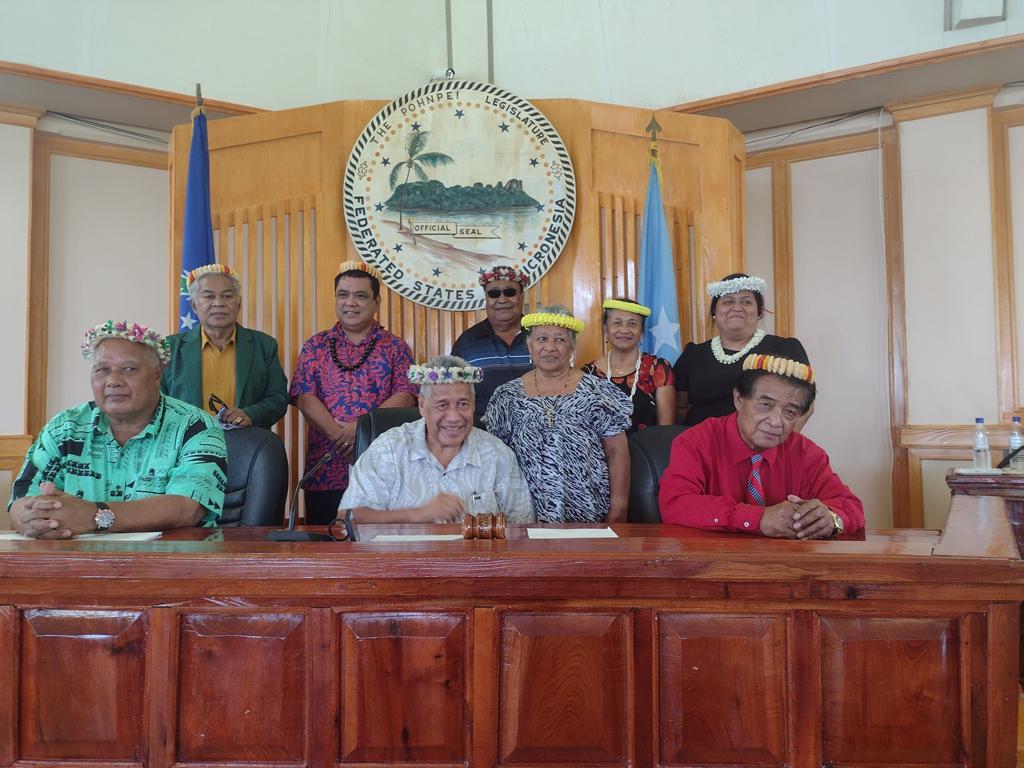
economic development, stressing the responsible use of public funds to ensure the success of such projects. His remarks underscored the critical role that transportation plays in connecting communities and fostering economic growth throughout Pohnpei.
IsoNahnken of Madolenihmw John Adolph, speaking after being sworn in, highlighted the importance of improving road infrastructure for
IsoNahnken of U Ihlen Joseph, drawing from his extensive experience at the national level in finance and investment,
spoke about the importance of managing the Pohnpei Investment Fund to secure a stable future for the next generations. He expressed his commitment to ensuring that the fund continues to serve the people of Pohnpei through responsible financial management and long-term investment strategies.
Acting Governor Ioanis closed the event by encouraging the new board members to approach their roles with dedication and integrity, noting the immense responsibility they have in shaping the future of Pohnpei’s infrastructure and financial sustainability.
The Pohnpei State Government extends its warm congratulations to all newly appointed board members and looks forward to their contributions to the state’s continued growth and prosperity.

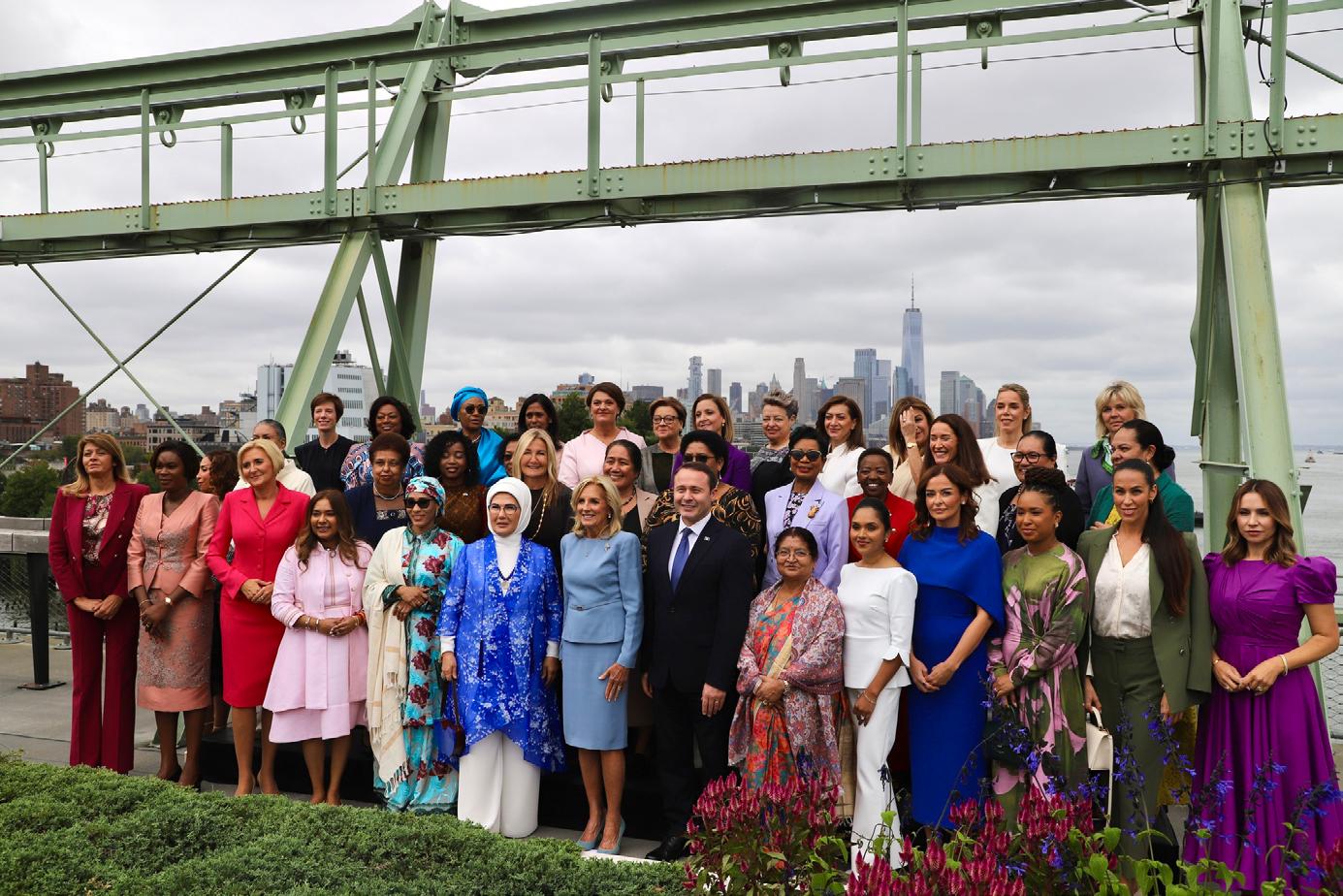
September 24, 2024
New York City—Madame Ancelly Simina, First Lady of the Federated States of Micronesia, attended a luncheon hosted by the U.S. First Lady Dr. Jill Biden on the margins of the 79th United Nations General Assembly. The event, a tradition during the UNGA, marked Dr. Biden’s final hosting as First Lady of the United States.
Madame Simina expressed her deep gratitude to Dr. Biden for her gracious hospitality and for the many years of leadership and advocacy. She also extended her best wishes to Dr. Biden, thanking her for her tireless efforts in
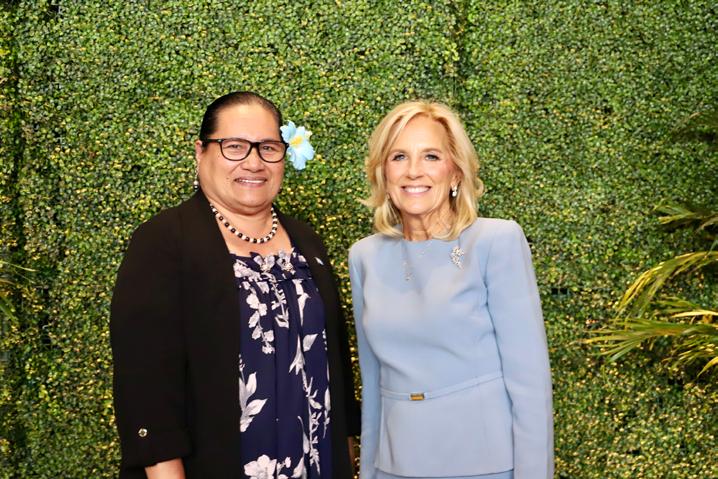
advancing causes for women, children, and education globally.
The luncheon, attended by First Spouses and distinguished guests from around the world, provided a platform to celebrate international cooperation and strengthen ties among nations.

Continued from front page
payments. The single attorney representing both CTSI and Peter did not address that alleged shortcoming in any of its filed defenses.
Reffner claims the shortage of cash at Bank of Guam was not the fault of the Bank of Guam, as defense attorneys have claimed, but due to a conscious business decision by the local Western Union outlets on how to handle their cash needs. He provided an affidavit from Bank of Guam Branch Manager Mary Simmering stating that the bank provides two ways for customers to ensure they have cash on hand to support their businesses: cash drawers and imported cash for customer use. Neither method is free, and Reffner claims this is why the outlets do not use them. Instead, the outlets issue a check for a large amount to one individual who then goes to the bank to cash it for the outlets’ needs. However, although funds may be electronically in the outlets' accounts, the Bank of Guam often does not have sufficient hard cash to pay out.
The defendants say this is the bank’s fault. Reffner claims it is instead a business decision to avoid the cash handling service provided by the bank, placing the fault and responsibility on the outlets. He also argues that another entity offering a similar service to Western Union in Pohnpei issues a check to the recipient when they lack sufficient cash on hand. The recipient can then cash the check at a local bank. He argues that Western Union outlets did not offer him this alternative method of payment.
During the hearing on the motion to disqualify the local attorney, Reffner indicated that depending on the outcome of a hearing on defendants' motions for summary judgment and his response to them, he may file a class action against defendants on behalf of Pohnpei residents who have faced circumstances similar to his when trying to collect cash from Western Union.
As an example, Reffner said that while at one outlet, he met two people who had taken a taxi to Kolonia from Madolenihmw to collect their cash. They told him that when the outlet could not pay them, they had to spend the night outside because without payment, they did not have enough money for a taxi back home.
The court will first have to rule on the motion to disqualify. Depending on the outcome of that decision, the next step may be scheduling a hearing on the motions regarding summary judgment. No decisions regarding the claims have been made yet.
for
Professional Consulting Service for the Design of College of Micronesia (COM) Technical Vocational Campus Upgrade , College of Micronesia, Pohnpei Campus
The Program Management Unit (PMU) of the Department of Transpo1tation, Communications & Infrastructure (DTC&I), National Government of the Federated States of Micronesia is hereby issuing this Bid Invitation Notice to Qualified Consultants for the Professional Consulting Service for the Design of College of Micronesia (COM) Technical Vocational Campus Upgrade, College of Micronesia, Pohnpei Campus.
Further information on this ITB may be obtained by submitting a written request for details to Mr. Shankarah Lessey, Contract Specialist, DTC&I, P.O. Box PS2, Palikir, Pohnpei, FM 96941 at email shankarah.lessey@tci.gov. fm with the subject heading:
"Professional Consulting Service for the Design of College of Micronesia (COM) Technical Vocational Campus Upgrade, College of Micronesia, Pohnpei Campus"
The bidding documents, including the instructions to bidders, scope of work and conditions of contract may also be directly obtained from the Department's website: https://www.tci.gov.fm/ in its PMU section.
The closing date for the submission of bids is Thursday 31st October 2024 at 4pm local Pohnpei Time
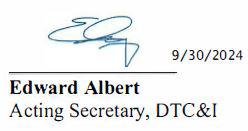

U.S. Coast Guard Forces Micronesia Sector Guam
September 30, 2024
Kosrae, FSM—U.S. Coast Guard Forces Micronesia/Sector Guam personnel, as part of Pacific Partnership 2024, conducted a series of boating safety workshops and community outreach activities in Kosrae, further strengthening maritime safety awareness and building meaningful relationships within the local community from Sept. 17 to 20, 2024.
During the mission stop, U.S. Coast Guard personnel led four comprehensive boating safety workshops at the Kosrae Community Center and the island’s three marinas — Okat, Lelu, and Utwe. These workshops provided crucial information on maritime safety and search and rescue operations, with a particular focus on addressing the unique challenges faced by remote island communities like Kosrae.
“It’s an honor to work with the people of Kosrae, who have a rich history as skilled watermen, to support their maritime safety with modern tools and techniques,” said Lt. j.g. Melissa Reilly, the U.S. Coast Guard representative for Pacific Partnership 2024 in Kosrae. “Through these workshops, we aim to provide local mariners and fishermen with resources that honor their seafaring heritage and enhance survival and expedite rescue in emergencies.”
In addition to the educational sessions, U.S. Coast Guard members distributed complimentary safety equipment, including signaling mirrors and whistles, along with informational pamphlets to workshop attendees. The team tailored the marina-based sessions to meet local fishermen's and their families' specific needs, providing them with insights into safe navigation and emergency procedures.
Key stakeholders from the Kosrae State Government Departments, including Maritime Police, the Department of Resources and Economic Affairs (DREA), and the Kosrae Island Resource Management Authority (KIRMA), were actively engaged during the community center session, further strengthening partnerships aimed at improving
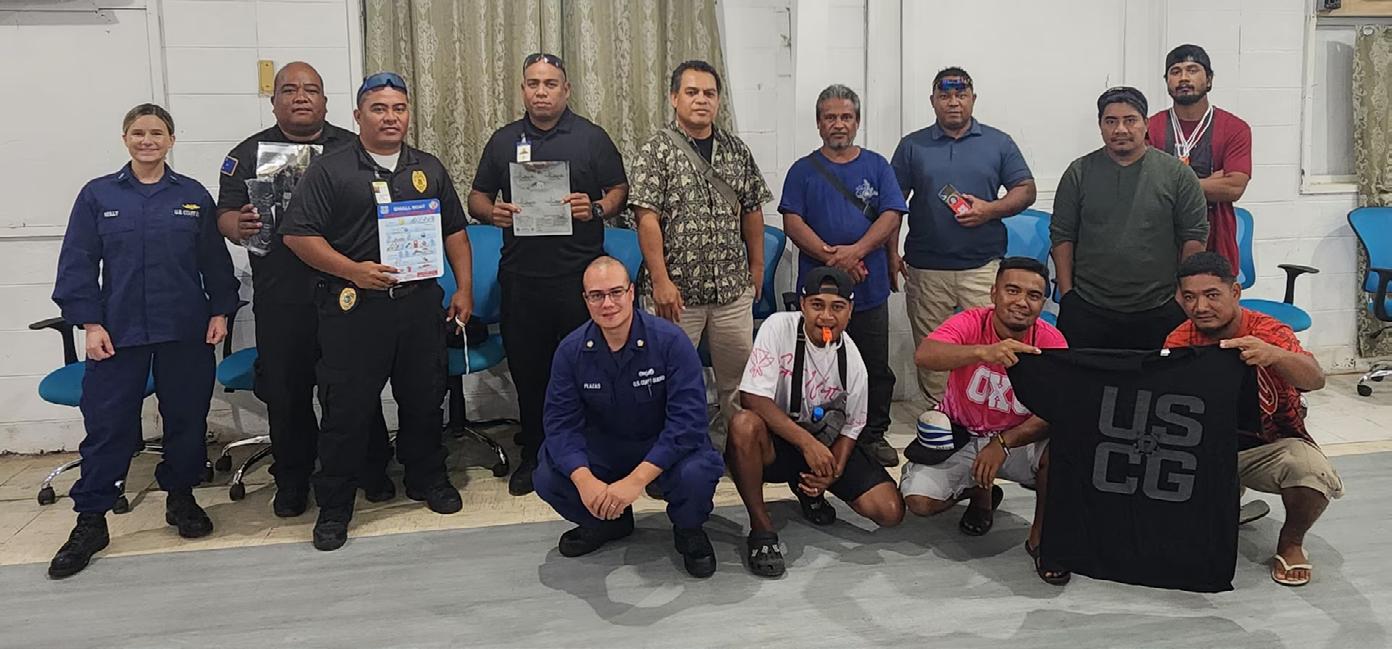
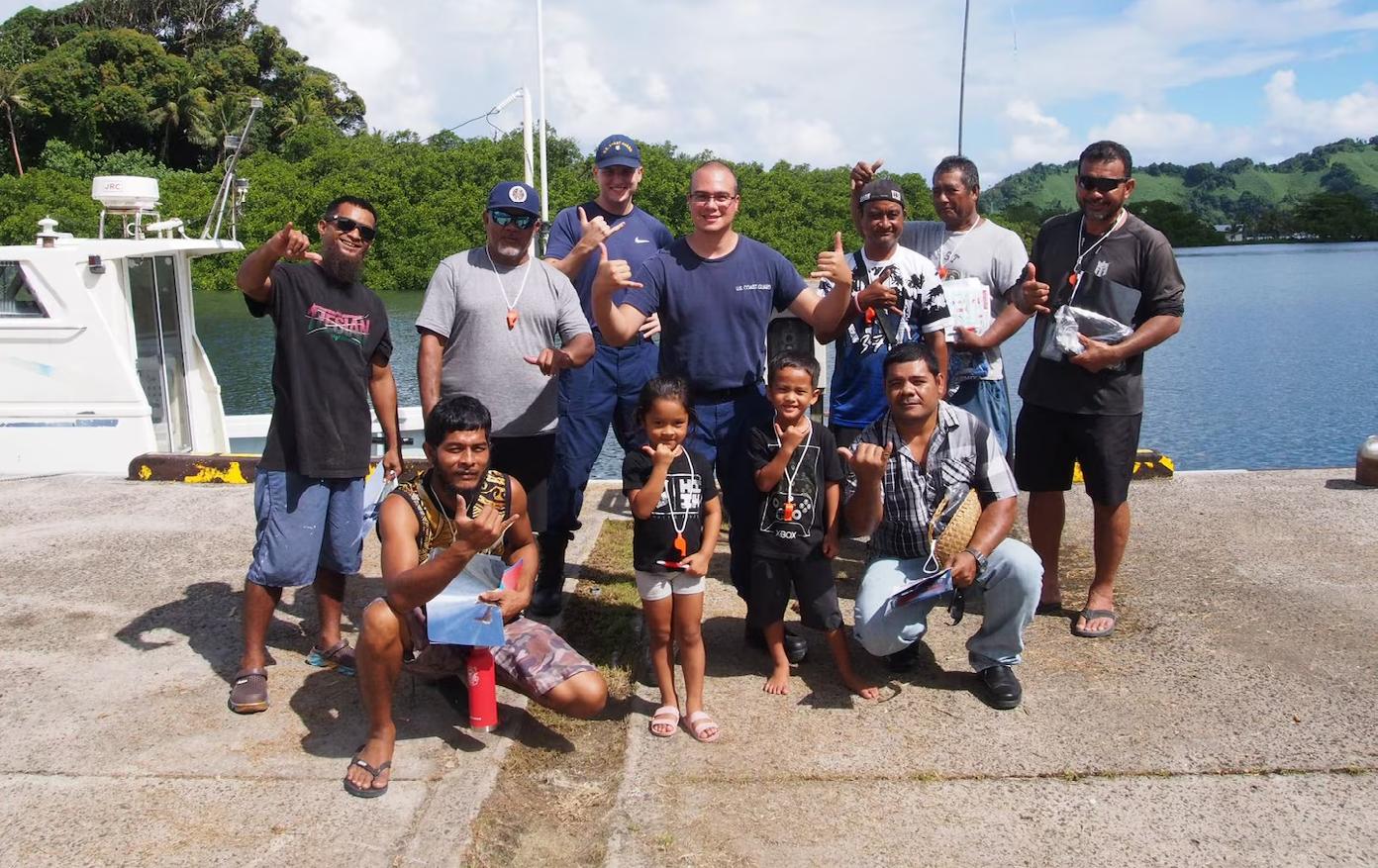
maritime safety across the island.
The U.S. Coast Guard’s involvement in Kosrae extended beyond maritime safety training. Coast Guard personnel also participated in a community service project at Lelu School, assisting with the installation of playground equipment. Additionally, they engaged in a friendly baseball event with students and faculty at Malem Elementary School, fostering positive community relationships through shared experiences.
“These engagements are invaluable in building trust and strengthening our connection with the communities we serve,” said Lt. j.g. Reilly. “We’re grateful for the warm welcome and the opportunity to collaborate on such important safety initiatives.”
Outreach efforts also included visits to various villages, where Coast Guard personnel introduced themselves to residents and provided information about the U.S. Coast Guard’s mission and operations, ensuring communities across Kosrae are familiar with
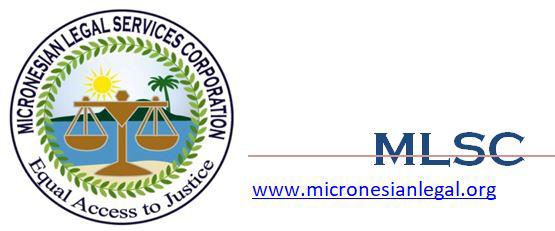
For Website Maintenance and Improvement Services
Proposals due: October 31, 2024
Micronesian Legal Services Corporation (MLSC –micronesianlegal.org) is a nonprofit legal aid organization with offices in 8 legal jurisdictions across 4 countries.
Our website is currently built on WordPress.
available services.
Pacific Partnership 2024-2 aims to enhance disaster preparedness and response capabilities by collaborating with host nations like the Federated States of Micronesia. The efforts conducted by the U.S. Coast Guard and other partners underscores the importance of regional cooperation in ensuring that communities are wellprepared to face emergencies.
Pacific Partnership 2024-2 aims to enhance disaster preparedness and response capabilities by working collaboratively with host nations like Federated States of Micronesia. The efforts conducted by the U.S. Coast Guard and other partners underscores the importance of regional cooperation in ensuring that communities are wellprepared to face emergencies.
For more information on Pacific Partnership, visit www.clwp.navy.mil/ Pacific-Partnership
We are seeking a qualified web development and maintenance contractor to provide ongoing support to ensure that our website remains a valuable resource for our clients and the community.
For more information and to submit a proposal, please see https://mlscnet. bamboohr.com/careers/30
Please submit your proposal by November 15, 2024, to Lee Pliscou, Executive Director, at lee@mlscnet. org.
Please submit proposals in PDF format.

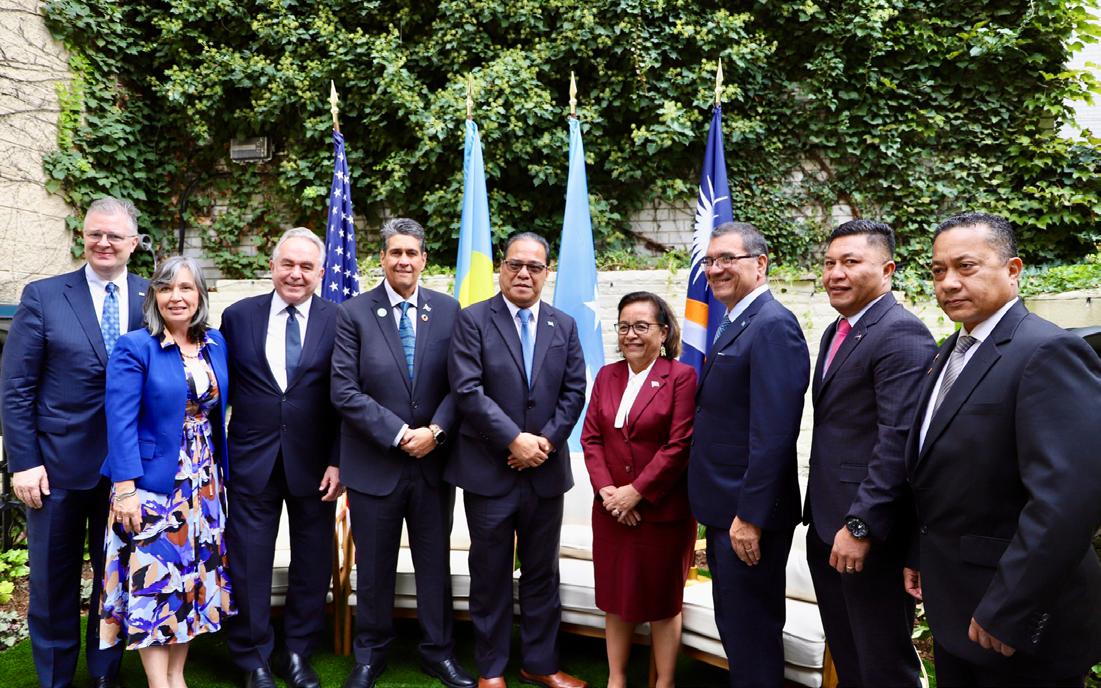
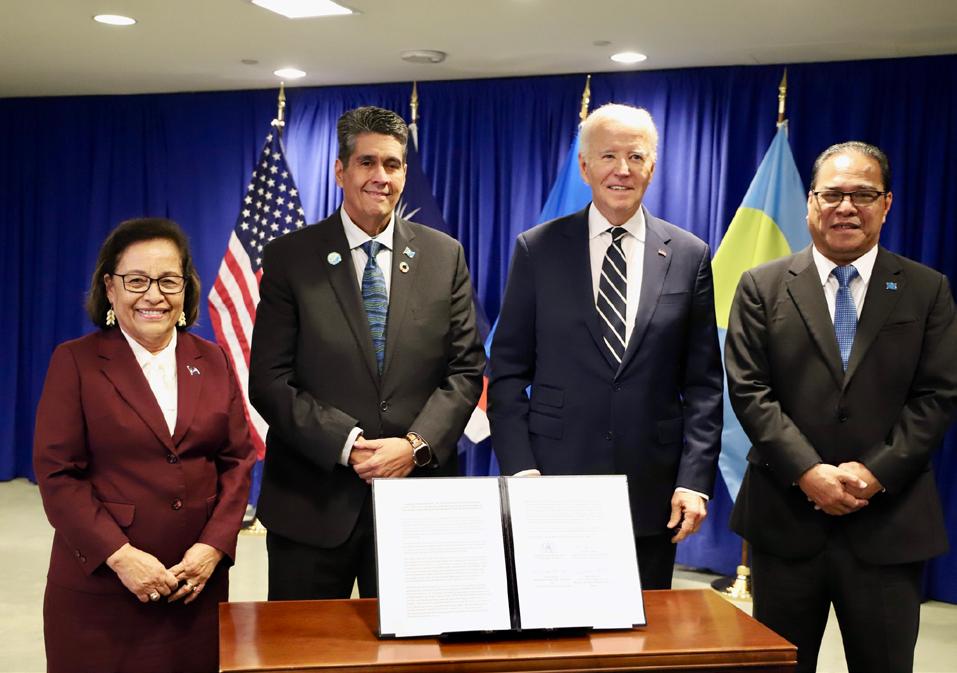
guide relations for the next 20 years, further solidifying the long-standing partnerships between the four nations.
Construction of the College of Micronesia Kosrae MultiPurpose Building, FSM, College of Micronesia, Kosrae Campus
September 24, 2024
New York City—The Federated States of Micronesia (FSM) celebrated a momentous moment in the historic relations between the FSM, the Republic of the Marshall Islands, the Republic of Palau, and the United States of America, with the signing of a joint declaration reaffirming the Compacts of Free Association. With Palau and the Marshall Islands FPSA’s (Federal Programs and Services Agreement) now endorsed, this declaration, marks the completion of new Compact-related agreements that will
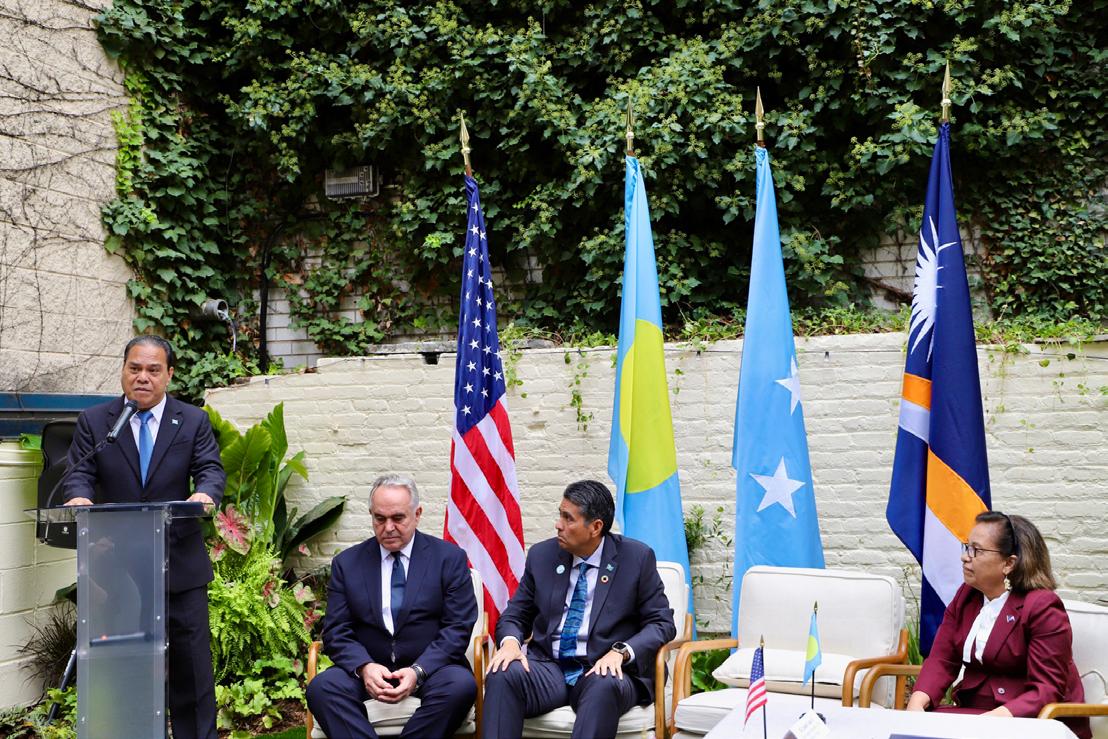
The ceremony took place at the Palau Mission in New York, on the margins of the 79th United Nations General Assembly. Signing on behalf of the FSM, Deputy Secretary of Foreign Affairs Ricky F. Cantero highlighted the enduring strength of the Compact agreements, which have fostered mutual respect, shared security, and economic collaboration across the Pacific. “This signing is a testament to our collective commitment to the principles of sovereignty, democracy, and shared prosperity. Our partnerships with the United States, and our sister nations, Palau and the Marshall Islands, are anchored in shared values and mutual interests,” said Deputy Secretary Cantero.
At the event, H.E. President Wesley W. Simina delivered remarks emphasizing the strategic importance of the Compacts in fostering a stable and secure Indo-Pacific region. "This celebration could not come at a more important and opportune time," President Simina remarked. "A stable and secure Indo-Pacific is vital not only to the futures of our two nations and peoples, but to greater global security. The U.S. Compacts with the FSM and with our neighbors in Palau and the Marshall Islands bring the vast Central Pacific under the U.S. defense umbrella." He congratulated Presidents Whipps and President Heine on the completion of their respective agreements and underscored that the Compacts provide essential development assistance, helping to advance education, health, infrastructure, and critical climate change initiatives in the FSM.
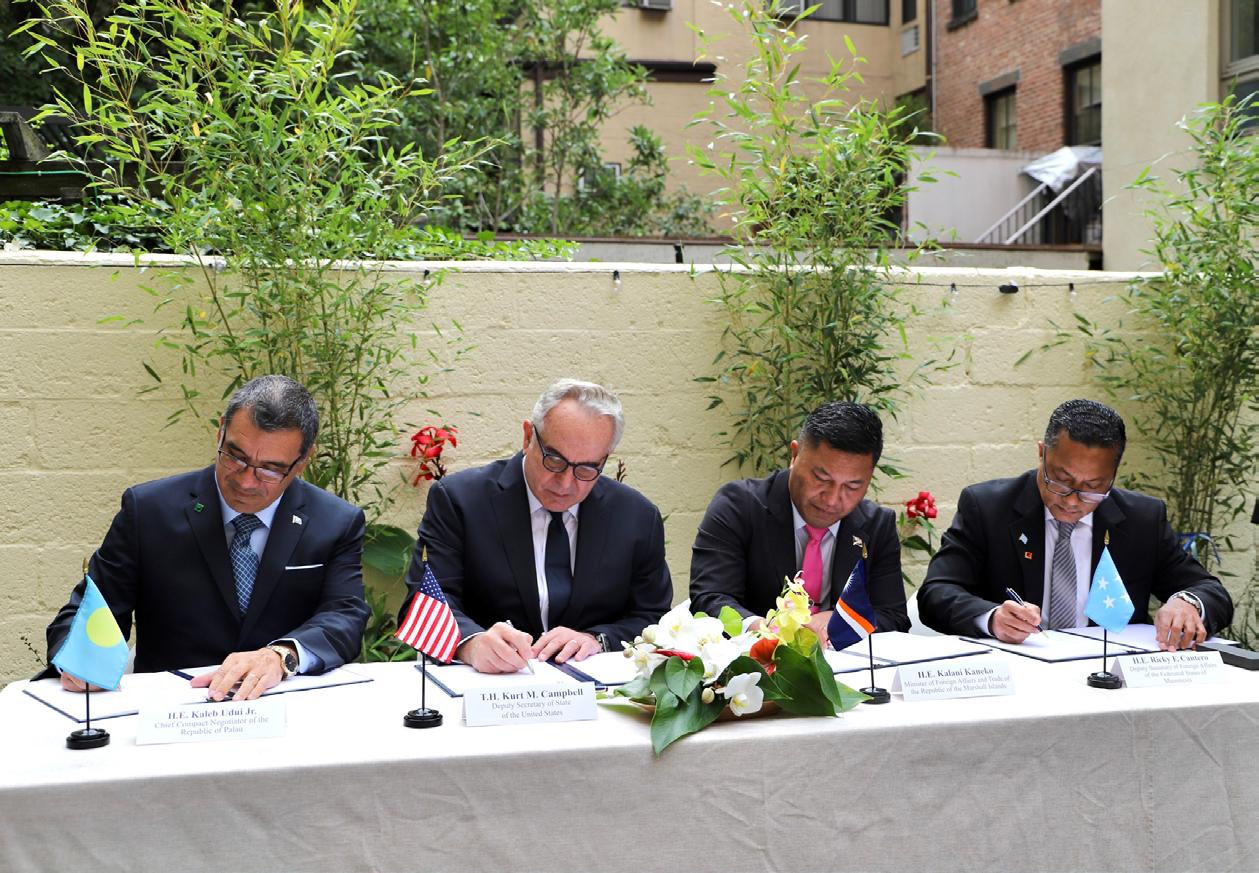
Following the signing ceremony, President Simina, President Whipps and President Heine met with U.S. President Joe Biden at the United Nations to further discuss and commemorate the deep and enduring partnerships between the Freely Associated States and the United States. The leaders reaffirmed their dedication to working closely to promote security, prosperity, and sustainable development across the Pacific.
The Program Management Unit (PMU) of the Department of Transportation, Communications & Infrastructure (DTC&I), National Government of the Federated States of Micronesia is hereby issuing this Bid Invitation Notice to qualified consultants for the Construction of the College of Micronesia Kosrae MultiPurpose Building, FSM, College of Micronesia, Kosrae Campus.
Further information on this ITB may be obtained by submitting a written request for details to Mr. Shankarah Lessey, Contract Specialist, DTC&I, P.O. Box PS-2, Palikir, Pohnpei, FM 96941 at email shankarah. lessey@gmail.com with the subject heading:
"Construction of the College of Micronesia Kosrae MultiPurpose Building, FSM, College of Micronesia, Kosrae Campus"
The bidding documents, including the instructions to bidders, scope of work and conditions of contract may also be directly obtained from the Department's website: https:// www.tci.gov.fm/ in its PMU section.
The closing date for the submission of bids is Thursday October 31st at 4pm local Pohnpei Time.
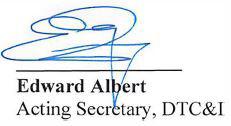
The Department of Transportation, Communications and Infrastructure (DTC&I), FSM National Government, is seeking an Architect to join the professional staff of the Program Management Unit in the coordination and implementation of the FSM Infrastructure Development Program. Interested candidates should provide information demonstrating that they have the required qualifications and relevant experience to perform the Services.
The Terms of Reference are attached and available online at https://www. tci.gov.fm/. Clarifications or further information can be sought from the PMU Administrative Officer at email eymcnz7@gmail.com
Expressions of interest must be delivered in a written form to the address below (in person, or by mail, or by e-mail) by 4:00 p.m. (1600 hrs)
Pohnpei Time on Friday, October 19th 2024
Robert Goodwin
Program Manager, Program Management Unit
Palikir, Federated States of Micronesia (FSM)
Tel: (+691) 320 2080
Email: Robert.goodwin@tci.gov.fm Web: www.tci.gov.fm

The Department of Transportation, Communications and Infrastructure (DTC&I), FSM National Government, is seeking a Civil Engineer to join the professional staff of the Program Management Unit in the coordination and implementation of the FSM Infrastructure Development Program. Interested candidates should provide information demonstrating that they have the required qualifications and relevant experience to perform the services.
The Terms of Reference are attached and available on line at https://www. tci.gov.fm/. Clarifications or further information can be sought from the PMU Administrative Officer at email eymcn27(@.gmail.com
Expressions of interest must be delivered in a written form to the address below (in person, or by mail, or by e-mail) by 4:00 p.m. (1600 hrs) Pohnpei Time on Friday, October 19th 2024
Robert Goodwin
Program Manager, Program Management Unit
Palikir, Federated States of Micronesia (FSM)
Tel: (+691) 320 2080
Email: Robert.goodwin@tci.gov.fm Web: www.tci.gov.fm


In an effort to empower and bless the lives of women living throughout the 16 volcanic islands of Chuuk, perhaps no organization has been more proactive than the Chuuk Women’s Organization (CWC).
Specifically, CWC works to help women to achieve healthier and more self-reliant lives by providing mobility aids, nutrition counseling, exercise opportunities, emotional support, and other important services.
Recognizing the critical value of CWC’s mission and efforts, The Church of Jesus Christ of Latterday Saints has made contributions to help extend the organization’s ability to serve the women of Chuuk.
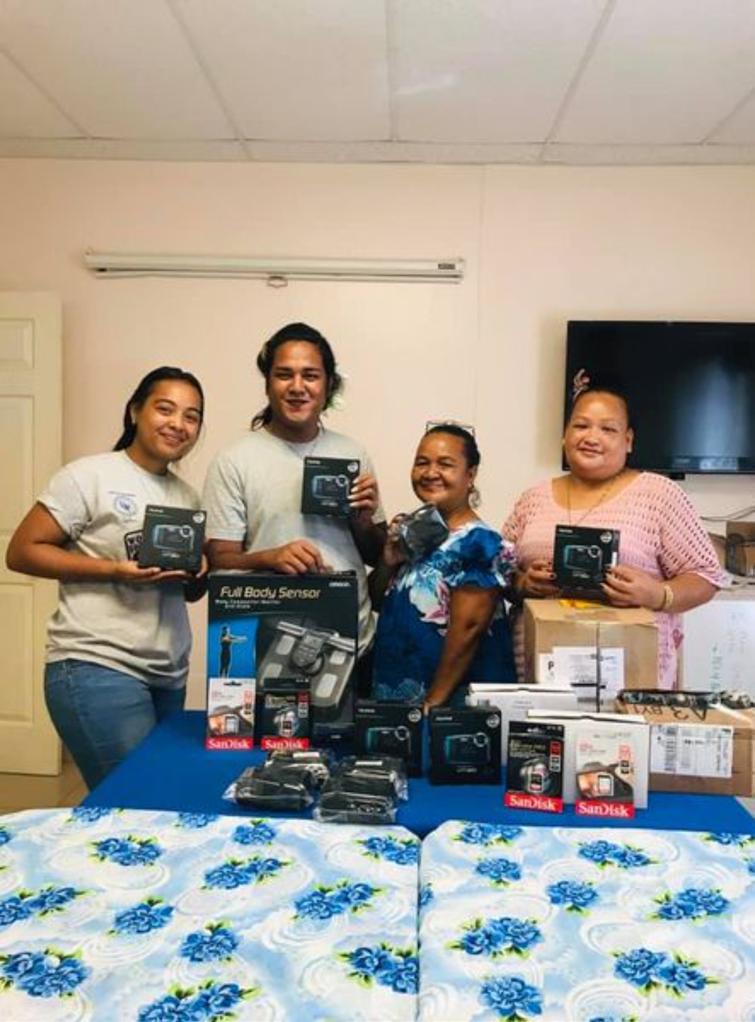
Among its contributions, the Church has recently donated 125 wheelchairs, several pairs of reading glasses, pedometers, and equipment to set up a Zumba class.
The wheelchairs were distributed throughout the Chuuk Islands and help many women to have increased mobility in their daily lives. More will be provided in the future.
Reading glasses help those with limited vision to read educational material that is provided by CWC. Dozens of pairs of glasses were donated.
A specific resource that the Church has made available, not just to CWC, but to all islanders living in Micronesia, is a program manual entitled, Eat Healthy and Be Active: A Pacific Diabetes Prevention Education Programme.

The manual is available in Chuukese, Kosraean, Pohnpeian, and English.
Helping and encouraging women in Chuuk to be more physically active has been a central goal of the CWC. Recently CWC sponsored a walka-thon, “10,000 Steps for Health” in which many in the community participated. To help in this effort, the Church contributed pedometers so that walking woman can count steps and measure their walking distance in meeting daily exercise goals.
“We want to help people to be more healthy and to get out and walk,” said Lidy Jane S. Aler, who assists her mother in directing the affairs of the CWC. Since the Walk-a-Thon, more people are walking now. They understand that they need to be active.” To promote these healthier practices, the CWC holds fairs to make people aware of healthy practices. “We have a street market with local, healthy food. The market features only local food, products, and services.” The market also includes a booth to promote family history for local residents.
Aler expressed CDC’s appreciation to Bill Davis and Brett Child who represent the Church of Jesus Christ’s humanitarian outreach in the Guam/ Micronesia area: “From my heart I want to say we couldn’t do all these things without your love and donations.”

September 23, 2024
Palikir, Pohnpei–– On September 23, 2024, T.H. Vice President Aren B. Palik received a delegation of Senators from the FranceVanuatu/Pacific Islands InterParliamentary Friendship Group to the FSM on the occasion of a courtesy call. The purpose of this courtesy call was to discuss matters of mutual interests to both countries.
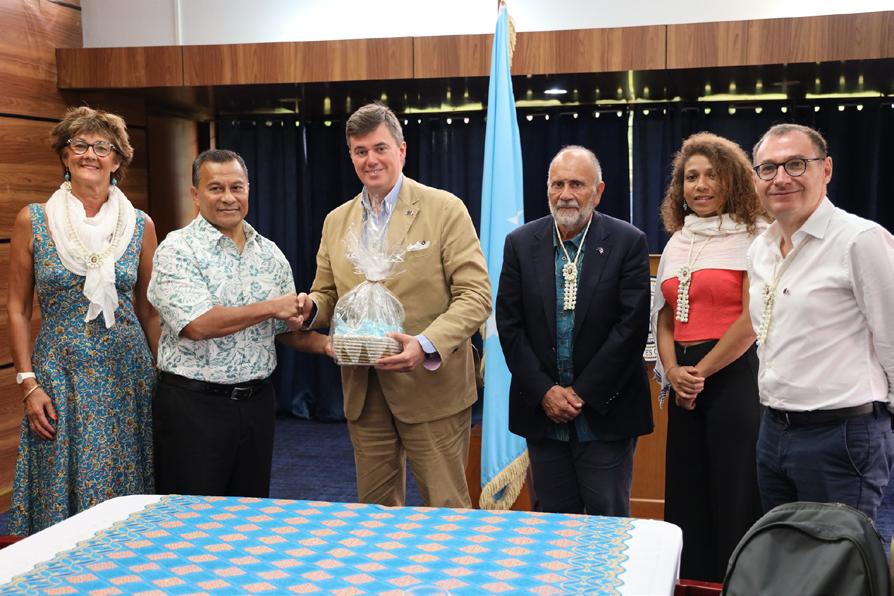
The delegation was led by Senator Christopher Andre Frassa, and accompanying him were Senator Annik Jacquemet and Senator Guy Bennaroche, along with two staff, Mr. Guillaume Gabison and Ms. Francesca Fontes.
The courtesy call commenced with exchanges of pleasantries as conveyed by Vice President Palik on behalf of President Simina, who the Vice President indicated that he was not able to receive the delegation due to other commitments he must attend to overseas. The meeting served as a crucial contact mission aimed at fostering dialogue and addressing regional tensions, particularly concerning the situation in New Caledonia, among others.
Vice President Palik noted that strengthening partnership is essential for addressing shared challenges and achieving mutual goals. He highlighted the importance of regional solidarity and the need for collaborative approaches to tackle shared challenges. To reinforce his point, Vice President Palik proceeded to make reference to the cornerstone of FSM’s foreign policy that we are “friends to all, enemy to none”, and added that we extend, “peace, friendship, cooperation and love in our common humanity to all”.
During the meeting, the Vice President and his special guests engaged in constructive discussions regarding the current geostrategic and political climate in the Pacific, focusing on the implications for Micronesia and its neighboring Pacific Island countries. There was a recognition of the importance of open dialogue/ communication and cooperation to promote regional stability and peace.
In light of recent developments in New Caledonia, the French delegation emphasized France’s commitment to respecting the aspirations of the regions’ inhabitants while ensuring constructive
engagements with Pacific partners. They stated “We believe that dialogue is essential in addressing the complexities of the region, and France is open for dialogue among Pacific nations”.
The French delegation also highlighted the importance of FSM’s support for French Polynesia’s aspirations within the PIFS, emphasizing the value of regional unity and cooperation in addressing shared challenges. For France, the inclusion of French Polynesia in PIFS is seen as a significant step toward fostering deeper connections and enhancing dialogue among Pacific nations.
The Vice President, in turn, expressed his heartfelt appreciation for France’s instrumental support in the recognition of Nan Madol, a site of immense cultural and historical significance not just to FSM and France, but to the world at large. This UNESCO designation not only honors the rich heritage of the region but also promotes sustainable tourism and preservation efforts that benefit local communities.
Vice President Palik also highlighted the benefits of establishing a European Union office in the Northern Pacific region, including increased support for sustainable development, environmental conservation, and cultural exchange. He further stated that the presence of and EU office would facilitate closer cooperation on critical matters such as climate change, renewable energy, and economic resilience.
In response, the French delegation reiterated its support for FSM’s aspirations by acknowledging the strategic importance of enhanced EU engagement in the Pacific. Both sides recognized that stronger ties with the EU could foster greater investment and collaboration across the region.
The meeting concluded with both sides agreeing to continue their dialogue and explore avenues for partnership that can strengthen regional cohesion and support stability in the Pacific.

**This post is only open for the Nationals of FSM**
Call to Action
• Are you result driven and can you work well in teams?
• Do you have a keen eye for detail and can you ensure high quality and accuracy of work?
• Can you multi-task, prioritize and manage programme outcomes? If so, this might be the job for you.
How You Can Make a Difference:
UNFPA is the lead UN agency for delivering a world where every pregnancy is wanted, every childbirth is safe and every young person's potential is fulfilled. UNFPA is seeking candidates that transform, inspire and deliver high impact and sustained results; we need staff who are transparent, exceptional in how they manage the resources entrusted to them and who commit to deliver excellence in programme results.
Job Purpose:
The Programme/Finance Assistant will provide programmatic and financial support in implementation of program activities ensuring full compliance of program and financial processes with UN/UNFPA rules, regulations, policies and strategies. S/He provides logistical support to programme implementation. S/He provides organizational functions of the office in terms of providing effective communications support to the Sub Regional office; ensuring facilitation of knowledge building and management. In addition, the incumbent contributesto basic programme/ research data for the management of the programme and in tracking progress of the programme implementation.
Qualification and Experience:
Your Education
• Completion of secondary level education or an equivalent is required.
• First level university (Bachelor) degree in Business Administration, Commerce, Accountancy, Chartered Accountancy and related fields is desirable.
Your Experience
• Minimum of five (5) years professional experience in similar role;
• Some experience in research assistance and general understanding of programme support, monitoring and evaluation is desirable;
• Good writing and communication skills with the ability to draft correspondence in a clear, accurate and concise manner;
• Previous experience and knowledge of protocol in the United Nations is an advantage,
• Good interpersonal, planning, organizational and multi-tasking skills;
• Ability to work independently and harmoniously in a multi-cultural and multiethnic team environment maintaining tact and discretion in all dealings;
• Computer literacy - Proficiency in the use of MS Office Packages and the Internet;
• Good knowledge of Atlas/PeopleSoft is an asset.
Full job description of the position and instructions on how to apply can be accessed on: https://pacific.unfpa.org/en/vacancies
Closing Date: Tuesday, 22 October 2024. The selected individual should be prepared to assume the post within one (1) month.
Notice: UNFPA does not charge any application, processing, training, interviewing, testing or other fee in connection with the application or recruitment process. UNFPA is committed to achieving workforce diversity in terms of gender, nationality, and culture. Individuals from minority groups, indigenous groups and persons with disabilities are equally encouraged to apply. All applications will be treated with the strictest confidence. UNFPA does not tolerate sexual exploitation and abuse, any kind of harassment, including sexual harassment, abuse of authority and discrimination. All selected candidates will, therefore, undergo rigorous reference and background checks. Only shortlisted candidates will be contacted for the next phase of the selection process.

September 23, 2024
Alofi, Niue- Economic and financial constraints, followed closely by social, cultural, and political pressures, pose the greatest threats to media freedom in the Pacific, according to the inaugural Pacific Islands Media Freedom Index (PIMFI) report, For Us, By Us, About Us.
Published by the Pacific Freedom Forum (PFF), a coalition of Pacific journalists formed to promote and project media freedom in the island states, the PIMFI found that a ‘“whopping 60 per cent of journalists often practiced self censorship due to fear of re-prisals from their communities, families and others including in some cases, their governments”
In a global first the PIMFI ranks all 14 Pacific Islands nations’ according to the state of media freedoms as experienced by newsrooms in each country.
Launched this week as Pacific journalists and publishers gather for the 2024 Pacific Media Summit in Niue, the index is based on the responses of 73 editors, journalists,
and media workers, many of whom have spent decades reporting the Pacific.
These responses were then used to assess the state of media freedoms in each country across five rankings, from significant challenges to media freedom to the highest: a robust and enabling environment for media freedom.
Palau, Niue, and the Cook Islands are ranked as the three top Pacific nations for media freedom in 2023 while Nauru, Papua New Guinea, and Tuvalu scored the lowest according to this index.
PFF’s current Chair Robert Iroga, editor of Solomons Business Magazine, welcomed the PIMFI report as an important first step.
“The inauguration of a Pacific Islands Media Freedom Index (PIMFI) signifies a signifi-cant achievement for all Pacific Islands journalists. We at PFF and our partner, In-ternews, have only been able to coordinate this work because 73 individuals stepped up and took the time to share the reality of their professional lives with us and have their say,” Iroga said.
Published with the support of the global media-strengthening NGO, Internews, the PIMFI was collated from a survey conducted by PFF earlier this year that asked Pacific newsrooms their experience in relation to 12 issues that potentially impacted media freedom in their country last year, including the legal framework, political context, eco-nomic pressures, safety of journalists, and the social and cultural environment.
Economic and financial pressures on Pacific media houses, including those from advertising, capital costs, subsidies, administration, fiscal pressure, corruption incentives, and bribes, were ranked as the top challenge to Pacific media freedom.
Social and cultural pressures on the media, including gender, public trust and credibility of the news industry, diversity, nepotism, and cultural sensitivities, ranked second.
Political and legal pressures were of significant concern, with political pressures—including State policy, the editorial balance of public media, licensing policies, and elections—ranking third and legal pressures ranking a close fourth.
For Us, By Us, About Us was launched by PFF’s three co-chairs who rotate the leader-ship: Robert Iroga, (Melanesia), Leilani Reklai (Micronesia) and Katalina Tohi (Polyne-sia).
Iroga, the Vice President of the Pacific Islands News Association (PINA), thanked Pacific Media Summit organizers in Niue for the opportunity to host the PIMFI launch.
“For decades, our Pacific Islands have been barely visible in global media freedom re-ports,” he said.
“PFF and PINA are the only two Pacificled networks linked to the global freedom of expression family, and we will continue to collaborate and work on media freedom, and our next report in 2025,” he said.
Iroga stresses that this first PIMFI is a pilot and that PFF is keen to work with Pacific media colleagues to refine and improve it ahead of next year’s survey and index.
“This is a journey that must be led for us and by us, because it is about us.”


Tokyo—H.E. Wesley W. Simina, President of the Federated States of Micronesia, joined fellow Pacific leaders at the 10th Pacific Island Leaders Meeting (PALM10) recently held in Tokyo, Japan in July. The meeting, co-chaired by the Honorable Fumio Kishida, Prime Minister of Japan, and the Honorable Mark Brown, Prime Minister of the Cook Islands, brought together Pacific Island Forum (PIF) Leaders to discuss regional cooperation and development. This marked President Simina's first attendance at PALM as the leader of the FSM.
President Simina commended the Government of Japan for its unwavering commitment to enhancing people-to-people exchanges between PIF members and Japan under the PALM framework. He acknowledged various programs such as the JENESYS Student Exchange, the Japanese Exchange and Teaching (JET) Program, and the Monbusho Scholarship Program, which have provided invaluable opportunities for Micronesian youth and professionals. These initiatives, President Simina noted, are in line with the Pacific’s 2050 Strategy, aimed at fostering closer regional ties and sustainable development.
Addressing the region’s healthcare challenges, President Simina underscored the need to strengthen resilience and preparedness for future health crises, including pandemics and climate-related disasters. He highlighted FSM’s commitment to universal health coverage, recently adopted during the 2024 FSM Health Summit, as a vision for the next decade. President Simina expressed the FSM’s readiness to collaborate with development partners, including Japan, to address shortages of trained medical personnel and improve overall healthcare services.
The President also spoke about the FSM government’s efforts to promote women’s leadership and participation in governance, highlighting recent nominations of women to key leadership positions, both in his cabinet and in overseas missions. President Simina reaffirmed the FSM's dedication to providing equal opportunities for all, with an emphasis on inclusive decision-making that benefits society as a whole.

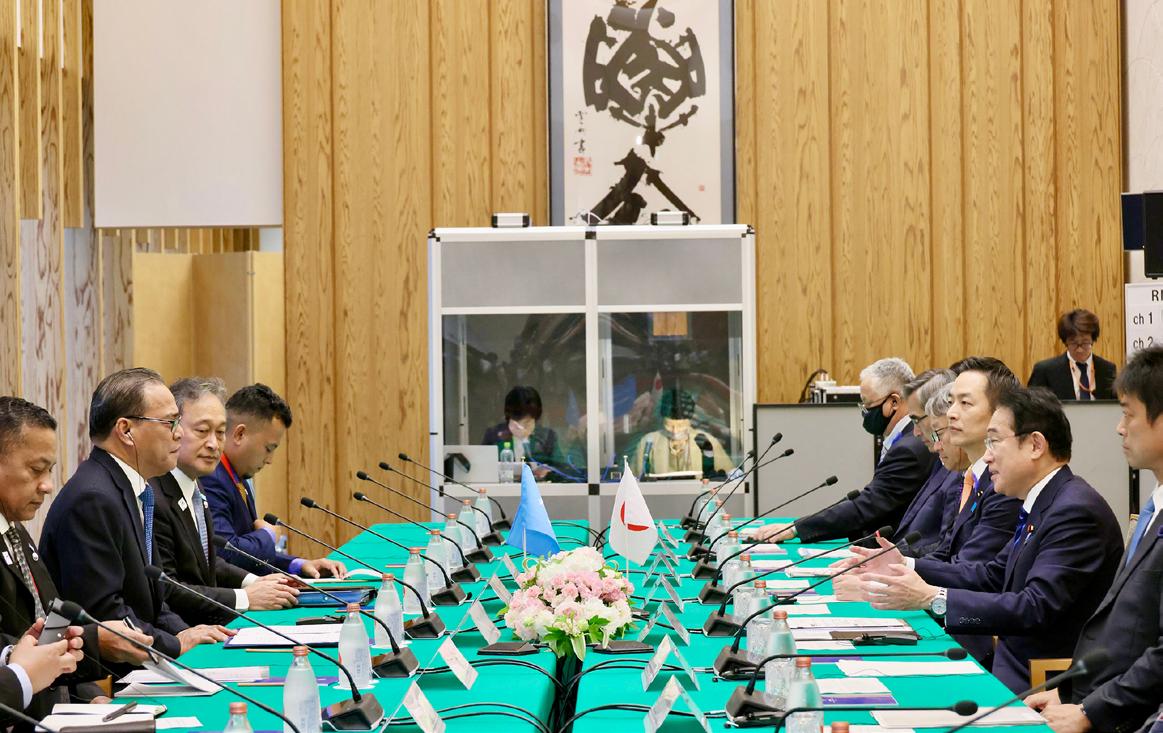
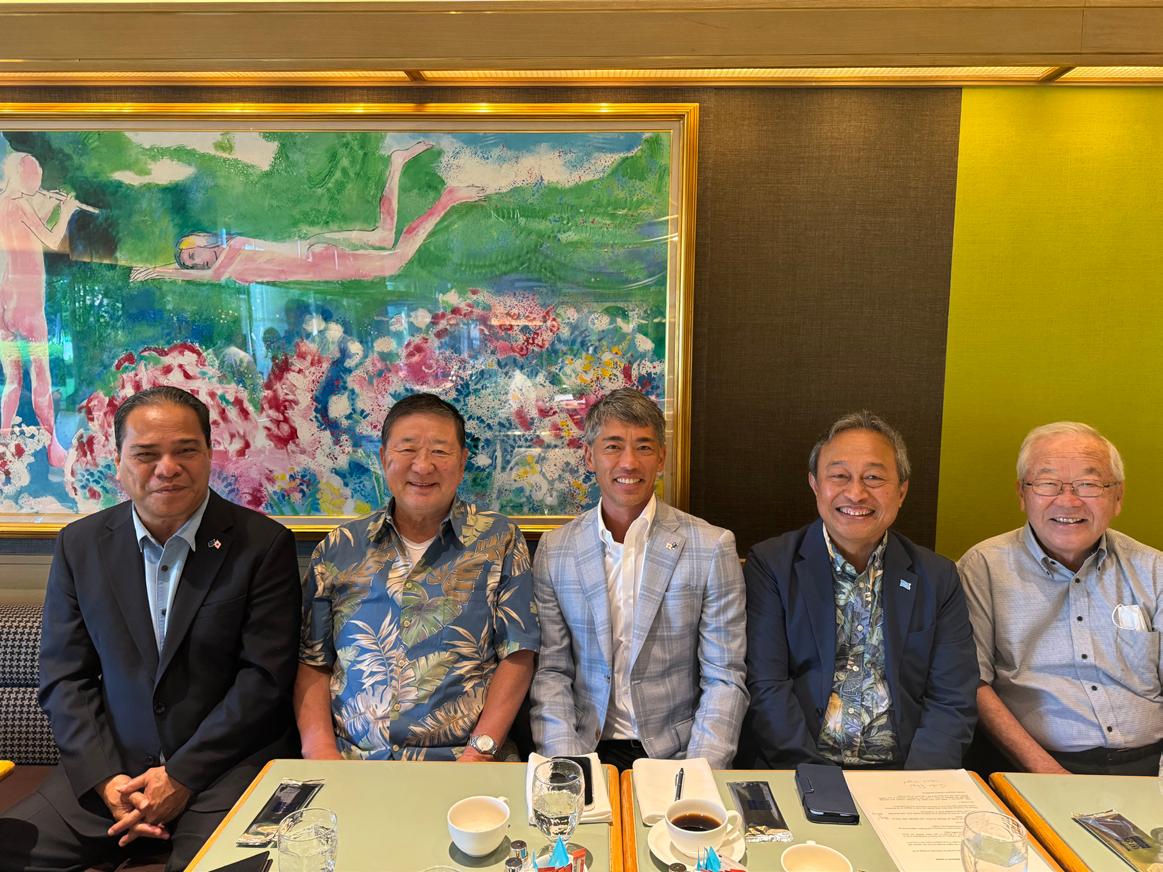
President Simina thanked Japan for its continued support in the installation of critical infrastructure projects, such as the East-Micronesia Cable (EMC) and other subsea cables. These projects are expected to enhance health services and education in FSM by improving connectivity across the region.
President Simina reiterated FSM’s commitment to working closely with Japan and other PIF members to address shared challenges and opportunities. He emphasized that Japan, as a fellow island nation, plays a crucial role as a development partner in advancing the Pacific region’s collective goals.
The PALM10 meeting serves as a vital platform for Pacific Island leaders and Japan to strengthen their partnerships and reaffirm their commitment to sustainable development, focusing on the needs of the people in the region.
Following his participation at PALM10, President Simina continued onto official visits to Kochi and Osaka prefectures, emphasizing the importance of people-to-people exchanges and building lasting partnerships from the ground up.
for Professional Consulting Service for the Construction Administration of the College of Micronesia Kosrae MultiPurpose Building, FSM, College of' Micronesia, Kosrae Campus
The Program Management Unit (PMU) of the Departmcnt of Transportation. Communications & Infrastructure (DTC&I ). National Government of the federated States or Micronesia is hereby issuing this Bid Invitation Notice to qualified consultants for the Professional Consulting Service for the Construction Administration of the College of Micronesia Kosrae MultiPurpose Building, FSM, College of Micronesia, Kosrae Campus.
Further information on this ITB may be obtained by submitting a written request for details to Mr. Shankarah Lessey. Contract Specialist. DTC&l. P.O. Box PS2. Palikir. Pohnpei. FM 96941 at email shankarah.lessey@gmail. com with the subject heading:
“Professional Consulting Service for the Construction Administration of the College of Micronesia Kosrae MultiPurpose Building, FSM, College of Micronesia, Kosrae Campus”
The bidding documents. including the instructions to bidders. scope or work and conditions or contract may also be directly obtained from the Department’s website: https://www.tci.gov.fm/ in its PMU section.
The closing date for the submission of bids is Thursday October 31st at 4pm local Pohnpei Time.

The 10th Pacific Islands Leaders Meeting, PALM10, successfully convened on July 18, 2024, culminating in the adoption of “Japan-Pacific Islands Forum Leaders’ Declaration” coupled with “Joint Action Plan.” In the Declaration, Japan and the Pacific Islands Forum (PIF) Leaders (collectively, the PALM Partners) committed to closely collaborate over the next three years seven priority areas of cooperation, aligning with the thematic pillars outlined in the 2050 Strategy. The Joint Action Plan details the specific actions Japan and PIF members will jointly undertake over the next three years in these seven priority areas: (1.) Political Leadership and Regionalism, (2.) People-Centered Development, (3.) Peace and Security, (4.) Resources and Economic Development, (5.) Climate Change and Disasters, (6.) Ocean and Environment and (7.) Technology and Connectivity.
With respect to the FSM, I believe that priority area (2.), People-Centered
Development, is particularly important as it directly pertains to the “Kizuna”(bond) that Japan and the FSM values deeply. To this end, Japan intends to further promote youth exchange between Japan and the FSM through various ways such as the Japan-East Asia Network of Exchange for Students and Youths (JENESYS), the Children Exchange Program with Micronesian islands, activities of Japan Overseas Cooperation Volunteers (JOCVs) and other efforts aimed at strengthening Kizuna through grassroots and sports exchanges. In addition, the importance of the priority area (7.), Technology and Connectivity, cannot be overemphasized. Japan will continue to develop quality infrastructure in the FSM, such as seaports, in line with the Pacific Quality Infrastructure Principles, and enhance the FSM’s connectivity within and beyond the Pacific Islands region in cooperation with other like-minded international partners through subsea fiber-optic cable projects. It is imperative to note that, fulfilling commitments in practice is far more crucial than merely making them in the meeting room. Over the next three years, I will strive to implement the commitments made by the Palm Partners in response to the FSM’s needs, with full respect for its sovereignty, strategies, policies and processes.
Taking this opportunity, I would like to highlight two significant events that

occurred following PALM10. The first is the Japan-FSM summit meeting between Prime Minister Kishida and President Simina, where the two leaders exchanged views on various issues and reaffirmed “Kizuna” that has been built and nurtured between the two countries for over a century. The second is the President Simina’s visit to the Kochi, Hyogo and Osaka prefectures, after PALM10, which has positively impacted the promotion of people-to-people exchange at the grassroots level, further fostering “Kizuna” between the people of the FSM and those in Kochi, Hyogo and Osaka prefectures. I am clearly aware of my responsibility to follow up on the outcomes of these events, along with the achievements of PALM10, and I am committed to working closely with the FSM government to realize these results.
It is worth noting that since its inception in 1997, the PALM process has played a significant and pioneering role not only in enhancing “Kizuna” between Japan and the Pacific region but also in contributing to the development of the Pacific Islands in various dimensions. While the opinions differ on the reason behind the great success of the PALM process, I firmly believe that its success lies in its alignment with the aspirations of the Pacific Island countries and territories, including the FSM, to cooperate with all partners who share their objectives
based on regional priorities and respect for regional unity. This, in my view, is the secret of the PALM process’s success. With this aspiration in mind, as the Ambassador of Japan to the FSM, I am dedicated to making every effort to follow up on and realize the aforementioned achievements, thereby ensuring the continued development of the FSM over the next three years.
Ambassador KAGOMIYA Nobuo Japanese Ambassador to the FSM
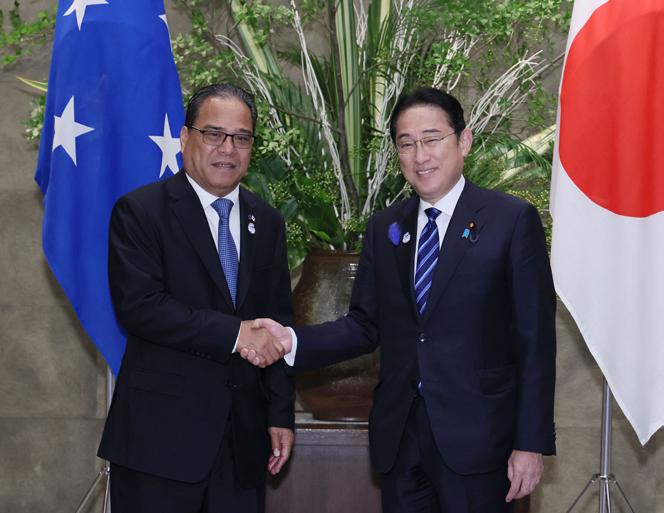
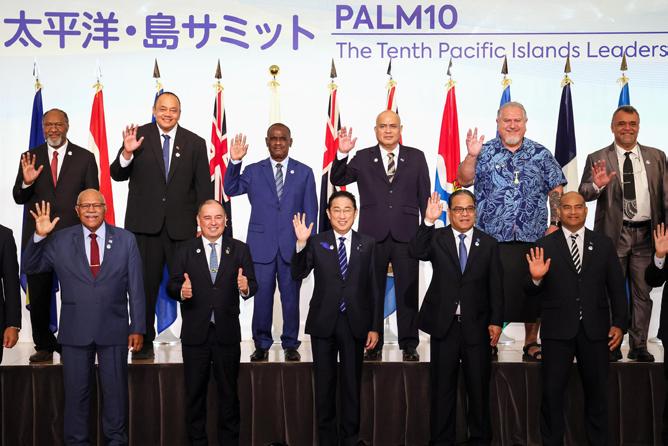
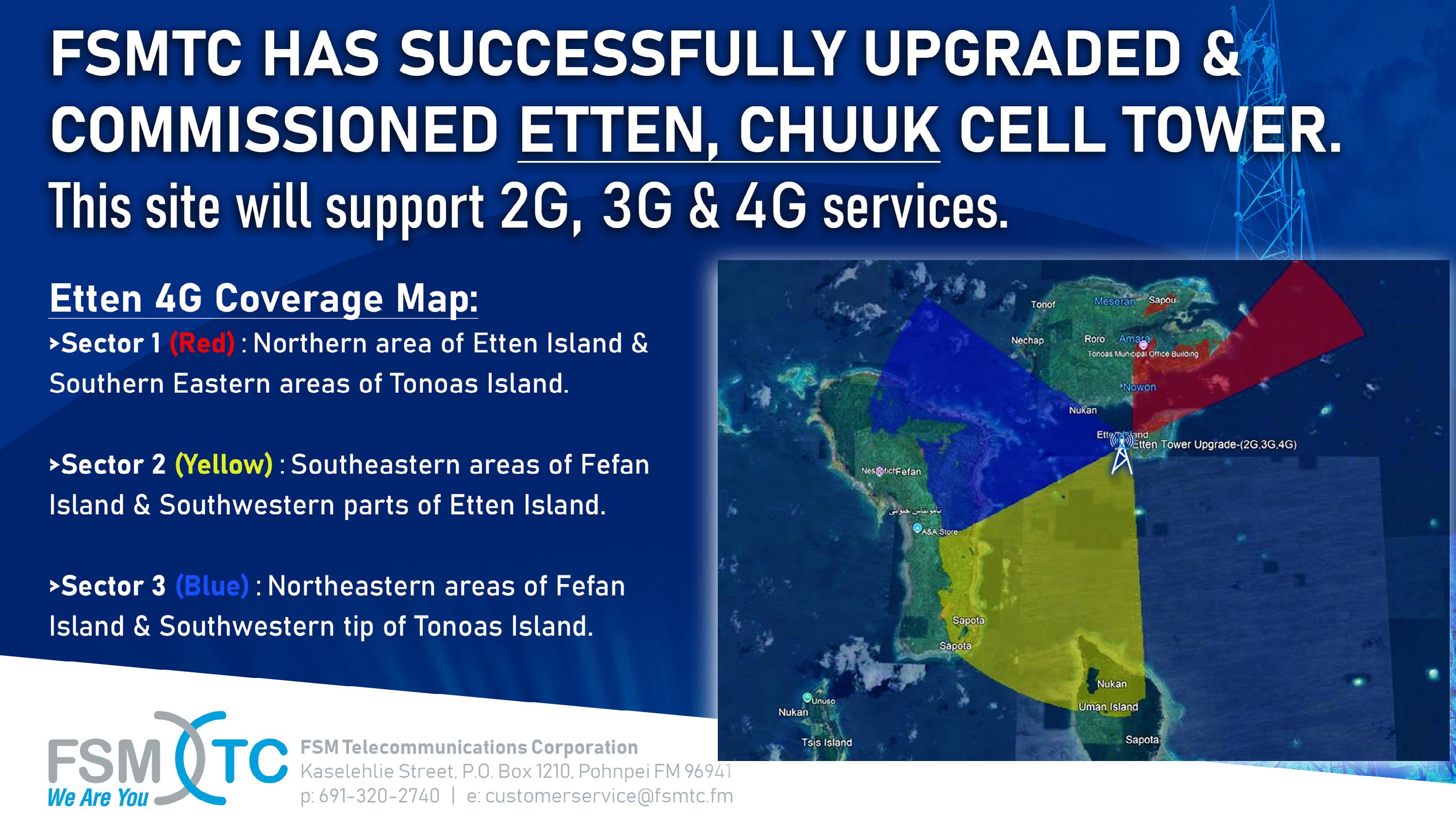

As Governor, my foremost duty is to serve the people of Pohnpei with integrity, fairness, and transparency. I have always believed that government, in all its functions, should be accountable to the people we are elected to represent. However, recent actions taken by the Legislature—particularly in their handling of matters involving our Director of Treasury—raise serious concerns about adherence to the principles of transparency, fairness, and due process.
While I fully respect the Legislature’s role as a co-equal branch of government, any investigation or inquiry into the actions of public officials must be conducted through proper channels and with the transparency our people deserve. The recent decision by members of the Legislature to initiate an investigation into the Director of Treasury, without formally informing the Office of the Governor, violates these fundamental principles.
The Importance of Due Process In any democracy, there are procedures in place to ensure that investigations are conducted fairly and transparently. These procedures exist not only to protect the rights of individuals under scrutiny but also to maintain the integrity of the institutions tasked with overseeing them. Unfortunately, the current situation reflects a failure to uphold these basic standards.
As Governor, I have not been formally informed by the Legislature of any ongoing investigation into the Director of Treasury. Even more concerning is that the Director herself was contacted without my office being copied or notified—a departure from standard practices of intergovernmental communication. This lack of formal procedure raises questions about the of the inquiry and the motives behind it.
I want to make it clear: I am not opposed to any legitimate investigation, especially if it serves the public interest. However, any investigation must be grounded in fairness and follow the appropriate legal protocols. Such matters must be handled in a way that preserves public trust in our institutions, rather than eroding it through
actions that appear personally politically motivated or conducted behind closed doors.
To ensure transparency, I have formally requested clarification from the Legislature regarding their intentions and the nature of their communications with the Director of Treasury. This is not only a matter of professional courtesy but a requirement of good governance. I have taken this step to ensure that we are upholding the principles of transparency and cooperation that our people expect from us.
I stand by the Director of Treasury, whose record of service speaks for itself. She has worked tirelessly to ensure the sound management of our state’s finances, and she deserves the respect of an inquiry that is fair and impartial—one that follows the laws and procedures we have all agreed to uphold. We cannot allow any individual or institution to be subject to investigations that are shrouded in secrecy or driven by political and/or personal interests.
I hope that, by shedding light on this issue, we can remind everyone in government of the importance of unity and mutual respect. Investigations, when necessary, must always be conducted in a spirit of collaboration, not division. This is not just about protecting one individual; it is about protecting the integrity of our entire system of governance.
A Call for Accountability and Fairness
I call on the Legislature to work with my administration, not against it, to ensure that any inquiries are handled appropriately. The people of Pohnpei deserve nothing less. We are all here to serve you, and you have a right to expect that we do so with honesty, integrity, and transparency.
By respecting due process and fostering open communication, we strengthen the foundation of trust between the government and the people. As your Governor, I remain committed to these principles, and I will continue to stand up for what is right and just for all of us.
Let us move forward in a manner that serves the public interest, upholds the rule of law, and strengthens the bonds of trust that unite us as a people. Thank you for your continued trust and support.
Sincerely,
Stevenson A. Joseph Governor State of Pohnpei
In these uncertain times, the strength and stability of our institutions are critical to the long-term prosperity of our State. One of the most vital pillars of any government is its financial management. This is not just a matter of dollars and cents but of trust, accountability, and our collective future. For Pohnpei, the cornerstone of this effort is ensuring that our financial systems and operations are aligned with the Financial Organization and Management Act of 1987—a law designed to safeguard transparency, accountability, and fiscal responsibility.
This is why it was not a decision made lightly when I nominated Mrs. Sihna N. Lawrence to serve as Director of Treasury and Administration. Mrs. Lawrence’s experience, integrity, and unyielding commitment to compliance with the Financial Organization and Management Act made her the most qualified person for this critical position. The 11th Pohnpei Legislature agreed with this assessment, giving its advice and consent to her confirmation.
However, it has come to my attention that Mrs. Lawrence is now the subject of an investigation by the Legislature, for reasons that have yet to be formally communicated to my office. This investigation, which lacks a clear basis, threatens to undermine not just her reputation but also the essential functions of our government. The timing and nature of this inquiry raise serious concerns, especially when the focus should be on strengthening, not destabilizing, our financial stewardship.
Let us be clear: the Financial Organization and Management Act is the bedrock of our financial governance. It establishes protocols that ensure every dollar spent is properly accounted for, every process is transparent, and every action is held to the highest standards of accountability. It is a law that, if adhered to with diligence and integrity, prevents corruption, inefficiency, and misuse of public funds. Mrs. Lawrence, throughout her tenure, has done nothing less than ensure that this
law is strictly followed. Her leadership has strengthened our financial systems, improved transparency, and maintained the trust of both the public and our external partners.
Mrs. Lawrence has been an unwavering guardian of these principles, even when it required difficult decisions. Her dedication to enforcing the Financial Organization and Management Act is precisely why she was nominated and why the Legislature, in its wisdom, confirmed her. At a time when fiscal discipline is more crucial than ever, we need strong leadership that puts the law—and the people of Pohnpei—first.
I firmly believe that a Treasury Director’s role is not to curry favor or bend to political pressures but to serve as the State’s chief steward of public resources. This requires an individual who not only understands the complexities of financial management but also has the moral courage to ensure that the law is followed to the letter—no matter the consequences. Mrs. Lawrence embodies these qualities, and her record speaks for itself.
The investigation into her conduct, absent any formal communication with my office or clear evidence of wrongdoing, is deeply troubling. It raises questions about whether this process is genuinely in pursuit of the public interest or if it is a diversion from the real issues facing our State. I urge the 11th Pohnpei Legislature to reconsider the direction of this investigation and to focus on supporting those who work tirelessly to uphold the laws that protect the integrity of our government.
In closing, let me reiterate that the role of the Treasury Director is not just about managing our finances but about safeguarding the trust that the people of Pohnpei have placed in their government. Mrs. Lawrence has proven herself to be a capable and dedicated leader who understands that financial integrity is non-negotiable. Her commitment to enforcing the Financial Organization and Management Act is precisely what we need in this critical role, and it is why I continue to stand by her.
The people of Pohnpei deserve nothing less.
Stevenson A. Joseph Governor State of Pohnpei

October 6, 2024 is a significant milestone for Japan, marking 70 years since its commencement of Official Development Assistance (ODA) in 1954. Over these seven decades, as a major global partner, Japan has extended its cooperation programs to 190 countries and regions, contributing to their economic and social development as well as peace and prosperity in the global community.
Japan’s international cooperation efforts began, in parallel with the payment of postwar reparation to Asian states, with the aim to rebuild trust within the international community. Starting with providing technical training programs to Asian states and expanding its cooperation programs, Japan has become one of the leading bilateral development partners in the world.
The Japan International Cooperation Agency, JICA, is responsible for administrating Japan’s ODA, offering a wide variety of cooperation programs, including finance and investment cooperation, technical cooperation, and other services including emergency aid and the dispatch of volunteers.
In synergy with the domestic initiatives of recipient countries, JICA’s cooperation programs, such as those for infrastructure development and human resources development, have laid a solid foundation for their development. In Thailand, for example, eastern seaboard development facilitated by Japan’s yen loans and technical cooperation in 1980s attracted the automobile industry to Thailand, which in turn has fostered manufacturing and trade throughout the region. Another prominent example is JICA’s agricultural cooperation, by which rice production in African states has been doubled and enhanced food security in
the region. <Add by respective JICA overseas office, in accordance with local situation>.
It has been the fundamental principle of JICA to respect ownership and selfhelp efforts of the partner country and to put strong emphasis on unwavering commitments with a long-term vision. JICA highly values people-to-people interactions, bringing strengths together through dialogue, rather than the unilateral transfer of technology and knowledge. This approach enabled us to offer solutions tailored to local contexts and foster human resources necessary for the sustainable growth of a country. It has also deepened mutual understanding and trust, and thereby strengthened bilateral relations between JICA’s partner countries and Japan.
Despite the significant efforts by the international communities, many global challenges remain unresolved. Rather, issues such as climate change, armed conflict, pandemics, natural disasters, economic crises, and other threats have become more complex and interlinked, leading to the compound crises. A UN report warns that only 17% of the Sustainable Development Goals (SDG) targets are on track to be achieved, with only 6 years remaining until the target year, 2030. The international community needs to work harder and more closely than ever to overcome these compound crises.
In response to the changing global landscape, the Government of Japan revised its Development Cooperation Charter in June 2023 to update its development cooperation to be implemented in a more effective and strategic manner.
In the revised charter, human security is positioned as the guiding principle that underlies all of Japan’s development cooperation. Human security refers to a state in which people, as individuals, are free from fear and want and can live with dignity. In the midst of this compounded crises, many people find their human security threatened; critically, vulnerable people in developing countries are the most seriously affected. As the development cooperation agency of Japan, JICA is further committed to ensuring human security by its efforts for poverty reduction through quality growth.
To achieve these goals, JICA is evolving its cooperation program to engage diverse actors and facilitate collaborative work in development efforts. There are enormous unresolved development issues, and many of them remain without clear solutions. The complexity of the development challenges requires innovative solutions that emerge from collaborations among the public sector, private sector, academia, and other stakeholders. In addition, it is not the exclusive role of developed countries to lead global transformations, as many developing countries have experienced remarkable economic development and start-ups have entered the global market from developing countries. Given this situation, one of the critical keys to accelerating efforts to address development issues is for ODA to function as a catalyst for collaboration to harness the wisdom and technology of these diverse sectors. ODA is expected to play a crucial role in realizing and promoting such co-creation. Building reciprocal relationships through continuous dialogues with partner countries to create solutions is a strong tradition of Japan’s cooperation, and JICA is ready to advance co-creation by leveraging the tradition.
JICA’s vision is “Leading the World with Trust”. Our development cooperation has been focusing on human security, equal partnerships, and self-ownership by developing countries. We are committed to continued cooperation with developing countries and likeminded development partners. In a world of disruptions, it is important to maintain the values we consider essential, and that we respond to new challenges in a new way together, building on the trust that Japan has built over the years.
Dr. Tanaka JICA President
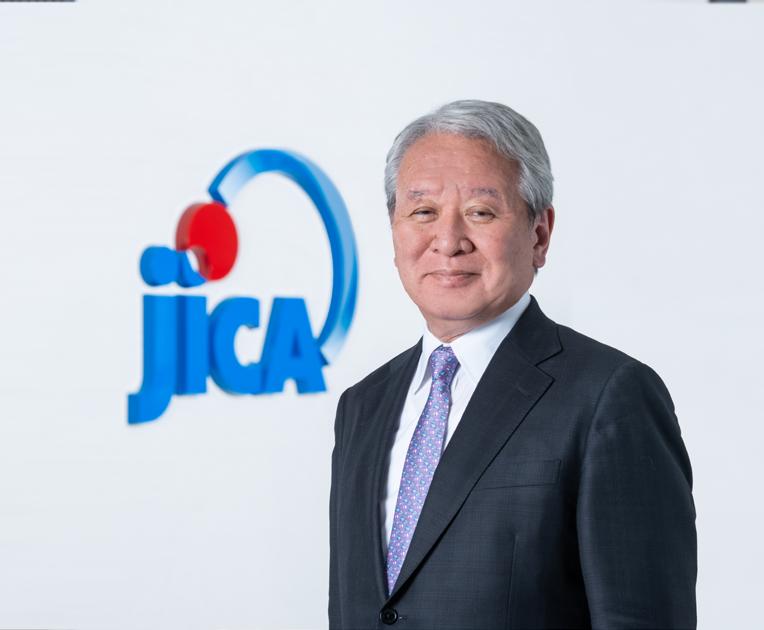
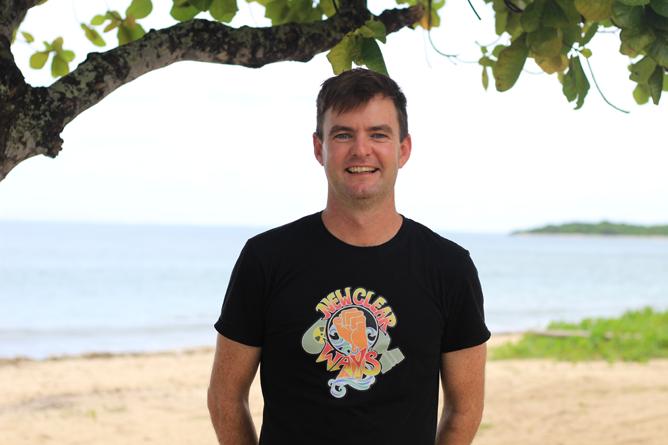
As members of the World Trade Organization (WTO) continue to discuss how to reign in subsidies that contribute to overfishing and overcapacity, the balance between sustainability and development remains central in ensuring any outcome is in the interests of communities and developing countries.
Following the failure of the membership to find an acceptable agreement at the 13th Ministerial Conference in February this year in Abu Dhabi, negotiations continue in Geneva with the General Council meetings being seen as the forum to conclude the talks.
Yet the rush to conclude is resulting in a text that is agreeable to, and effectively absolves of any commitments, the biggest subsidisers and those with historical responsibility for overfishing.
The issues with the current approach was highlighted at the recent WTO Public Forum in a session presented by the Norwegian Trade Campaign (Handelskampanjen) and the World Forum of Fish Workers and Fish Harvesters (WFF).
In a panel, delegates and representatives were told of the need to ensure a meaningful outcome that prohibits subsidising overfishing and overcapacity while supporting development, livelihoods and sustainability.
The concerns of Developing countries

FSM Information Services
September 26, 2024
Palikir, Pohnpei––The Honorable Aren B. Palik, Vice President of the Federated States of Micronesia, received in a courtesy call the Honorary Consul of the FSM in the Republic of the Philippines, Mr. Floyd P. Tiu-Laurel, at the Office of the President in Palikir.
During the meeting, Vice President Palik and Honorary Consul Tiu-Laurel discussed strengthening bilateral relations between the FSM and the Philippines. Both parties recognized the longstanding friendship between the two nations, emphasizing the shared commitment to expanding existing areas
Continued from previous page
The concerns held by some developing countries, especially those with extensive coastlines, large populations of artisanal fishers, and development aspirations, highlighted the imbalance in the burden of the agreement.
Ms Anisa Farida, First Secretary of the Indonesian Mission, the obligations from any outcome must not undermine the food security of Indonesia nor the other Sustainable Development Goals (SDGs) that the country is trying to implement.
To do this the balance of the commitments must look to strengthen the current 'best-endeavour' approach to stopping subsidies for distant-water fishing as well as reflect the realities of countries like Indonesia and not just adopt an approach of using aggregate subsidies levels. Such an approach ignores the dynamics that impact subsidy amounts like Exclusive Economic Zone size, total population and coastline length.
Further, the inclusion of the ‘Common But Differentiated Responsibility’ principle, a principle that states those most responsible for the issue take on the biggest responsibility to resolve it, is touted inside this agreement yet is merely reflected through different levels of notification obligation and a tiered approach that fails to capture the real culprits.
of mutual cooperation such as in the fields of agriculture, medical referral, labor mobility, and capacity building opportunities in the Philippines.
Vice President Palik expressed appreciation, on behalf of President Simina, for the valuable contributions of the FSM Honorary Consul in the Philippines in fostering these important ties binding our two nations. He thanked Mr. Tiu-Laurel for the Laurel Family’s dedicated service in promoting the interests of Micronesians residing in or visiting the Philippines.
Honorary Consul Tiu-Laurel highlighted the reviving collaboration between the private sectors of the
FSM and the Philippines and discussed potential opportunities for increased economic and technical engagement for mutually beneficial gains. He also reiterated his commitment to continuing his brother’s work in supporting the FSM’s initiatives and fostering positive relations with key stakeholders in the Philippines.
The meeting concluded with both sides reaffirming their commitment to maintaining the strong relationship between the two countries and in exploring other opportunities for partnership and cooperation.
The courtesy call marks another
Abu Dhabi.
At the fisher level, the challenges faced in securing livelihoods will be exacerbated by the inability to reign in the big fleets that overfish under the proposed texts.
Mr Alieu Sowe, National Coordinator for the Gambian Fisher Folks Association, highlighted the many concerns about the text, its limited flexibilities for developing countries and perpetuating the existing power dynamics in the oceans.
Ultimately, small-scale fishers are calling for more effective measures to curb industrial fishing subsidies and better support for sustainable small-scale fishing practices, something not present in the current text.
While small-scale fishers are dealing with the many complex and nuanced challenges facing them, the politics of the negotiations are resulting in a failure to address the main objectives.
Ms Helene Bank, the special adviser to the Norwegian Trade Campaign, called on the WTO to be serious about the obligation it took from the United Nations Sustainable Development Goal 14.6, and deal with those fleets and fishing gear that has created the overfishing problem and continues to constitute the overcapacity.
But, despite a strong demand for targeting big fleets in the high seas amongst most countries, especially in the Pacific and Africa, it was once again India that was blamed for “blocking” an agreement in 13th Ministerial Conference (MC 13) in
milestone in the FSM’s ongoing efforts to build and strengthen diplomatic relations both regionally and globally and in highlighting the continuing importance of the Honorary Consulate in the Philippines in advancing FSMPhilippines bilateral relations.
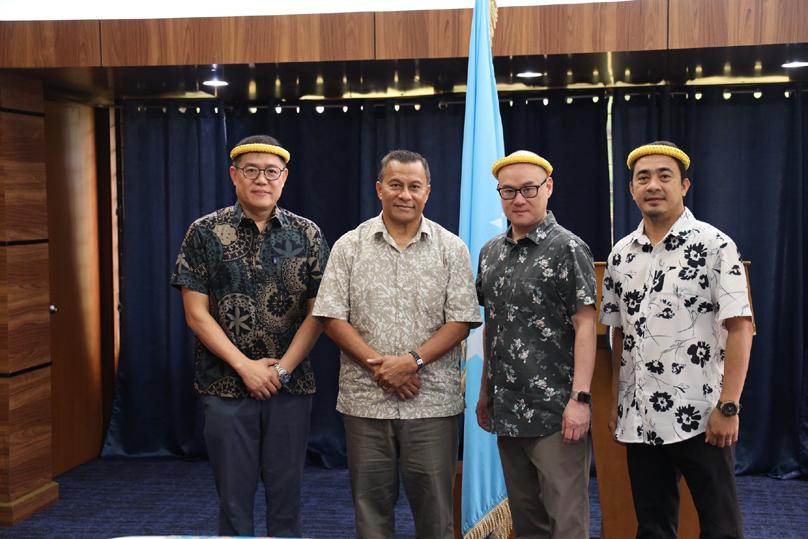
While this approach may continue the never-ending part of the power game in the WTO, others, like Papua New Guinea's Trade Minister Richard Maru have called out the big influential foreign fishing nations who are not prepared to remove harmful fisheries subsidies for the inability to conclude the talks.
For the negotiations to have the greatest impact, the outcome will need to fulfill and uphold a number of existing international principles. The Sustainable Development Goal (SDG) 14.6 contains a mandate for the negotiations, but there are other SDGs, namely those associated with food security and development, that are at risk if the burden of the commitments are borne by small-scale fishers and developing countries.
Further the principle of “Common-ButDifferentiated-Responsibility”, used in many international treaties that address sustainability issues, must be upheld, because failure to target those most responsible for overfishing would see the WTO preside over an agreement that undermines internationally accepted treaty approaches to sustainability.
The current proposals on special and differential treatment, a mechanism designed to acknowledge the capacity constraints of developing countries and as such require lower levels of commitments, set about rewriting those
principles.
Some Least-Developed Countries (LDC) in this instance may face the steepest challenges in complying with their obligations, especially once they graduate from LDC status, which is in the near future for Bangladesh and Myanmar. The text also risks capturing small-scale fishers in the prohibitions, undermining their ability to receive government support, despite them being the least responsible for overfishing.
So, while the talks at the WTO continue, for some there is a sense of disappointment about the failure to conclude at the 13th Ministerial Conference in February and then at the July General Council, however this may actually be cause for positivity. While many countries appear to be able to live with what is on the table, more would like to see the prohibitions tightened, especially on the big fleets.
This leaves negotiators with a chance to get it right and make it a deal that people are happy with instead of something they are content to live with. There is now time to reconsider what isn't working in the negotiations and realign the talks with the principles mentioned above to land on a balanced outcome to target those undermining sustainability and uplifts the development potential of developing countries and communities.
Adam Wolfenden
Deputy
Coordinator
of the Pacific Network on Globalisation (PANG)

October 6, 2024
Corsicana, Texas & Honolulu, Hawaii—As part of his ongoing commitment to engage with Micronesian citizens abroad, His Excellency President Wesley W. Simina conducted citizen outreach events in Corsicana, Texas on September 29th and in Honolulu, Hawaii on October 1st —two areas with significant FSM populations. These outreaches provided an invaluable opportunity for President Simina and his delegation comprising of key cabinet members and staff – to raise awareness on government initiatives and foster open dialogue with FSM citizens regarding their most pressing concerns.
While in Corsicana, President Simina also met with Texas State Senator Nathan Johnson to express his gratitude for the Senator’s continued support of the FSM community in Texas. During their discussions, the President and Senator Johnson explored issues related to FSM citizens residing in Texas, with the goal of ensuring that their needs and concerns are addressed. President Simina also took the opportunity to meet with local FSM community leaders in Corsicana, further strengthening ties between the government and its citizens abroad.
The outreach events addressed several key issues raised by FSM citizens, including concerns related to passport services, dual citizenship, and social security. President Simina assured attendees that these concerns were carefully noted and that concrete steps were being undertaken to address them. “On the home front back in the FSM, perhaps more relevant to your awareness is the recent passing of the constitutional amendments including one for dual citizenship for all FSM citizens. I’m aware that this is an important issue for citizens living
abroad,” President Simina emphasized, highlighting the importance of the recent amendment to the FSM Constitution that allows dual citizenship, which is particularly relevant to citizens living in the United States.
In response to concerns about FSM Social Security services, President Simina announced a forthcoming outreach effort: “I’ve instructed our FSM Social Security team to conduct outreach and public awareness workshops here in Hawaii soon. We want to ensure that citizens abroad have access to the necessary information and services.”

Additionally, the President provided an update on the efforts to enhance consular services in the United States, including plans to open a new FSM Consulate office in the Midwest region. “One of the primary responsibilities of the national government is the constitutional mandate to carry out the work of foreign affairs, including consular services to citizens. I’ve set out a plan to expand our services with a new office and infrastructure,” said President Simina. He noted that the administration is working closely with the FSM Congress to determine the best location for this new consulate to better serve FSM citizens in the United States.
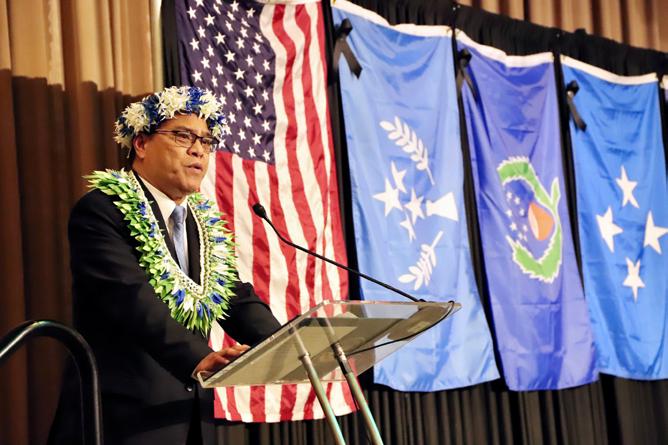
In closing, President Simina reiterated his administration’s commitment to making citizen outreach a regular practice.
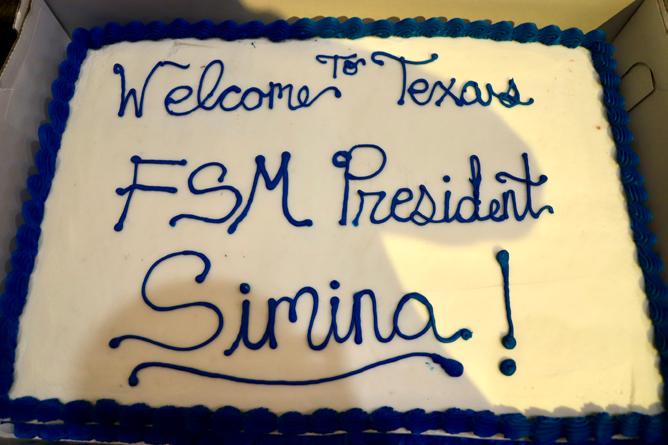

During the outreach, President Simina also highlighted his administration’s efforts to advocate for FSM citizens on the global stage, including his recent engagement with U.S. President Joe Biden and his participation in the Compact of Free Association discussions. “In New York, I met with U.S. President Biden to reaffirm the strong relations between FSM and the United States, with your citizens living in the U.S. in mind,” President Simina shared. He praised the work of the Hawaii Congressional delegation, particularly Senators Brian Schatz and Mazie Hirono, as well as Representatives Ed Case and Jill Tokuda, for their support in securing important benefits under the Compact.
“When I assumed office a year ago, I made it a point to my staff that citizens living abroad are a priority of my administration. I want a government that is responsive to the needs of its people, both at home and abroad,” he said, pledging continued engagement in the months and years ahead.
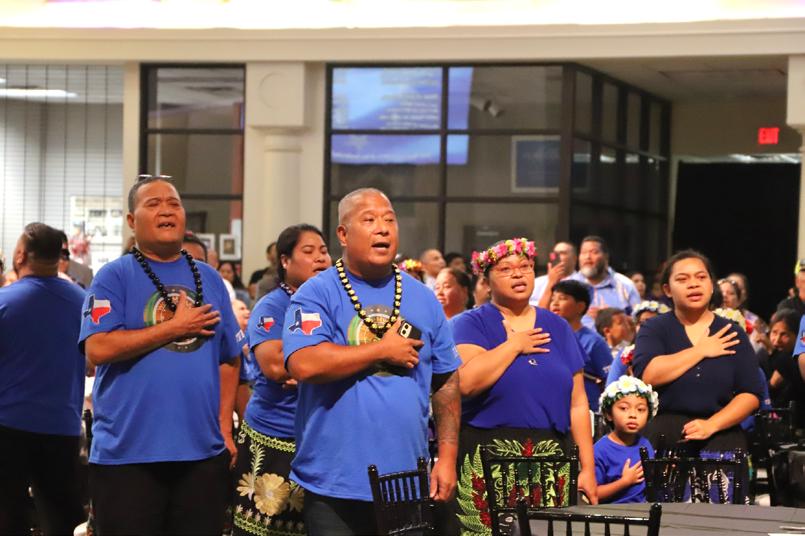
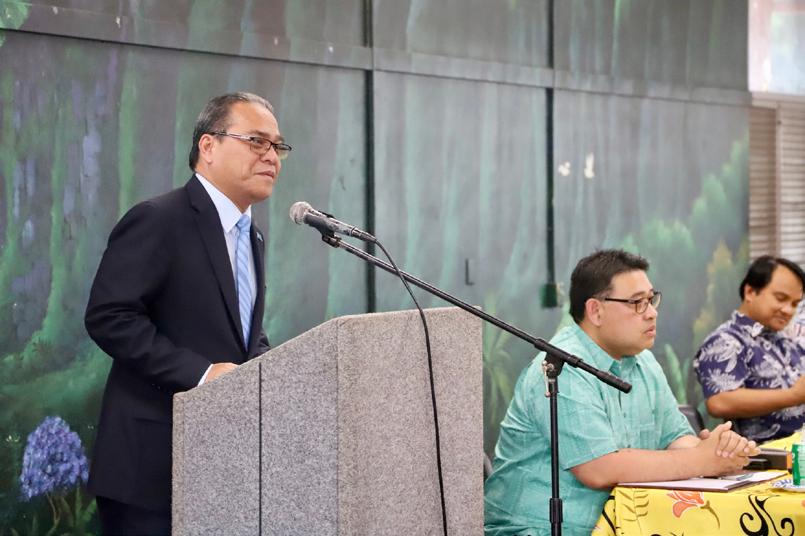
The President’s delegation included Madame Ancelly Simina, First Lady of the FSM; T.H. Ricky Cantero, Deputy Secretary of the Dept. of Foreign Affairs; H.E. Jackson Soram, FSM Ambassador to the United States; T.H. Leonito Bacalando Jr., Secretary of the Dept. of Justice; Chief Adviser on Compact Matters Mr. Leo Falcam Jr.; Assistant Secretary Kehlen Halbert; Special Assistant to the President on State Affairs and Chairman of the Board for the FSM Social Security Administration Mr. Jack Harris . The
outreach events concluded with a Q&A session where President Simina and his delegation addressed further inquiries from citizens. These sessions underscore the administration’s dedication to transparent communication and responsive governance for FSM citizens, regardless of where they reside.

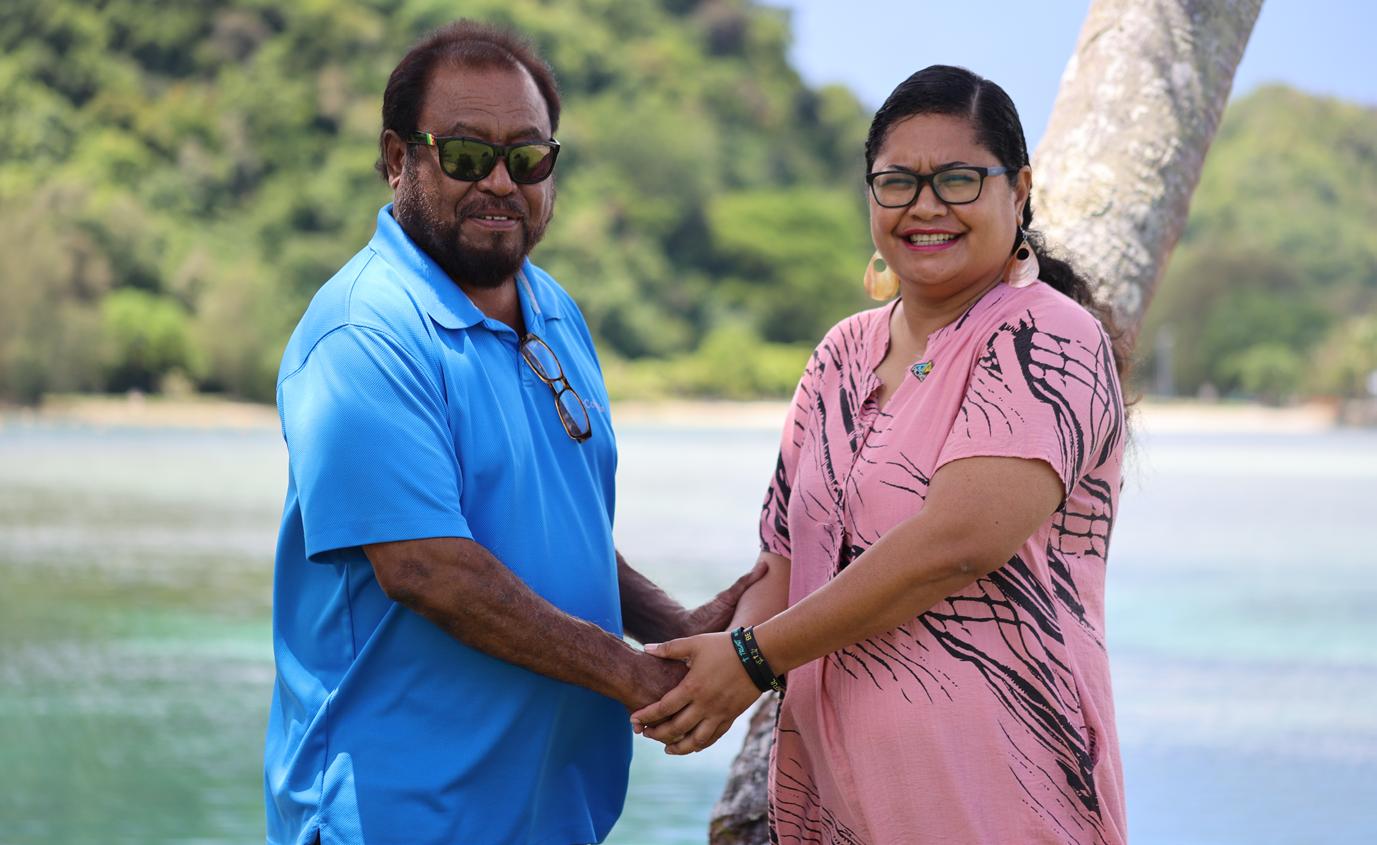
October 4, 2024
The Palau International Coral Reef Center (PICRC) has signed a $20,000 grant agreement with The Nature Conservancy (TNC) to support PICRC’s ongoing coral reef monitoring efforts. This partnership is part of the Micronesia Coral Reefs Program, implemented by TNC’s Micronesia and Polynesia Program and supported by the Global Fund for Coral Reefs. The program is focused on the Republic of the Marshall Islands, the Federated States of Micronesia, and the Republic of Palau.
The program’s main goal is to conserve and restore coral reef ecosystems across Micronesia. Its efforts focus on protecting coral reef areas, restoring degraded reefs, and working with communities to develop solutions that align conservation with sustainable development.
With this grant, PICRC will continue its vital work monitoring coral reefs at 31 sites throughout Palau. This monitoring involves measuring coral coverage, water
temperature, and the populations of fish and invertebrates. Over the course of the project, PICRC will track changes in reef conditions over time. PICRC plans to complete its monitoring activities by June 2025, with data processed and shared for further analysis in collaboration with partners, including the University of Guam and TNC. These efforts will not only support coral reef management in Palau but also contribute to regional efforts to protect coral ecosystems across Micronesia.
The grant underscores the ongoing commitment of PICRC and TNC to protect Palau’s precious coral reefs and ensure their long-term health. “We’re excited to continue our partnership with TNC through this grant, which will help us protect and sustain Palau’s coral reefs for the future,” said PICRC’s Interim CEO, Caryn Lkong Koshiba. “The health of our reefs is vital to our environment, our economy, and our way of life. By working together, we can ensure that these ecosystems remain resilient and thriving for generations to come.”
By Lt. j.g. Winslow Blow
September 26, 2024
Kosrae--A team representing Australia and the United States concluded the fifth and final mission stop of Pacific Partnership 2024-2 (PP24-2) in Kosrae, Sept. 23.
The nine-day Kosrae mission stop brought more than 40 participants from Australia and the United States together to increase humanitarian assistance and disaster relief (HA/DR) preparedness in the Indo-Pacific.
“The Pacific Partnership team is honored to have returned to Kosrae for the first time since 2011 to conduct the largest annual U.S. Navy multinational humanitarian assistance and disaster relief preparedness mission in the Indo-Pacific.”
said U.S. Navy Rear Adm. Brent DeVore, commander, Joint Region Marianas and commander, U.S. Naval Forces Marianas.
“We cherish the longstanding, close relationship between Australia, the U.S. and the Federated States of Micronesia so it’s wonderful to be here to see firsthand how our friendship continues to grow.”
During the mission stop, the team held 21 medical events including optometry exams and handing out more than 550 pairs of eyeglasses; installing dental chairs; three community health events, training 110 community members in basic lifesaving skills; and conducted subject matter expert exchanges in a wide variety of disciplines.
“Pacific Partnership has given thought to the well-being of our friends and our neighbors, and to the idea that when we work together, we benefit and we all grow stronger,” said Hon. Jennifer Johnson, U.S. Ambassador to the Federated States of Micronesia. “On behalf of the American people, I say thank you. What you’ve done here is highly impactful for our dear
friends, the people of Kosrae.”
At the invitation of the host nation, the U.S. Coast Guard held boating safety workshops to share expertise and best practices for at-sea activities in Kosrae communities.
The host nation outreach team organized 19 community engagements consisting of school visits, U.S. Navy recruiting events, an interfaith dialogue session, and concerts with the Pacific Partnership Band, composed of musicians from the U.S. Pacific Fleet Band and the Royal Australian Army Band.
Engineering efforts included subject matter expert exchanges in coastal erosion and water purification, including site surveys to examine potential improvements on the drinking water infrastructure in Kosrae. The team also assembled a playground at a local elementary school.
“Pacific Partnership 2024-2 in Kosrae has surpassed all expectations in terms of impactful outcomes for my people,” said Kosrae Gov. Tulensa Palik. “So, on behalf of the people of Kosrae, I say to you, thank you for a job well done.”
Now in its 20th iteration, the Pacific Partnership series is the U.S. Navy’s largest annual multinational HA/DR preparedness mission conducted in the Indo-Pacific. Pacific Partnership works collaboratively with host and partner nations to enhance regional interoperability and disaster response capabilities, increase security and stability in the region, and foster new and enduring friendships in the IndoPacific.
For more information about Pacific Partnership visit, www.clwp.navy.mil/ Pacific-Partnership.
FSM Information Services
September 24, 2024
Washington D.C.—The Joint Economic Management Committee (JEMCO) of the Compact of Free Association as Amended has concurred with the FSM’s FY 2025 Annual Implementation Plan (AIP), paving the way for funding the Compact sector grant portions of FSM’s FY 2025 budget currently being
considered by the FSM Congress, and soon to be considered by the FSM State Legislatures.
Members of JEMCO from the United States and the Federated States of Micronesia met on September 4 in Honolulu for their first in-person meeting since the adoption of the 2023 amendments to the Compact and Fiscal Procedures Agreement. At that
meeting, the United States Members considered the FSM’s proposed FY 2025 AIP but indicated that they would require some additional time to review the proposal. They agreed to hold a subsequent virtual meeting to consider concurrence with the plan in time for the 5th Regular Session of the 23rd FSM Congress, and FSM State Legislatures to formally approve the FY 2025 budget.
On September 20, 2024, JEMCO voted to concur with the proposed AIP with a minor adjustment to account for limitations on the use of sector grants for international travel that are still under review. This means that sector grant awards will now be made totaling over $139 million for the use of the FSM in its FY 2025 annual budget and this amount can be reflected in the FSM’s FY 2025 budget.

by 1st Lt. John Carter 1st Marine Logistics Group
September 23, 2024
Camp Pendleton, California—The U.S. Marines and Sailors of Combat Logistics Battalion 13, Combat Logistics Regiment 17, 1st Marine Logistics Group have concluded exercise Koa Moana 24. The exercise, which took place in strategically important locations across Oceania, concluded on Sept. 18, 2024. The opportunities, activities, and investments Koa Moana executed emphasized the strengthening of partnerships and the enhancement of regional security. Deployments like this exemplify the Marine Corps’ forward presence and commitment to cooperative engagement in the IndoPacific.
Koa Moana 24 involved extensive community interaction and collaboration in the Republic of Palau and the Federated States of Micronesia. As the Compact of Free Association nations, both countries maintain the U.S. as their military. The exercise’s duration and annual occurrence underscore this relationship, aiming to bolster operational capabilities while fostering mutual bonds between the U.S. military and local communities.
“Koa Moana 24 has been a testament to the United States’ unwavering commitment to our partners Palau and the FSM,” said Lt. Col. Brian McCarthy, commanding officer of CLB-13 and Koa Moana 24. “Setting conditions in the theater that matters, for when it matters is what an exercise like Koa Moana 24 does. We had to be present and engaged in meaningful ways with the local communities. As Palauan President Whipps said, presence is deterrence, and our Marines and Sailors epitomize that.”
Throughout exercise Koa Moana 24, Marines and Sailors undertook a range of engineering projects, including the renovation of schools, facilities, and historical memorials. Their efforts extended to community engagement activities such as sporting events, school interactions, and cultural immersion, and explosive ordnance disposal. They also facilitated key leader engagements and conducted knowledge exchanges with subject matter experts from both the U.S. and the partner nations.
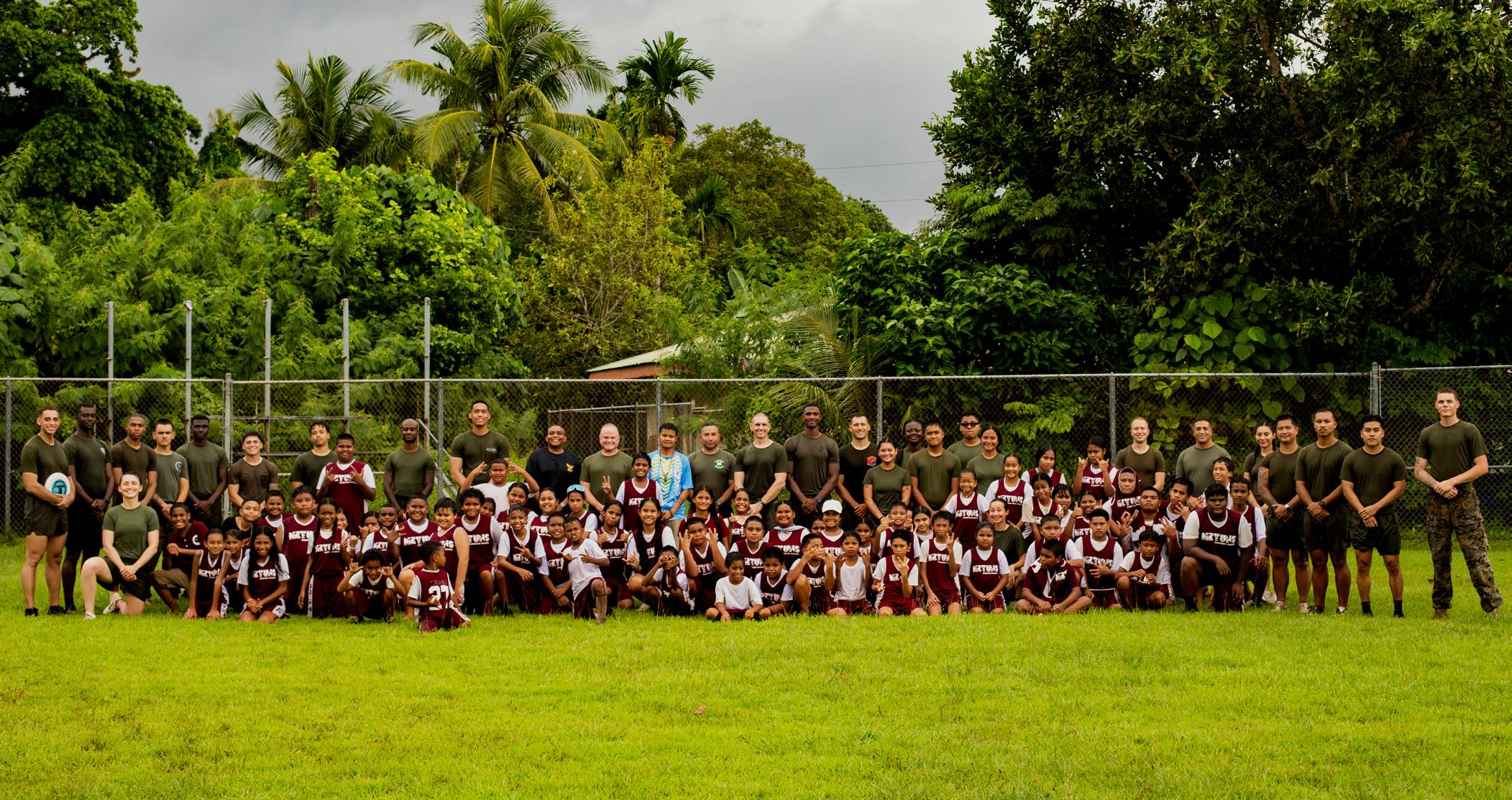
In addition to CLB-13, Koa Moana 24 employed several supporting episodic engagements. Expeditionary Fire and Rescue Marines from Marine Wing Support Squadron 373, 3rd Marine Air Wing, provided external support by training local Aircraft Rescue Firefighting teams in Palau and across the FSM. Marine Corps recruiters from Recruiting Station San Diego also spent a week in Palau conducting recruiting activities, identifying numerous potential prospects. An engineering detachment deployed to Papua New Guinea collaborating with the U.S. Army and Papua New Guinea Defense Force for the construction of the local billeting facilities.
“Until one comes face to face with the diversity in our ranks, it’s easy for many locals to have preconceived notion of the U.S. and its Marine Corps,” noted Sgt. Maj. Jorge Delgadillo, sergeant major of CLB-13 and Koa Moana 24.
“Our deliberate diversity in military occupational specialties enabled Koa Moana 24 to execute a wide range of engagements.”
A couple examples of projects in the FSM indicative of Koa Moana 24’s efforts. One in Yap, where Marines extended a school’s internet network across three buildings to enhance connectivity and ensure students could use their devices; a feat the school had sought to achieve for several years. Another in Chuuk, where Marines
distributed preparatory disaster relief supplies by delivering more than 5,000 bags of rice and 6,000 cases of water to islands within the state’s lagoon.
“Conducting sustained security cooperation operations for more than 90 days across 1,700 miles of the western pacific, with small formations presented unique challenges and opportunities,” said Maj. Morgan Celaya, executive officer and operations officer of CLB13 and Koa Moana 24. “Koa Moana’s distributed force laydown allowed us to amplify our effects with approximately 160 Marines and Sailors. We trained and trusted our small unit leadership, which in turn gained the trust of these partner nations. Having done Koa Moana 22, this exercise continues to evolve as is the region and its requirements. It’s important to sustain this momentum in the critical years ahead.”
The Marine Corps demonstrated its best during the Battle of Peleliu 80th anniversary commemoration and opening of a refurbished Peleliu Civic Center as the interim World War II Museum, the culminating events of Koa Moana 24 on Sept. 15, 2024. Marines and Sailors from CLB13 supported Marine Corps Forces, Pacific in organizing and executing the ceremony, which celebrated the 80-year partnership between the U.S. and Palau. The event's importance was highlighted by the presence of Maj. Gen. Daniel Shipley, deputy commander of MARFORPAC, who
traveled to Palau to join the Marines and engage with senior officials from Palau and Japan, as well as the U.S. Ambassador to Palau and other local dignitaries.
As Koa Moana 24 draws to a close, it is evident that the exercise has laid the groundwork for future engagements. Aligned with the new 1st MLG Campaign Order “Ready… Set…,” Koa Moana underscores the campaign's emphasis on readiness and resilience while fostering partnerships across the Indo-Pacific Region.
“The ‘Ready… Set…’ campaign encompasses our preparedness in every aspect, from combat to community engagement,” noted McCarthy. “Koa Moana reinforces that mindset, and as we conclude this exercise, we do so with the assurance that our partners value our support and look forward to our return.”
Koa Moana 24 has demonstrated that the Marines are prepared for combat operations while remaining dedicated partners and friends to the people of Palau and the FSM. The relationships forged during this exercise are expected to have a lasting impact on the region. The U.S. Marine Corps remains committed to the security and prosperity of the Indo-Pacific, with Koa Moana serving as a significant example of ongoing engagement.

by Cmdr. Brenda Way Commander, Logistics Group Western Pacific
October 1, 2024
Pacific Ocean--The 20th iteration of Pacific Partnership, the U.S. Navy’s largest maritime humanitarian and civic assistance mission conducted in the Indo-Pacific, concluded Sept. 23, 2024. The Pacific Partnership 2024-2 (PP242) mission team worked alongside allies and partners to strengthen relationships and bolster host nation capacity to provide essential humanitarian services. The group also supported efforts to reduce the risk of, prepare for, and respond to humanitarian disasters.
Led by PP24-2 Mission Commander U.S. Navy Capt. Daniel J. Keeler, and embarked aboard Spearhead-class Expeditionary Fast Transport ship USNS City of Bismarck (T-EPF 9), the team made stops in the Federated States of Micronesia, the Philippines, Vanuatu, and Vietnam.
“It’s crucial to collaborate in advance to build relationships within the region before a disaster occurs. Each country offers a diverse range of skills and resources that can be invaluable in times of need,” said Keeler. “By engaging in this proactive planning and training, we foster deeper understanding and strengthen cooperation. This foundation not only facilitates a smoother response in a crisis but also enhances our resilience as we navigate future challenges together.”
Over two-and-a-half months, nearly 1,500 military and civilian personnel from Australia, Canada, Chile, Federated States of Micronesia, Fiji, France, Great Britain, Japan, Malaysia, New Zealand, the Philippines, Republic of Korea, Singapore, Tonga, Vanuatu, Vietnam, and the U.S. supported the PP24-2 mission. The multinational and whole-of-government approach used to plan and execute operations with partner nation militaries, hostnation civilian agencies, international organizations, non-governmental organizations (NGO), the U.S. State Department, U.S. interagency, and U.S. military services fosters multilateral cooperation.
Pacific Partnership focuses on multiple lines of effort in medical and public health, engineering, and host nation outreach to help build resilience and host-nation capacity to support essential humanitarian services. Individual projects are tailored to the specific needs and requests of each host nation.
“We partner together; we learn from each other; we identify what are better practices; and we prepare to be able to help people,” said Royal Australian Air Force Wing Cmdr. Scott Minchin, PP24-2 deputy mission commander. “We join the military effectively to help people, and Pacific Partnership is where that lives and breathes in the person-to-person connections made at every mission stop. We are working together very effectively in one of the greatest opportunities I have had.”
Each multinational team partnered with their host nation counterparts to conduct live search and rescue field training exercises, subject matter expert exchanges, cooperative health engagements, community veterinary outreach and civilian-military workshops on disaster response. The collaborative efforts aimed to improve collective capacity and multilateral cooperation to respond to a disaster and enhance regional partnerships at all levels.
The medical team completed 1,116 eye exams and handed out 1,035 pairs of glasses; conducted 164 dental exams with 76 extractions and 35 oral surgeries; carried out 55 side-byside subject matter expert exchanges in various medical fields such as ophthalmology, physical therapy, nursing, general surgery, radiology, and oral surgery; and trained nearly 400 nursing professionals and students. The veterinary team from the New Zealand and U.S. armies did more than252 spay and neuter surgeries and two days of side-by-side subject matter expert exchanges.
Engineering efforts included renovations at three elementary schools and two medical facilities; repairs and maintenance to equipment at Yap International Airport; subject matter expert exchanges in coastal erosion and water purification, including site surveys; and the assembly of a playground at an elementary school.
The host nation outreach team held 97 events, including school engagements, interfaith dialogues, gender peace and security workshops, moral injury training, and bandmaster classes. The Pacific Partnership band featured a rock band and an island vibes band composed of members of the U.S. Navy and the Australian Army. They performed 31concerts during the mission.
Humanitarian Assistance and Disaster Relief (HA/DR) teams from the U.S. Navy, U.S. Coast Guard and U.S. Army Civil Affairs held workshops to bolster host-nation capacity to provide essential humanitarian services and support efforts to reduce the risk of, prepare for, and respond to humanitarian disasters. The effort focused on the activation, staffing, organization, deactivation, and demobilization of an emergency operations center and an introduction of the incident command system to local government and NGO agency peers. They also held six boating safety workshops.
The mission was also joined in Vietnam by U.S. Pacific Air Forces personnel during their tandem Pacific Angel mission. The U.S. Air Force team completed 10 days of concurrent engineering, medical events and subject matter expert exchanges.
For more information about Pacific Partnership visit, www.clwp.navy.mil/ Pacific-Partnership
October 1, 2024
KOROR – The U.S. Department of the Interior’s Assistant Secretary for Insular and International Affairs Carmen G. Cantor today announced $80,400,000 in grant awards to the Republic of Palau for Fiscal Year (FY) 2025 as provided for under the Compact of Free Association (Compact) Section 432 Review, Public Law 118-42. Assistant Secretary Cantor announced the award of funds while she was in Koror to join in the celebration of Palau’s 30th anniversary of independence.
“The United States Government
congratulates Palau on the 30th anniversary of its independence and is honored to award these funds under the new 20-year Compact Review Agreement between our two countries,” said Carmen G. Cantor, Assistant Secretary for Insular and International Affairs. “We are proud of the strong relationship that we share with Palau.”
Today’s funding announcement includes $50 million for the United States’ second and final contribution to the Palau Compact Trust Fund as provided for under the Compact Section 432 Review signed in 2023. Economic assistance grants to support and strengthen the Republic of Palau’s
health and education systems total $20,400,000 and, lastly, the amount of $10,000,000 represents the second of six annual payments from the United States to support the reduction of Palau’s public debt.
As negotiated between the United States and the Republic of Palau Governments in 2023, the Compact Section 432 Review extended annual funding assistance for the Republic of Palau from FY 2024 to the end of FY 2043. More information about Compact and other funding provided to the Insular Areas may be found in the OIA Budget.
The Assistant Secretary for Insular and International Affairs and the Office of Insular Affairs (OIA) carry out the Secretary of the Interior’s responsibilities for the U.S. territories of American Samoa, Guam, the Commonwealth of the Northern Mariana Islands, and the U.S. Virgin Islands. Additionally, OIA administers and oversees federal assistance under the Compacts of Free Association to the Federated States of Micronesia, the Republic of the Marshall Islands, and the Republic of Palau. OIA also administers a discretionary Technical Assistance Program for all the Insular Areas.

by Chief Warrant Officer Sara Muir U.S. Coast Guard Forces Micronesia / Sector Guam
September 30, 2024
PELELIU, Republic of Palau— The Republic of Palau and the United States reaffirmed their longstanding partnership and shared history at the Joint Committee Meeting (JCM) held from September 13 to 18, 2024, in Peleliu, with participation from U.S. Coast Guard Forces Micronesia/Sector Guam.
The meeting followed the 80th Anniversary Commemoration of the Battle of Peleliu, a pivotal World War II event symbolizing the enduring bonds of friendship and cooperation between the two nations. It highlighted the commitment of the U.S. Coast Guard to regional security and support for Palau's maritime initiatives.
Distinguished delegates from both nations, including Palauan President Surangel Whipps Jr., U.S. Ambassador to Palau Joel Ehrendreich, Rear Adm. Gregory Huffman, commander of Joint Task Force-Micronesia, and Capt. Robert Kistner, Forces Micronesia Sector Guam commander, representing the U.S. Coast Guard, gathered to discuss ongoing initiatives and future collaboration to enhance regional security, economic development, and community resilience. The JCM, a keystone of the Compact of Free Association, provides a platform to address mutual priorities and challenges.
In his opening remarks, President Whipps emphasized the strength of the Palau-U.S. partnership, reflecting on the past year's successes, including signing the Enhanced Bilateral Agreement and the collaborative response to Palau's first cybersecurity attack. He highlighted the critical role of U.S. military presence in the region.
U.S. representatives echoed this sentiment, with Capt. Robert Kistner underscoring the U.S. Coast Guard's dedication and action to supporting Palau's maritime security and further development. "Our partnership with Palau is built on trust, shared values, and a common vision for a secure and prosperous Blue Pacific region. We are taking tangible actions, such as joint patrols, that strengthen our cooperation and address emerging challenges," said Kistner.
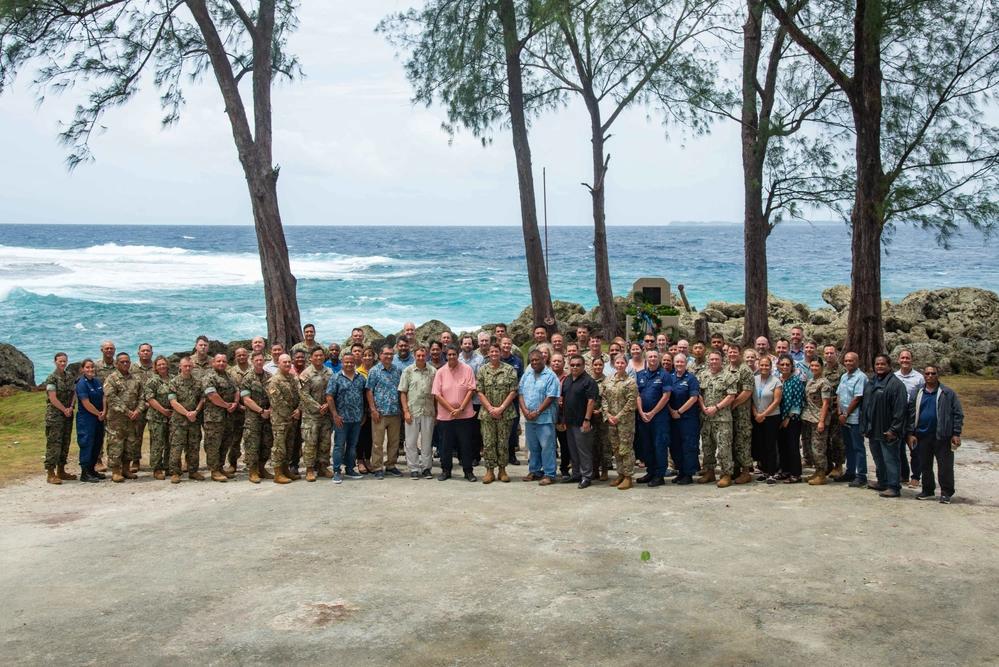
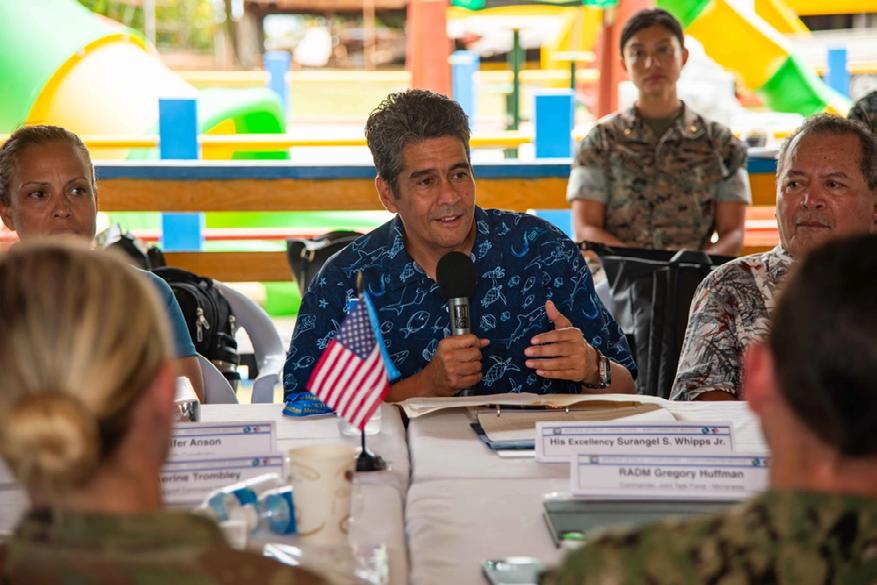
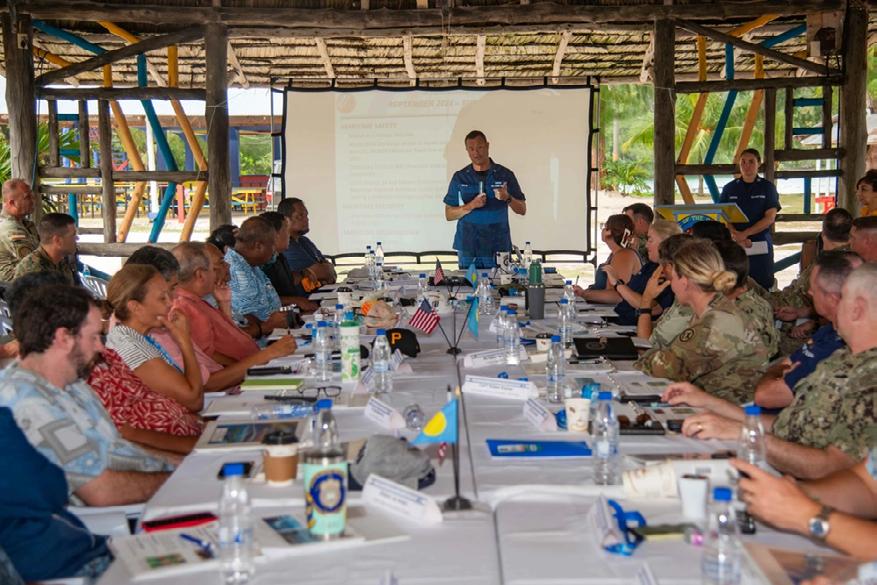
The JCM also focused on future support to Palau, particularly in combating illegal, unreported, and unregulated fishing (IUU-F). The U.S. Coast Guard, in coordination with the Republic of Palau, conducted surge operations in early September to combat illegal fishing and enhance maritime domain awareness. Maritime partners discussed future joint patrol opportunities with the Division of Marine Law Enforcement crews, building on the existing success from joint bilateral operations and Operation Irensia to continue safeguarding Palau's resources and sovereignty.
The meeting began with a special commemoration of the Battle of Peleliu. U.S. and Palauan leaders honored the sacrifices made 80 years ago and celebrated decades of peace and partnership in the Pacific. "The legacy of Peleliu is a reminder of our resilience and unity. It's a testament to what we can achieve together in the face of adversity," said Capt. Kistner.
The two-day JCM concluded with a call to action from both sides, emphasizing the need to turn discussions into concrete actions. U.S. Ambassador to Palau Joel Ehrendreich noted that Palau has many of the tools it needs and will focus with partners on taking action and delivering results for shared security and prosperity.
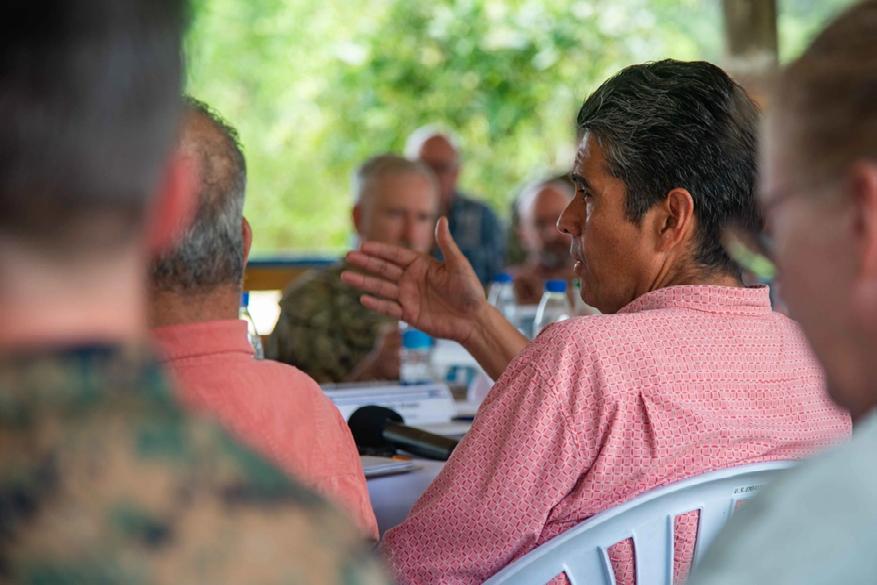

Pohnpei Department of Health and Social Services
October 2, 2024
Pohnpei—We would like to inform the community that a possible case of dengue fever has been reported in Pohnpei. It is important to note that this patient has no travel history.
We urge everyone to take necessary precautions to prevent the spread of the virus, including eliminating standing water and using mosquito repellent. If you experience symptoms such as high fever, severe headaches, or joint pain, please seek medical attention immediately.
Thank you for your attention and cooperation in keeping our community safe.

in more than a decade recognizes the need to pass the baton to our youth - the leaders of tomorrow
September 26, 2024
Suva, Fiji— Pacific Ministers for Youth, who met for the first time in more than a decade, have issued a strong call to all Pacific nations to allocate dedicated funding and resources for youth development initiatives while ensuring youth voices remain central as decision-makers in all regional and global dialogues.
This commitment was made during the 4th Pacific Ministers for Youth Meeting (PMYM) in Nadi from 4 to 5 September, hosted by the Government of Fiji in partnership with the Pacific Youth Council (PYC) as co-chair and the Pacific Community (SPC) as Secretariat.
Under the theme “Balata Vou Tale Na Lawa – Cast the Net Anew,” the meeting gathered representatives from 21 Pacific Island countries and territories, including represented by 10 Honourable Ministers of Youth, and a Special Presidential Envoy to Youth, Women and Children, senior officials from national youth machineries, and national youth representatives, to address key challenges and opportunities for youth in the Pacific region.
Key outcomes include:
Ministers approved the development of a new 10-year Pacific Youth Development Pathway that will be co-developed by Pacific countries and youth and coordinated by the Pacific Community (SPC) over the next 18 months. This will act as a youth development roadmap and align with the Leaders’ vision through the 2050 Strategy for the Blue Pacific.
Recognition of the growing complexity of youth challenges, including, the existential threat of climate change, unemployment, and mental health, with emphasis on meaningful inclusion of youth in decision-making mechanisms with specific reference to the inclusion of youth in global forums such as the International Court of Justice Advisory Opinion on the Obligation of States in Respect of Climate Change (ICJ).
Commitment to equitable and inclusive youth development initiatives, particularly considering gender, persons with disability, and youth in all their diversities.
Support creating a governance mechanism to oversee the implementation of the next youth framework, ensuring coordinated efforts between governments, development partners, and youth councils and inclusion of youth representatives, government representatives and sub-regional representatives at all levels throughout the process. This will also include presenting the outcomes of the Ministerial to the 54th Pacific Island Forum Leaders Meeting and ensuring the work aligns with the 2050 Strategy for the Blue Pacific and the ongoing Regional Architecture Review.
The Ministers also endorsed SPC and the PYC as co-custodians of the next Pacific Youth Development Framework (PYDF). This framework will lead the charge in the future of youth development across key priority areas, including Employment, Education and Economic Pathways; Health and Wellbeing; Climate Change, Disaster Risk Reduction & Biodiversity; Pacific Identities & Heritage; Human Rights, Peace and Security; Integrated Connectivity, Information and Privacy; and Leadership and Governance.
The meeting concluded with the Ministers also recognising the need for
improvements to be made in formal and informal education and training to assist youth in accessing pathways to livelihood security.
The final outcomes document from this meeting was endorsed by the following countries: American Samoa, Australia, Cook Islands, Federated States of Micronesia, Fiji, French Polynesia, Guam, Kiribati, Nauru, New Caledonia, New Zealand, Niue, Papua New Guinea, Republic of the Marshall Islands, Samoa, Solomon Islands, Tonga, Tuvalu, Vanuatu.
Read the full outcome statement here: https://purl.org/spc/digilib/doc/gzdvt For more information visit: https:// www.spc.int/2024/regional-youthconvenings
The Pacific Ministers for Youth Meeting was supported by the United States Agency for International Development (USAID) through the PROJECT Governance programme and by the Australian Government through the Pacific Women Lead Pacific Girl Project; and through partnerships with the New Zealand Government, Swedish International Development Cooperation Agency (SIDA), Commonwealth Secretariat (COMSEC), the United Nations Population Fund (UNFPA) and the United Nations Children’s Fund (UNICEF).
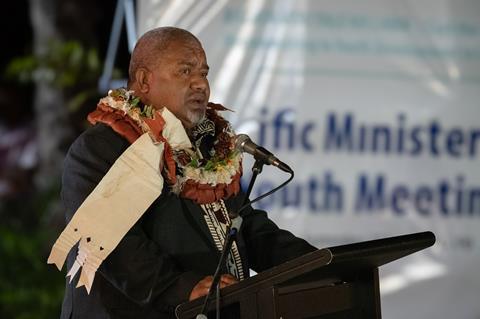

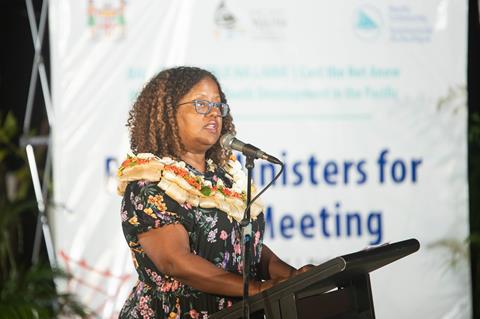
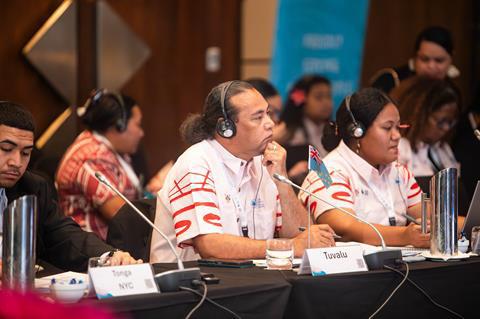
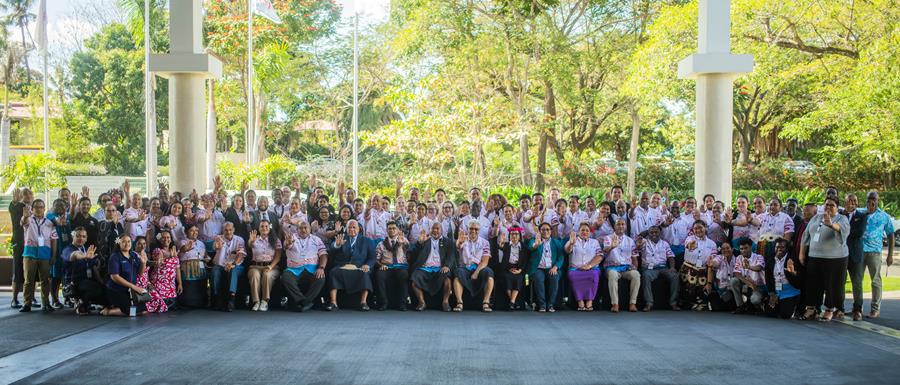

By Dr. Kemo
Kava, known locally in Pohnpei and in Microneisa as Sakau is derived from the plant Piper methysticum. Kava has been a central part of Pacific Island life for centuries. Traditionally consumed as a ceremonial and medicinal drink, kava holds deep cultural importance in the Pacific. Over the years, the kava plant has gained international recognition for its potential therapeutic benefits, particularly in treating anxiety. With growing global interest, Pacific nations have increasingly focused on the commercial potential of kava, both as a cultural export and a valuable commodity. This summary delves into the latest research and developments surrounding kava from the Pacific, emphasizing its economic growth, cultural preservation, and entry into health and medicinal markets.
Cultural and Ceremonial Importance of Kava Kava plays a central role in Pacific Island ceremonies and social gatherings, acting as a symbol of unity, relaxation, and tradition. In countries such as Fiji, Tonga, and Vanuatu, kava is consumed during important events such as welcoming ceremonies, conflict resolution, and celebrations. This is also similar in Pohnpei.
Known for its calming effects, kava is prepared by grinding its root and mixing it with water, creating a drink that induces a state of relaxation without impairing mental clarity. But in Pohnpei Kava is prepared raw or fresh through cleaning of the roots, then it is pounded on a stone and later squeezed by a hibiscus bark. This unique preparation is only practiced in Pohnpei.
The cultural significance of kava cannot be understated, as it remains an essential part of social and ceremonial life in many Pacific nations (Secretariat of the Pacific Community) (International Trade Centre).
As kava has become more popular globally, many Pacific Island leaders are keen to ensure that its cultural value is protected. This includes efforts to promote responsible consumption ractices and preserve traditional preparation methods. Pacific communities have a growing concern about the commercialization of kava and the need to maintain its authenticity. Safeguarding kava’s cultural roots is essential, especially as it gains popularity outside of the Pacific (Islands Business) (Secretariat of the Pacific Community). This is especially true in Pohnpei and Kosrae States since there are only two varieties that exist in the FSM (rah mwanger, rah medel).
Economic Growth and Export Potential
In recent years, kava has experienced rapid growth as a commercial export, driven by increased demand from global markets. Pacific countries, particularly Fiji, Tonga, and Vanuatu, have become leading exporters of kava. For instance, Fiji’s kava exports reached
$41.9 million in 2021, making it one of the country's most valuable agricultural exports (Secretariat of the Pacific Community). The opening of Australian and U.S. markets to kava imports has further expanded the industry's growth potential. In Fiji, the number of registered kava exporters surged from 114 in 2022 to 375 in 2023 due to new market opportunities (Secretariat of the Pacific Community) (Tonga Independent).
Tonga remains the top kava exporter to Australia, underscoring its dominance in the regional kava market. The implementation of the Kava Pilot program in Australia has relaxed previous restrictions on kava imports, allowing for greater access to the product. This program recognizes kava’s cultural and economic importance to Pacific Island communities and aims to strengthen trade ties between Australia and the Pacific nations (Tonga Independent).
In the FSM, Kava production, consumption, imports, exports and contribution to the overall economy fluctuates yearly and in some instances insufficient and under reported. However, in 2021 it is reported that exports of kava were estimated at 36 tons worth $484,823.00. Additionally, the volume and dollar figure for local Kava consumption and its economic value to the overall economy is unavailable despite being the number one agriculture export commodity in the country. There is also a lack of support provided to local farmers and suppliers in the Sakau value product chain. But more importantly, there are no existing legislative measures at the National or State Government levels to protect and safeguard Sakau as an Intangible Cultural Heritage (ICH) and commercial commodity, despite it’s cultural significance and economic potential.
In Vanuatu, kava is being positioned as a “green gold,” with efforts to promote its use beyond traditional markets. Vanuatu’s kava sector has been expanding, focusing on niche markets such as pharmaceuticals and medicinal products. This transition marks a shift from traditional uses of kava to its incorporation into modern health and wellness products (International Trade Centre).
The increasing global demand for kava is seen as an opportunity to further develop the sector, provided that appropriate safety and quality standards are maintained.
Kava, Health and NCD
Kava, a plant-based remedy derived from the Piper methysticum shrub native to the Pacific, has been traditionally used for its calming properties. Its active compounds, known as kavalactones, act on GABA receptors in the brain, which reduce anxiety and promote relaxation. This makes kava particularly popular as a natural alternative to pharmaceutical anxiolytics, such as benzodiazepines, and is widely used in Western
countries for treating anxiety, stress, and insomnia (International Kava Organization) (KavaNectar).
Several studies have shown that kava is effective in reducing symptoms of generalized anxiety disorder (GAD). Placebo-controlled trials demonstrate a reduction in anxiety comparable to medications like Xanax and Valium (MDPI). Clinical trials in Australia and New Zealand have shown promising results in using kava to treat generalized anxiety disorder (GAD), highlighting its potential as a natural alternative to traditional anxiety medications. However, further research is needed to fully understand the long-term effects of kava consumption and its potential interactions with other medications (BioMed Central).
Research on kava (Piper methysticum) has expanded beyond its traditional uses for anxiety and social relaxation to explore its potential role in addressing non-communicable diseases (NCDs), such as cancer and inflammatory conditions. Recent studies have investigated kava’s pharmacological effects, particularly the anti-inflammatory and anticancer properties of its key compounds, kavalactones.
Several in vitro and in vivo studies have shown promising results regarding kava’s anticancer properties. Kavalactones, particularly flavokavains, have demonstrated the ability to induce apoptosis (programmed cell death) and inhibit the proliferation of cancer cells, including those related to breast, prostate, lung, and bladder cancers. These findings suggest that kava could have a role in the prevention and treatment of certain types of cancers, though more clinical research is needed to establish its efficacy and safety for widespread use in oncology( MDPI) (MDPI).
Additionally, kava’s anti-inflammatory effects have been noted, which are relevant for managing chronic diseases associated with inflammation, such as cardiovascular diseases and diabetes. The plant’s ability to reduce oxidative stress and inflammation at the cellular level suggests its potential as a therapeutic agent in preventing or managing chronic inflammatory conditions, which are major contributors to NCDs (MDPI).
However, kava has potential side effects, including drowsiness, dizziness, and headaches (UCLA Health). More seriously, concerns about liver toxicity have been raised since the early 2000s, with reports of severe liver damage, including hepatitis and cirrhosis, leading to its temporary ban in several countries like Germany and Canada (MDPI) (Mental Health America). Although recent studies indicate that the risk of liver damage may be linked to the preparation methods (water-based versus alcohol-based extracts), the issue of safety remains central to kava’s acceptance in global markets (MDPI) (PLOS).
While the kava industry has witnessed substantial growth, it faces significant challenges, particularly in terms of regulation and standardization.
To address these concerns and ensure Kava’s long-term success, Pacific countries have been working on establishing regulatory frameworks that prioritize product safety. For example, the Pacific Islands Forum Secretariat (PIFS) and the European Union have supported initiatives to develop quality standards for kava exports in the South Pacific countries. These efforts aim to ensure that Pacific kava products meet international safety requirements while preserving traditional cultivation and preparation methods (Islands Business) (SPC). In the FSM, Sakau product standards and safety requirements are still unavailable especially since it is prepared and consumed in liquid form.
One of the key regulatory initiatives under discussion is the implementation of Geographical Indication (GI) certification for Pacific kava. GI certification would protect the unique qualities of kava grown in specific Pacific regions, ensuring that its cultural and geographical origins are recognized globally. This certification is viewed as an important step toward protecting the reputation of Pacific kava in the face of increasing competition from other regions, such as the United States, where new kava cultivars are being developed (Islands Business).
Efforts are also being made to standardize the production of kava for medicinal use. In Vanuatu, researchers are working with local farmers to ensure that kava is grown sustainably and meets international safety standards. This collaboration aims to create a framework that allows Pacific farmers to benefit from the growing global demand for kava while ensuring the product’s safety and efficacy (International Trade Centre). The FSM Permanent Mission in Geneva is in discussions with the ITC to include assistance to the FSM.
Conclusion
Kava is a unique product that straddles the line between cultural heritage and modern commercial success. Its importance to Pacific Island communities cannot be overstated, as it plays a central role in both social life and the economy. As global demand for kava continues to grow, the Pacific region faces the challenge of balancing cultural preservation with health and economic opportunities. By implementing regulatory frameworks, promoting sustainable farming practices, establishing legislations and continuing scientific research, Pacific countries can ensure that kava remains a valuable and respected commodity on the global stage. The future of kava looks bright, with its potential in medicinal markets offering new opportunities for both Pacific farmers and global consumers.